Ikoria: Lair of Behemoths and Commander (2020 Edition) Release Notes
Compiled by Eli Shiffrin, with contributions from Laurie Cheers, Tom Fowler, Carsten Haese, Nathan Long, and Thijs van Ommen.
Document last modified April 6, 2020.
DOC Download Links:
English | 中國話,漢語;中文 | 中国话,汉语;中文 | Français | Deutsch
Italiano | 日本語 | 한글 | Português | русский язык | Español
The Release Notes include information concerning the release of a new Magic: The Gathering set, as well as a collection of clarifications and rulings involving that set's cards. It's intended to make playing with the new cards more fun by clearing up the common misconceptions and confusion inevitably caused by new mechanics and interactions. As future sets are released, updates to the Magic rules may cause some of this information to become outdated. Go to Magic.Wizards.com/Rules to find the most up-to-date rules.
The "General Notes" section includes release information and explains the mechanics and concepts in the set.
The "Card-Specific Notes" sections contains answers to the most important, most common, and most confusing questions players might ask about cards in the set. Items in the "Card-Specific Notes" sections include full card text for your reference. Not all cards in the set are listed.
GENERAL NOTES
Release Information
The Ikoria: Lair of Behemoths set becomes legal for sanctioned Constructed play on its official release date: Friday, April 17, 2020. At that time, the following card sets will be permitted in the Standard format: Guilds of Ravnica, Ravnica Allegiance, War of the Spark, Core Set 2020, Throne of Eldraine, Theros Beyond Death, and Ikoria: Lair of Behemoths.
Cards printed in Ikoria: Lair of Behemoths draft boosters and theme boosters, as well as the Buy-a-Box promo card, will be included in the Standard format.
There are 71 new cards (with printed set code C20 and collector numbers 1–71) printed in the Ikoria: Lair of Behemoths Commander Decks, aka Commander (2020 Edition). These cards are legal for play in the Commander, Vintage, and Legacy formats. They aren't legal for play in the Standard, Pioneer, or Modern formats. The other cards in these decks (with printed set code C20 and collector numbers 72–314) are legal for play in any format that already allows those cards. That is, appearing in these decks doesn't change a card's legality in any format.
Go to Magic.Wizards.com/Formats for a complete list of formats and their permitted card sets and banned lists.
Go to Magic.Wizards.com/Commander for more information on the Commander variant.
Go to Locator.Wizards.com to find an event or store near you.
New Keyword Ability: Mutate
New Game Mechanic: Merged Permanents
As evolution runs haywire across Ikoria, some creatures are finding themselves not simply adapting to the new dangers around them, but merging with them to become bigger, better, and more dangerous than ever before. This is expressed in the game with the new keyword mutate and the new game mechanic of merged permanents.
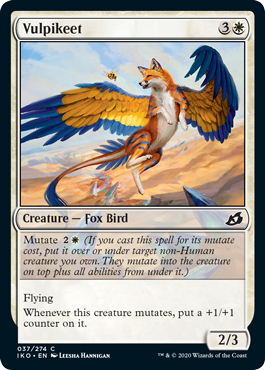
Vulpikeet
{3}{W}
Creature — Fox Bird
2/3
Mutate {2}{W} (If you cast this spell for its mutate cost, put it over or under target non-Human creature you own. They mutate into the creature on top plus all abilities from under it.)
Flying
Whenever this creature mutates, put a +1/+1 counter on it.
Casting and resolving creature spells with mutate
- Mutate represents an alternative cost. To determine the total cost of a spell, start with the mana cost or alternative cost you're paying (such as the alternative cost of mutate), add any cost increases, then apply any cost reductions. The converted mana cost of the spell remains unchanged, no matter what the total cost to cast it was and no matter whether an alternative cost was paid.
- A spell cast with mutate becomes a mutating creature spell. It requires a target creature with the same owner as the mutating creature spell. In the rare case that the player casting the mutating creature spell is not its owner, that player must choose a target creature the spell's owner also owns.
- A mutating creature spell is a creature spell, even if it won't enter the battlefield as a creature.
- As a mutating creature spell begins to resolve, check whether its target is still legal. If it's not, the spell ceases to be a mutating creature spell. It continues to resolve as a normal creature spell and enters the battlefield.
- A mutating creature spell that resolves doesn't enter the battlefield. It simply merges with the target creature. As this happens, the controller of the mutating creature spell chooses whether to put it on top of the target creature or on bottom. Abilities that trigger whenever a creature enters the battlefield don't trigger.
- If the target creature is already a merged creature, the mutating creature spell can be put only on top or bottom. It can't be put in the middle.
Merged permanents
- The resulting merged creature has all of the characteristics of the topmost card or token, and it also has all abilities from its other cards and tokens.
- The merged creature is the same creature it was before the merge, so any Auras or counters that were on it remain on it, it remains tapped if it was tapped, it's still attacking if it was attacking, and so on. If it's been under its controller's control since their most recent turn began, it can attack and {T}.
- The characteristics of the combined merged creature are copiable.
- The merged creature is a token if its topmost object is a token. If its topmost object is a card, it's a nontoken creature, even if it contains a token.
- If the merged creature has any abilities referring to it by name, such as that of Phase Dolphin, it means "this creature," even if mutating causes it to have a new name.
- If a creature that's a copy of another creature mutates, the characteristics it gains from mutating apply after applying the copy effect.
"Whenever this creature mutates" triggered abilities
- An ability that triggers "whenever this creature mutates" triggers when a mutating creature spell becomes part of the merged permanent. It doesn't trigger if a mutating creature spell becomes a normal creature spell and enters the battlefield.
- An ability that triggers "whenever this creature mutates" triggers whether the ability came from the mutating creature spell or from the creature that the mutating creature spell merged with.
- If a creature has multiple "whenever this creature mutates" abilities, its controller chooses the order for those abilities to resolve.
- If an ability triggers when a creature mutates and counts how many times that creature has mutated, it includes the time that caused the ability to trigger.
Leaving the battlefield
- A merged creature can't be split apart until it leaves the battlefield. For example, you can't sacrifice one creature card out of a merged creature if you're instructed to sacrifice a creature; you must sacrifice the entire creature.
- If a merged creature leaves the battlefield, one object leaves the battlefield and each card is put into the appropriate zone. For example, if a merged creature containing three cards dies, one creature died and three cards were put into a player's graveyard.
- If a merged creature is put into a library, its owner chooses the relative order of those cards. For example, if a merged creature containing three cards is put into its owner's library third from the top, those three cards are put third, fourth, and fifth from the top in the order of their owner's choice. This order isn't revealed to other players.
- If an effect exiles a merged creature then returns it to the battlefield, the individual cards each return. They're no longer merged. If that effect has an additional effect on the returned object, it affects each of these permanents.
- If multiple replacement effects could be applied to the merged creature leaving the battlefield or being put into its new zone, applying one of those effects affects all of the moving objects.
- In the Commander variant, if a commander is part of a merged creature, the resulting creature is a commander. If it leaves the battlefield and the commander is moved to the command zone instead, that permanent and the other cards contained by that permanent go to the appropriate zone while the commander card goes to the command zone.
Unusual situations
- If a merged permanent has characteristic-defining abilities, they overwrite the characteristics from the topmost object. For example, if a merged creature has an ability that defines a * in its power or toughness, such as that of Boneyard Mycodrax, that ability overwrites the power and toughness defined by the topmost object of the merged creature.
- If a mutating creature spell merges with a creature that's only temporarily a creature, it will remain a merged permanent when the effect making it a creature expires. It still has all of the characteristics of the topmost object, which may cause it to be a creature or to not be a creature, and it has all of the abilities of its other cards.
- The merged creature is face up if its topmost object is face up. If its topmost object is face down, it's a face-down creature, even if it contains face-up cards.
New Game Mechanic: Keyword Counters
Sometimes creatures gain abilities until end of turn, but on Ikoria, these modifications are often permanent. These changes are marked using the new game mechanic of keyword counters.
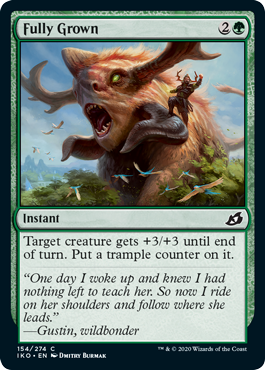
Fully Grown
{2}{G}
Instant
Target creature gets +3/+3 until end of turn. Put a trample counter on it.
- A permanent with a keyword counter on it has that keyword.
- For determining the interaction of continuous effects, the timestamp of a keyword counter on an object is the most recent time that any counter of that kind was put on that object. Removing a keyword counter doesn't change the timestamp of any remaining counters.
- Among the keywords that a keyword counter can grant, multiple instances of any one of these keywords are redundant.
- Some Ikoria packs include a punch-out card with counters that appear in the set. These aren't required for play. As with other counters, players may use any mutually agreeable method to represent the counters.
New Keyword Ability: Companion
Not all of Ikoria's flora and fauna are out to get you. In fact, some will even be your best friend if your deck is interesting enough to get their attention.
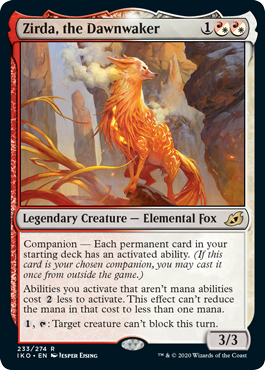
Zirda, the Dawnwaker
{1}{r/w}{r/w}
Legendary Creature — Elemental Fox
3/3
Companion — Each permanent card in your starting deck has an activated ability. (If this card is your chosen companion, you may cast it once from outside the game.)
Abilities you activate that aren't mana abilities cost {2} less to activate. This effect can't reduce the mana in that cost to less than one mana.
{1}, {T}: Target creature can't block this turn.
- Your companion begins the game outside the game. In tournament play, this means your sideboard. In casual play, it's simply a card you own that's not in your starting deck.
- Before shuffling your deck to become your library, you may reveal one card from outside the game to be your companion if your starting deck meets the requirements of the companion ability. You can't reveal more than one. It remains revealed outside the game as the game begins.
- The requirements of the companion ability apply only to your starting deck. They do not apply to your sideboard.
- If more than one player wishes to reveal a companion, the starting player does so first, and players proceed in turn order. Once a player has chosen not to reveal a companion, that player can't change their mind.
- If you reveal a companion outside the game, for as long as it remains there, you may cast it any time it's legal to cast. Once you do, it comes into the game and behaves like any other card you've brought into the game. For example, if it's countered or destroyed, it's put into your graveyard, remaining in the game.
- The companion's other abilities apply only if the creature is on the battlefield. They have no effect while the companion is outside the game.
- The companion ability has no effect if the card is in your starting deck and creates no restriction on putting a card with a companion ability into your starting deck. For example, Zirda may be in your starting deck even if your other permanent cards don't all have activated abilities.
- You may have one companion in the Commander variant. Your deck, including your commander, must meet its companion requirement. Your companion is not one of your one hundred cards.
Returning Keyword Ability: Cycling
This set brings back a popular mechanic that has shown up several times in the past. Cycling returns, giving you the option to trade off a spell's full potential for a card draw—and sometimes a little extra when you cycle it.
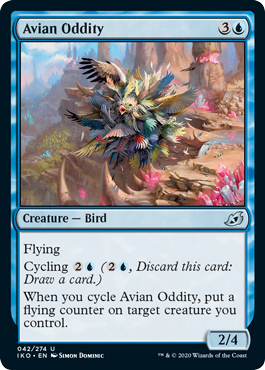
Avian Oddity
{3}{U}
Creature — Bird
2/4
Flying
Cycling {2}{U} ({2}{U}, Discard this card: Draw a card.)
When you cycle Avian Oddity, put a flying counter on target creature you control.
- Some cards with cycling have an ability that triggers when you cycle them, and some cards have an ability that triggers whenever you cycle any card. These triggered abilities resolve before you draw from the cycling ability.
- Triggered abilities from cycling a card and the cycling ability itself aren't spells. Effects that interact with spells (such as that of Cancel) won't affect them.
- You can cycle a card even if it has a triggered ability from cycling that won't have a legal target. This is because the cycling ability and the triggered ability are separate. This also means that if either ability is countered (with Disallow, for example), the other ability will still resolve.
Card Cycle: The Mythos of the Apex Monsters
Among the strange and unusual wildlife on Ikoria, five specimens are awe-inspiring enough to feature their own myths and legends. Each card in the Mythos cycle can be cast with a single color of mana, but the tale is much more epic if you also spend a certain two other colors of mana.
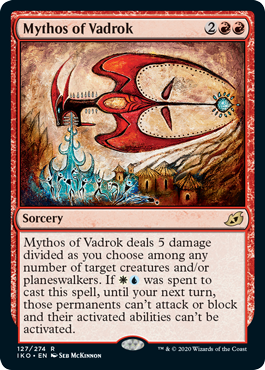
Mythos of Vadrok
{2}{R}{R}
Sorcery
Mythos of Vadrok deals 5 damage divided as you choose among any number of target creatures and/or planeswalkers. If {W}{U} was spent to cast this spell, until your next turn, those permanents can't attack or block and their activated abilities can't be activated.
- The abilities of the Mythos check what colors of mana were spent to cast the spell. It's not an alternative cost to cast the spell.
- If an effect copies the Mythos spell, no mana was spent to cast the copy, so the copy won't receive the bonus.
- The ability checks what mana was actually spent to cast a spell. If an effect allows you to spend mana "as though it were mana" of any color or type, that allows you to spend mana you couldn't otherwise spend, but it doesn't change what mana you spent to cast the spell.
- If an effect allows you to cast a spell without paying its mana cost, you can't choose to cast it and pay unless another rule or effect allows you to cast that spell for a cost. Similarly, you can't waive a cost reduction unless that effect says you may.
Commander Returning Keyword Ability: Partner With
Each of the five Ikoria Commander Decks includes a very special pair of cards: one is a single-color bonder, and the other is its two-color bonded buddy.
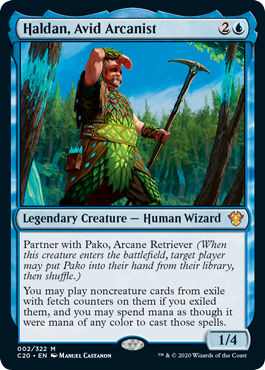
Haldan, Avid Arcanist
{2}{U}
Legendary Creature — Human Wizard
1/4
Partner with Pako, Arcane Retriever (When this creature enters the battlefield, target player may put Pako into their hand from their library, then shuffle.)
You may play noncreature cards from exile with fetch counters on them if you exiled them, and you may spend mana as though it were mana of any color to cast those spells.
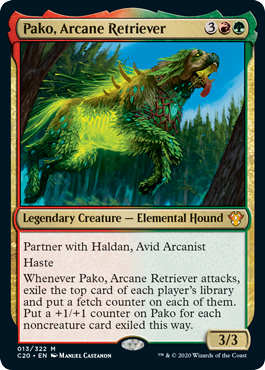
Pako, Arcane Retriever
{3}{R}{G}
Legendary Creature — Elemental Hound
3/3
Partner with Haldan, Avid Arcanist
Haste
Whenever Pako, Arcane Retriever attacks, exile the top card of each player's library and put a fetch counter on each of them. Put a +1/+1 counter on Pako for each noncreature card exiled this way.
- "Partner with [name]" represents two abilities. The first is a triggered ability: "When this permanent enters the battlefield, target player may search their library for a card named [name], reveal it, put it into their hand, then shuffle their library."
- Note that the target player searches their library (which may be affected by effects such as that of Stranglehold) and that the card they find is revealed, even though these words aren't included in the ability's reminder text.
- The second ability represented by the "partner with [name]" keyword modifies the rules for deck construction in the Commander variant and has no function outside of that variant. If a legendary creature card with "partner with [name]" is designated as your commander, the named legendary creature card can also be designated as your commander.
- If your Commander deck has two commanders, you can only include cards whose own color identities are also found in your commanders' combined color identities. If Haldan and Pako are your commanders, your deck may contain cards with blue, red, and/or green in their color identity, but not cards with white or black.
- Both commanders start in the command zone, and the remaining 98 cards of your deck are shuffled to become your library.
- A creature with a "partner with" ability can't partner with any creature other than its designated partner. Losing a partner ability during the game doesn't cause either to cease to be your commander.
- Once the game begins, your two commanders are tracked separately. If you cast one, you won't have to pay an additional {2} the first time you cast the other. A player loses the game after having been dealt 21 damage from one of them, not from both of them combined. Command Beacon's effect puts one into your hand from the command zone, not both.
- The triggered ability of the "partner with" keyword still triggers in a Commander game. If your other commander has somehow ended up in your library, you can find it. You can also target another player who might have that card in their library.
Commander Returning Keyword Action: Goad
Several cards appearing in these decks let you rile up a creature, whipping it into a frenzied attack in some other player's direction.
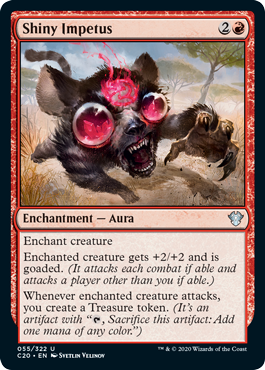
Shiny Impetus
{2}{R}
Enchantment — Aura
Enchant creature
Enchanted creature gets +2/+2 and is goaded. (It attacks each combat if able and attacks a player other than you if able.)
Whenever enchanted creature attacks, you create a Treasure token. (It's an artifact with "{T}, Sacrifice this artifact: Add one mana of any color.")
- If a goaded creature can't attack for any reason (such as being tapped or having come under that player's control that turn), then it doesn't attack. If there's a cost associated with having it attack, its controller isn't forced to pay that cost, so it doesn't have to attack in that case either.
- If a goaded creature doesn't meet any of the above exceptions and can attack, it must attack a player other than a player who goaded it if able. It the creature can't attack any of those players but could otherwise attack, it must attack an opposing planeswalker (controlled by any opponent) or a player who goaded it.
- Attacking with a goaded creature doesn't cause it to stop being goaded.
- Being goaded more than once by the same player is redundant.
- If you goad a creature you control, it must attack and it must attack a player rather than a planeswalker.
- If a creature you control has been goaded by multiple opponents, it must attack one of your opponents who hasn't goaded it. If a creature you control has been goaded by each of your opponents, you choose which opponent it attacks.
Commander Card Cycle: Commander Free Spells
Five cards in the Ikoria Commander Decks represent some of the decks' legendary creatures doing what they like best. If you control a commander, you can cast those spells for free.
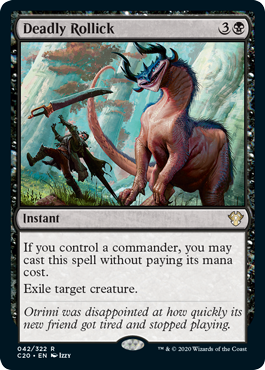
Deadly Rollick
{3}{B}
Instant
If you control a commander, you may cast this spell without paying its mana cost.
Exile target creature.
- Once you begin casting this spell, players can't take any other actions until you're done casting it. Notably, they can't try to remove the commander you control to make you pay its cost.
- It doesn't matter whose commander you control. Any one will do. If you have two commanders, you just need to control one of them.
IKORIA: LAIR OF BEHEMOTHS CARD-SPECIFIC NOTES
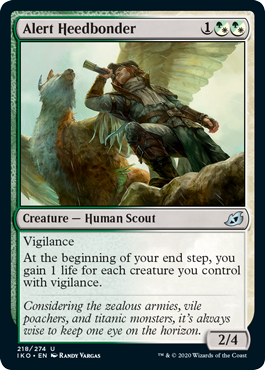
Alert Heedbonder
{1}{g/w}{g/w}
Creature — Human Scout
2/4
Vigilance
At the beginning of your end step, you gain 1 life for each creature you control with vigilance.
- The number of creatures you control with vigilance is determined as Alert Heedbonder's last ability resolves. If it's still on the battlefield, the count will include Alert Heedbonder itself.
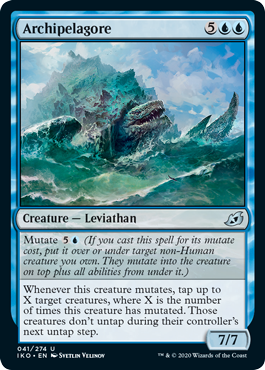
Archipelagore
{5}{U}{U}
Creature — Leviathan
7/7
Mutate {5}{U} (If you cast this spell for its mutate cost, put it over or under target non-Human creature you own. They mutate into the creature on top plus all abilities from under it.)
Whenever this creature mutates, tap up to X target creatures, where X is the number of times this creature has mutated. Those creatures don't untap during their controller's next untap step.
- Archipelagore's triggered ability can target a creature that's already tapped. That creature won't untap during its controller's next untap step.
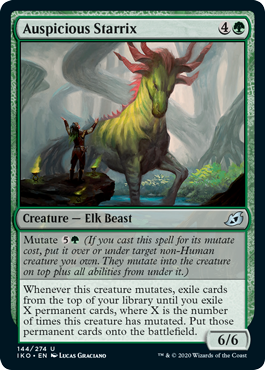
Auspicious Starrix
{4}{G}
Creature — Elk Beast
6/6
Mutate {5}{G} (If you cast this spell for its mutate cost, put it over or under target non-Human creature you own. They mutate into the creature on top plus all abilities from under it.)
Whenever this creature mutates, exile cards from the top of your library until you exile X permanent cards, where X is the number of times this creature has mutated. Put those permanent cards onto the battlefield.
- If an Aura is put onto the battlefield without being cast, the Aura's controller-to-be chooses what it will enchant as it enters the battlefield. An Aura put onto the battlefield this way doesn't target anything (so it could be attached to an opponent's permanent with hexproof, for example), but the Aura's enchant ability restricts what it can be attached to. If the Aura can't legally be attached to anything, it remains in its current zone.
- An Aura being put onto the battlefield this way can't enchant anything else that is being put onto the battlefield at the same time.
- Auspicious Starrix's effect doesn't count as playing lands. It can put land cards onto the battlefield even if it's not your turn or if you've already played your land for the turn.
- If there are fewer than X permanent cards in your library, you exile your entire library and put the permanent cards in it onto the battlefield.
- Any cards that you exile but don't put on the battlefield for any reason (for example, because the card is an instant card or an Aura that can't enchant anything) remain in exile.
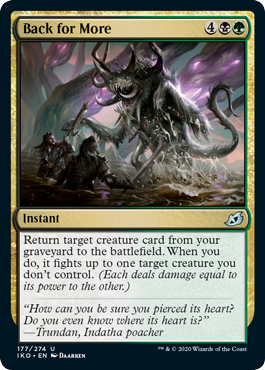
Back for More
{4}{B}{G}
Instant
Return target creature card from your graveyard to the battlefield. When you do, it fights up to one target creature you don't control. (Each deals damage equal to its power to the other.)
- As you cast Back for More, it targets only a creature card in your graveyard. While the spell is resolving, you return the target card to the battlefield. When you do, the reflexive triggered ability triggers and you pick a target to fight. This is different from effects that say "If you do . . ." in that you can return a creature card to the battlefield without a legal target to fight.
- The reflexive triggered ability from Back for More is put onto the stack at the same time as any other triggered abilities caused by the creature entering the battlefield.
- If the target creature is an illegal target when the reflexive triggered ability tries to resolve, the ability doesn't resolve. If the creature you put onto the battlefield is no longer on the battlefield or no longer a creature, the target creature won't deal or be dealt damage.
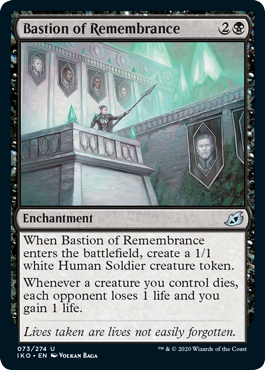
Bastion of Remembrance
{2}{B}
Enchantment
When Bastion of Remembrance enters the battlefield, create a 1/1 white Human Soldier creature token.
Whenever a creature you control dies, each opponent loses 1 life and you gain 1 life.
- If one or more creatures you control die at the same time that Bastion of Remembrance leaves the battlefield, its last ability triggers for each of those creatures.
- If your life total is brought to 0 or less at the same time that creatures you control are dealt lethal damage, you lose the game before the last ability goes on the stack.
- In a Two-Headed Giant game, Bastion of Remembrance's last ability causes the opposing team to lose 2 life and you to gain 1 life.
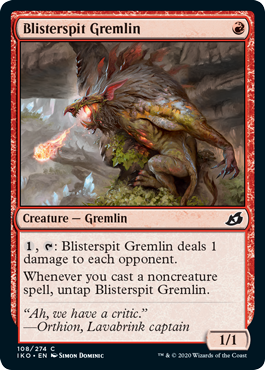
Blisterspit Gremlin
{R}
Creature — Gremlin
1/1
{1}, {T}: Blisterspit Gremlin deals 1 damage to each opponent.
Whenever you cast a noncreature spell, untap Blisterspit Gremlin.
- An ability that triggers when a player casts a spell resolves before the spell that caused it to trigger. It resolves even if that spell is countered.
- Players can cast spells and activate abilities after the triggered ability resolves but before the spell that caused it to trigger does.
- In a Two-Headed Giant game, Blisterspit Gremlin's first ability causes the opposing team to lose 2 life.
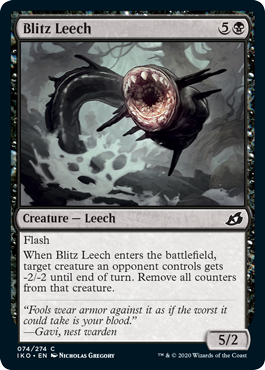
Blitz Leech
{5}{B}
Creature — Leech
5/2
Flash
When Blitz Leech enters the battlefield, target creature an opponent controls gets -2/-2 until end of turn. Remove all counters from that creature.
- Blitz Leech's ability removes all counters from the target creature before state-based actions are checked to see if that creature should die. For example, a 2/2 creature with a flying counter on it will lose that counter while it's a 0/0 creature before it dies.
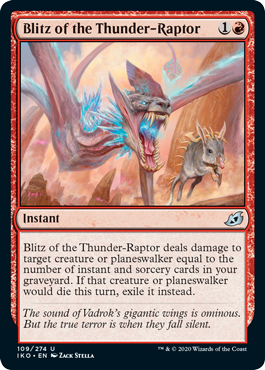
Blitz of the Thunder-Raptor
{1}{R}
Instant
Blitz of the Thunder-Raptor deals damage to target creature or planeswalker equal to the number of instant and sorcery cards in your graveyard. If that creature or planeswalker would die this turn, exile it instead.
- Blitz of the Thunder-Raptor is still on the stack while you determine how much damage is dealt. It isn't in your graveyard to contribute to that amount of damage.
- Blitz of the Thunder-Raptor's replacement effect will exile the target creature or planeswalker if it would die this turn for any reason, not just due to lethal damage. It applies to the target creature or planeswalker even if Blitz of the Thunder-Raptor deals no damage to it (most likely because you have no instant or sorcery cards in your graveyard).
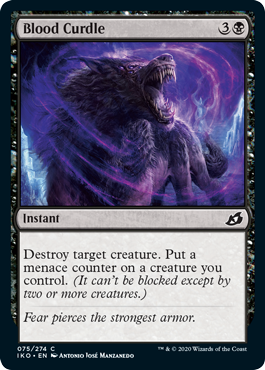
Blood Curdle
{3}{B}
Instant
Destroy target creature. Put a menace counter on a creature you control. (It can't be blocked except by two or more creatures.)
- Blood Curdle targets only one creature: the one that will be destroyed. You choose which creature to put a menace counter on after the target creature has been destroyed.
- If a creature you control was exiled until the creature that was destroyed left the battlefield, the exiled creature returns in time to receive the counter.
- If the target creature is an illegal target by the time Blood Curdle tries to resolve, the spell won't resolve. You won't put a menace counter on any creature. If the target is legal but not destroyed (most likely because it has indestructible), you do put a menace counter on a creature you control.
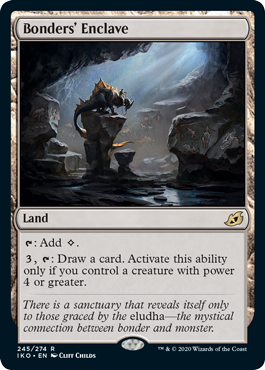
Bonders' Enclave
Land
{T}: Add {C}.
{3}, {T}: Draw a card. Activate this ability only if you control a creature with power 4 or greater.
- Once you announce that you're activating the last ability of Bonders' Enclave, no player may take actions until you've finished activating it. Notably, opponents can't try to change whether you control a creature with power 4 or greater.
- Once you've activated the last ability of Bonders' Enclave, it doesn't check again at any point whether you control a creature with power 4 or greater.
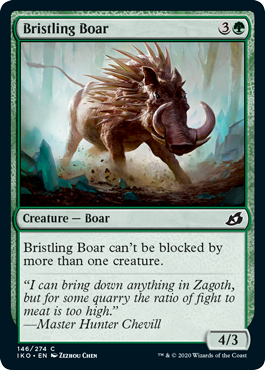
Bristling Boar
{3}{G}
Creature — Boar
4/3
Bristling Boar can't be blocked by more than one creature.
- If Bristling Boar gains menace, it can't be blocked at all.
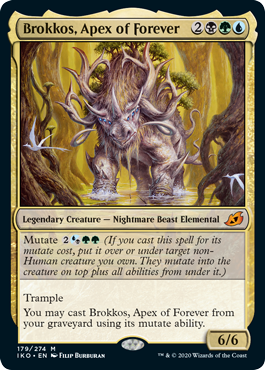
Brokkos, Apex of Forever
{2}{B}{G}{U}
Legendary Creature — Nightmare Beast Elemental
6/6
Mutate {2}{(u/b)}{G}{G} (If you cast this spell for its mutate cost, put it over or under target non-Human creature you own. They mutate into the creature on top plus all abilities from under it.)
Trample
You may cast Brokkos, Apex of Forever from your graveyard using its mutate ability.
- Casting Brokkos with the permission granted by its last ability doesn't change when you can cast it.
- If you cast Brokkos with the permission granted by its last ability, you must pay its mutate cost to cast it. You can't choose to pay its mana cost or another alternative cost.
- If another effect gives you permission to cast Brokkos from your graveyard, you may cast it for any cost associated with that permission.
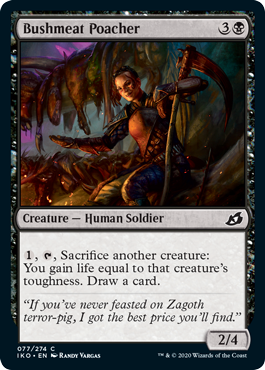
Bushmeat Poacher
{3}{B}
Creature — Human Soldier
2/4
{1}, {T}, Sacrifice another creature: You gain life equal to that creature's toughness. Draw a card.
- Use the sacrificed creature's toughness as it last existed on the battlefield to determine how much life you gain.
- You draw only one card, no matter how much life you gain.
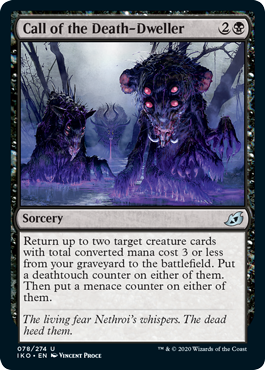
Call of the Death-Dweller
{2}{B}
Sorcery
Return up to two target creature cards with total converted mana cost 3 or less from your graveyard to the battlefield. Put a deathtouch counter on either of them. Then put a menace counter on either of them.
- If a card in a player's graveyard has {X} in its mana cost, X is considered to be 0.
- You could target a single creature card with Call of the Death-Dweller. In this case, you'll put both counters on that creature.
- If you return two creature cards, you may put one counter on each or put both counters on one.
- If you return no creature cards to the battlefield, you won't put any counters on any creatures.
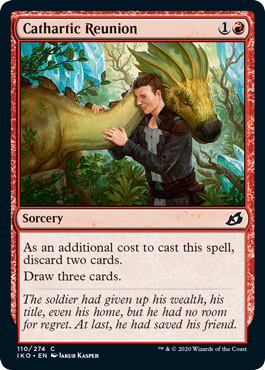
Cathartic Reunion
{1}{R}
Sorcery
As an additional cost to cast this spell, discard two cards.
Draw three cards.
- Because discarding two cards is an additional cost, you can't cast Cathartic Reunion if you don't have at least two other cards in hand.
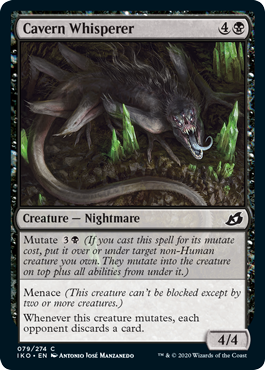
Cavern Whisperer
{4}{B}
Creature — Nightmare
4/4
Mutate {3}{B} (If you cast this spell for its mutate cost, put it over or under target non-Human creature you own. They mutate into the creature on top plus all abilities from under it.)
Menace (This creature can't be blocked except by two or more creatures.)
Whenever this creature mutates, each opponent discards a card.
- As the triggered ability resolves, first the next opponent in turn order (or, if it's an opponent's turn, the opponent whose turn it is) chooses a card in hand without revealing it, then each other opponent in turn order does the same. Then all the chosen cards are discarded at the same time.
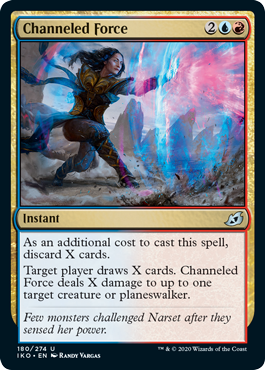
Channeled Force
{2}{U}{R}
Instant
As an additional cost to cast this spell, discard X cards.
Target player draws X cards. Channeled Force deals X damage to up to one target creature or planeswalker.
- If you cast Channeled Force without paying its mana cost, you still choose a value for X and discard that many cards. This is because the spell doesn't have {X} in its mana cost.
- If one of Channeled Force's two targets becomes illegal, the other is still affected as appropriate.
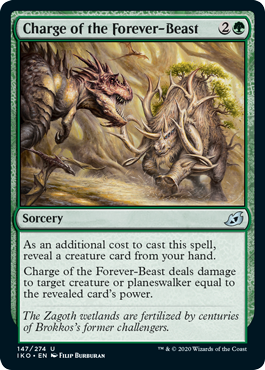
Charge of the Forever-Beast
{2}{G}
Sorcery
As an additional cost to cast this spell, reveal a creature card from your hand.
Charge of the Forever-Beast deals damage to target creature or planeswalker equal to the revealed card's power.
- You must reveal exactly one card to cast Charge of the Forever-Beast; you can't cast it without revealing a card, and you can't reveal additional cards. The revealed card remains revealed until Charge of the Forever-Beast resolves.
- As Charge of the Forever-Beast resolves, it deals damage based on the revealed card's power if it's still in your hand. If that card has left your hand, Charge of the Forever-Beast deals damage based on the card's power immediately before it left your hand.
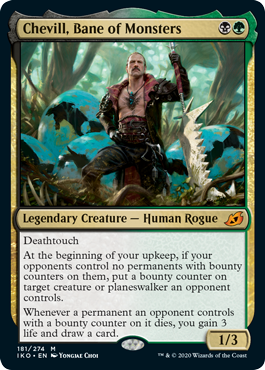
Chevill, Bane of Monsters
{B}{G}
Legendary Creature — Human Rogue
1/3
Deathtouch
At the beginning of your upkeep, if your opponents control no permanents with bounty counters on them, put a bounty counter on target creature or planeswalker an opponent controls.
Whenever a permanent an opponent controls with a bounty counter on it dies, you gain 3 life and draw a card.
- Chevill's middle ability and last ability look for any bounty counter on your opponents' permanents, not just one from that Chevill. For example, if players A and B each control a Chevill and player A has put a bounty counter on player C's creature, player B's Chevill won't put a counter on anything and both players will gain 3 life and draw a card when that creature dies.
- If the creature or planeswalker with a bounty counter on it ceases to be a creature or planeswalker, Chevill's last ability will still trigger if that permanent is put into a graveyard from the battlefield.
- If Chevill leaves the battlefield at the same time that an opponent's permanent with a bounty counter on it dies, you gain 3 life and draw a card. If Chevill leaves the battlefield before that permanent dies, Chevill's last ability won't be around to trigger.
- If your life total is brought to 0 or less at the same time that a creature with a bounty counter on it is dealt lethal damage, you lose the game before the last ability goes on the stack.
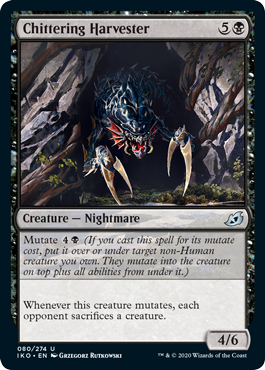
Chittering Harvester
{5}{B}
Creature — Nightmare
4/6
Mutate {4}{B} (If you cast this spell for its mutate cost, put it over or under target non-Human creature you own. They mutate into the creature on top plus all abilities from under it.)
Whenever this creature mutates, each opponent sacrifices a creature.
- As the triggered ability resolves, first the next opponent in turn order (or, if it's an opponent's turn, the opponent whose turn it is) chooses a creature they control, then each other opponent in turn order does the same, knowing the choices made before them. Then all the chosen creatures are sacrificed at the same time.
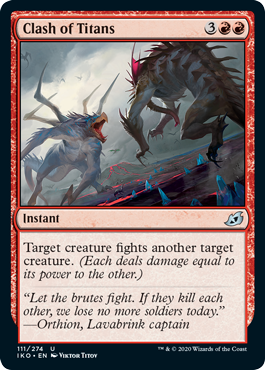
Clash of Titans
{3}{R}{R}
Instant
Target creature fights another target creature. (Each deals damage equal to its power to the other.)
- Clash of Titans can target two creatures controlled by the same player.
- If either target is an illegal target as Clash of Titans tries to resolve, neither creature will deal or be dealt damage.
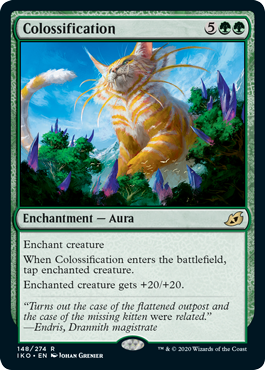
Colossification
{5}{G}{G}
Enchantment — Aura
Enchant creature
When Colossification enters the battlefield, tap enchanted creature.
Enchanted creature gets +20/+20.
- Colossification can be attached to a creature that's already tapped. Its middle ability won't have any effect, but its last ability certainly will.
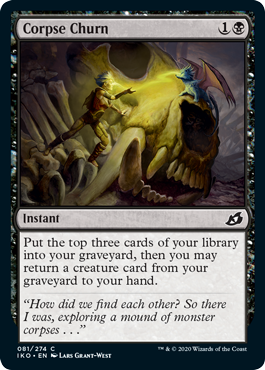
Corpse Churn
{1}{B}
Instant
Put the top three cards of your library into your graveyard, then you may return a creature card from your graveyard to your hand.
- Because Corpse Churn doesn't target the creature card in your graveyard, you may choose one of the three cards you put there from your library.
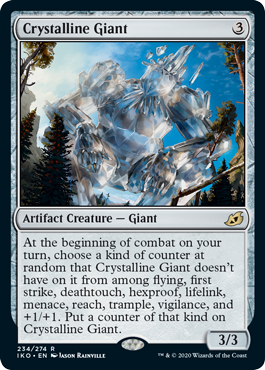
Crystalline Giant
{3}
Artifact Creature — Giant
3/3
At the beginning of combat on your turn, choose a kind of counter at random that Crystalline Giant doesn't have on it from among flying, first strike, deathtouch, hexproof, lifelink, menace, reach, trample, vigilance, and +1/+1. Put a counter of that kind on Crystalline Giant.
- You choose a kind of counter at random and put it on Crystalline Giant all while its ability is resolving. Players can't take actions between the time the choice is made and the time Crystalline Giant has the counter.
- As long as Crystalline Giant doesn't have all ten of the listed counters on it, you'll put one on it at the beginning of combat on your turn. If it has all ten kinds, the ability will trigger but you won't put any counter on it.
- If Crystalline Giant has one of the listed keywords but not because of a counter of that kind, that kind of counter is still eligible to be chosen at random.
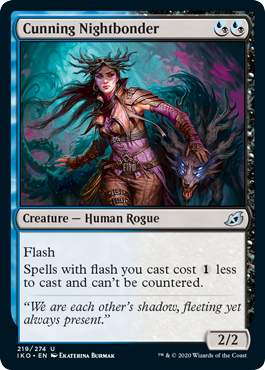
Cunning Nightbonder
{u/b}{u/b}
Creature — Human Rogue
2/2
Flash
Spells with flash you cast cost {1} less to cast and can't be countered.
- Cunning Nightbonder's last ability doesn't apply to itself while it's a spell.
- To determine the total cost of a spell, start with the mana cost or alternative cost you're paying, add any cost increases, then apply any cost reductions (such as that of Cunning Nightbonder). The converted mana cost of the spell remains unchanged, no matter what the total cost to cast it was.
- Cunning Nightbonder's cost reduction applies only to generic mana in a spell's cost. It can't reduce a spell's colored mana requirements. For example, your first Cunning Nightbonder won't normally reduce the cost of your second since it has no generic mana in its cost.
- A spell or ability that counters spells can still target spells with flash you cast. When that spell or ability resolves, your spell won't be countered, but any additional effects of the countering spell or ability will still happen.
- If Cunning Nightbonder enters the battlefield while a spell with flash that you cast is on the stack, that spell can't be countered, even though you don't get the {1} discount.
- Players can't attempt to remove Cunning Nightbonder to raise the cost of a spell you wish to cast, but they can remove it to allow their spells and abilities to counter your spells.
- Spells with flash that you control but didn't cast (perhaps because they're copies of a spell or because you took control of them from another player) can be countered.
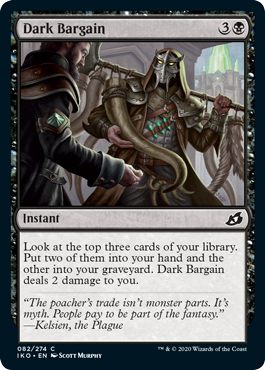
Dark Bargain
{3}{B}
Instant
Look at the top three cards of your library. Put two of them into your hand and the other into your graveyard. Dark Bargain deals 2 damage to you.
- If you have fewer than three cards in your library, you put them all into your hand and none into your graveyard.
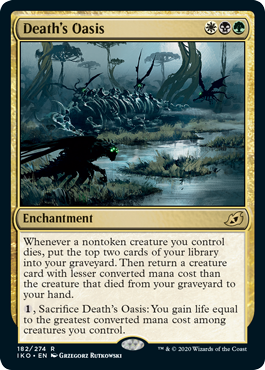
Death's Oasis
{W}{B}{G}
Enchantment
Whenever a nontoken creature you control dies, put the top two cards of your library into your graveyard. Then return a creature card with lesser converted mana cost than the creature that died from your graveyard to your hand.
{1}, Sacrifice Death's Oasis: You gain life equal to the greatest converted mana cost among creatures you control.
- Because the triggered ability doesn't target the creature card in your graveyard, you may choose one of the two cards you put there from your library.
- If a creature on the battlefield or a card in your graveyard has {X} in its mana cost, X is considered to be 0.
- Use the converted mana cost of the creature as it last existed on the battlefield and the converted mana cost of the creature card as it exists in your graveyard to determine which cards may be returned to your hand. This may result in a creature's death bringing itself back to your hand; perhaps it was one card of a merged creature, or it had become a copy of a more expensive creature.
- If Death's Oasis becomes a creature, activating its last ability will cause its first ability to trigger.
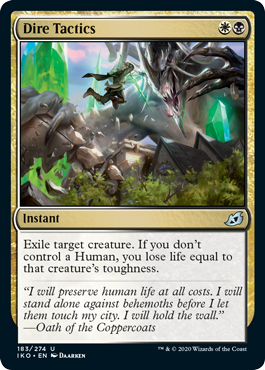
Dire Tactics
{W}{B}
Instant
Exile target creature. If you don't control a Human, you lose life equal to that creature's toughness.
- Use the exiled creature's toughness as it last existed on the battlefield to determine how much life you lose.
- Whether you control a Human is checked only after exiling the target creature. If that creature had exiled a Human you controlled until that creature left the battlefield, that Human will return to the battlefield in time to be counted.
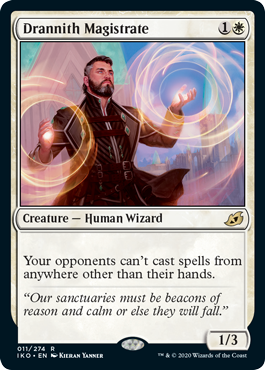
Drannith Magistrate
{1}{W}
Creature — Human Wizard
1/3
Your opponents can't cast spells from anywhere other than their hands.
- If an effect says that an opponent may cast a spell from anywhere other than their hand, Drannith Magistrate's restriction overrules that permission.
- If a rule or effect allows them to do so, your opponents may play lands from zones other than their hand and activate abilities of cards in zones other than their hand.
- Effects may put cards from other zones onto the battlefield under an opponent's control.
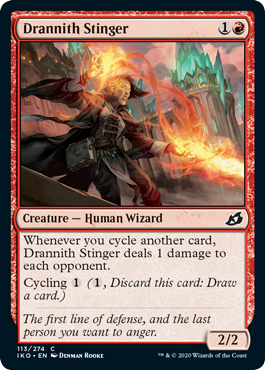
Drannith Stinger
{1}{R}
Creature — Human Wizard
2/2
Whenever you cycle another card, Drannith Stinger deals 1 damage to each opponent.
Cycling {1} ({1}, Discard this card: Draw a card.)
- In a Two-Headed Giant game, Drannith Stinger's first ability causes the opposing team to lose 2 life.
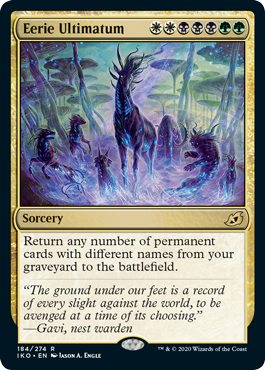
Eerie Ultimatum
{W}{W}{B}{B}{B}{G}{G}
Sorcery
Return any number of permanent cards with different names from your graveyard to the battlefield.
- A permanent card is an artifact, creature, enchantment, land, or planeswalker card.
- You choose which permanent cards to return while Eerie Ultimatum is resolving. No player may take actions between the time you choose and the time those cards return to the battlefield.
- You may choose to return just one permanent card, regardless of its name.
- If an Aura is put onto the battlefield without being cast, the Aura's controller-to-be chooses what it will enchant as it enters the battlefield. An Aura put onto the battlefield this way doesn't target anything (so it could be attached to an opponent's permanent with hexproof, for example), but the Aura's enchant ability restricts what it can be attached to. If the Aura can't legally be attached to anything, it remains in its current zone.
- An Aura being put onto the battlefield this way can't enchant anything else that is being put onto the battlefield at the same time.
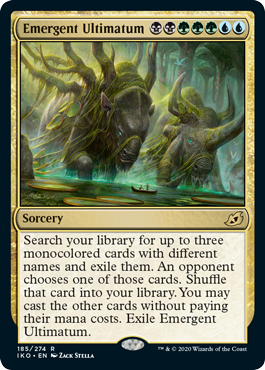
Emergent Ultimatum
{B}{B}{G}{G}{G}{U}{U}
Sorcery
Search your library for up to three monocolored cards with different names and exile them. An opponent chooses one of those cards. Shuffle that card into your library. You may cast the other cards without paying their mana costs. Exile Emergent Ultimatum.
- A monocolored card is exactly one of white, blue, black, red, or green and no other colors. A colorless card isn't monocolored.
- If you find only one card, you'll shuffle it into your library and exile Emergent Ultimatum without casting anything.
- If you wish to cast any exiled cards, you do so as part of the resolution of Emergent Ultimatum. You can't wait to cast them later. Timing permissions based on a card's type are ignored.
- Emergent Ultimatum is still on the stack while you cast the cards you found, so those spells could target it. However, once it's exiled, it will no longer be a legal target.
- If you cast a spell "without paying its mana cost," you can't choose to cast it for any alternative costs. You can, however, pay additional costs, such as kicker costs. If the card has any mandatory additional costs, such as that of Cathartic Reunion, those must be paid to cast the card.
- If a spell has {X} in its mana cost, you must choose 0 as the value of X when casting it without paying its mana cost.
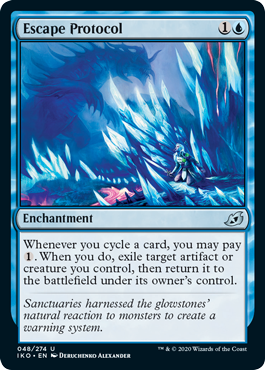
Escape Protocol
{1}{U}
Enchantment
Whenever you cycle a card, you may pay {1}. When you do, exile target artifact or creature you control, then return it to the battlefield under its owner's control.
- While resolving Escape Protocol's triggered ability, you can't pay {1} multiple times to exile multiple permanents you control.
- Escape Protocol's triggered ability goes on the stack without a target. While that ability is resolving, you may pay {1}. If you do, a second ability triggers and you pick a target artifact or creature you control. This is different from abilities that say "If you do . . ." in that players may cast spells and activate abilities after mana is paid but before the target changes zones.
- When the card returns to the battlefield, it will be a new object with no connection to the card that was exiled. Auras attached to the exiled permanent will be put into their owners' graveyards. Any Equipment will become unattached and remain on the battlefield. Any counters on the exiled permanent will cease to exist.
- If a token is exiled this way, it will cease to exist and won't return to the battlefield.
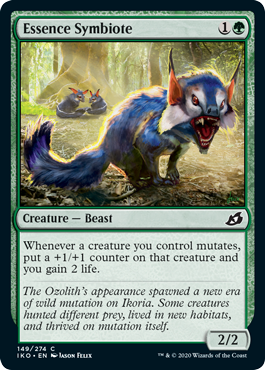
Essence Symbiote
{1}{G}
Creature — Beast
2/2
Whenever a creature you control mutates, put a +1/+1 counter on that creature and you gain 2 life.
- You gain 2 life when Essence Symbiote's ability resolves, even if you can't put a +1/+1 counter on the mutated creature (most likely because it's left the battlefield).
- If Essence Symbiote mutates, its ability triggers.
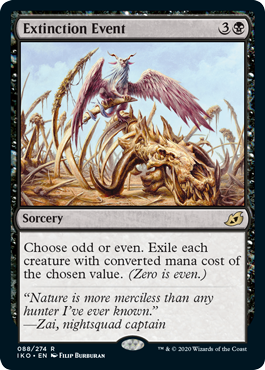
Extinction Event
{3}{B}
Sorcery
Choose odd or even. Exile each creature with converted mana cost of the chosen value. (Zero is even.)
- You choose odd or even while Extinction Event is resolving. Players can't take any actions between the time you make that choice and the time some creatures go extinct.
- If a creature on the battlefield has {X} in its mana cost, X is considered to be 0.
- The converted mana cost of a token that isn't a copy of another object is 0. A token that is a copy of another object has the same mana cost as that object.
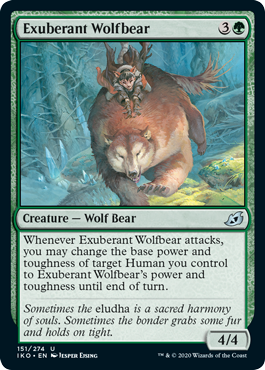
Exuberant Wolfbear
{3}{G}
Creature — Wolf Bear
4/4
Whenever Exuberant Wolfbear attacks, you may change the base power and toughness of target Human you control to Exuberant Wolfbear's power and toughness until end of turn.
- Exuberant Wolfbear's power and toughness are unaffected when the target Human takes on those values.
- You choose whether the Human's base power and toughness change as the ability resolves, not as the ability is put onto the stack.
- Any effects that modify the Human's power and/or toughness without setting them to a specific number or value will apply after its base power and toughness are set, regardless of the order in which those effects were created. The same is true of counters that modify its power and toughness.
- The Human's new base power and toughness are set to Exuberant Wolfbear's actual power and toughness, not just its base power and toughness. If Exuberant Wolfbear's power or toughness changes later in the turn, the Human isn't affected.
- If Exuberant Wolfbear leaves the battlefield while its triggered ability is on the stack, use its power and toughness as it last existed on the battlefield to determine the Human's new base power and toughness.
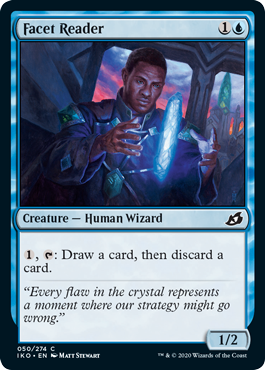
Facet Reader
{1}{U}
Creature — Human Wizard
1/2
{1}, {T}: Draw a card, then discard a card.
- You draw a card and discard a card all while Facet Reader's ability is resolving. Nothing can happen between the two, and no player may choose to take actions.
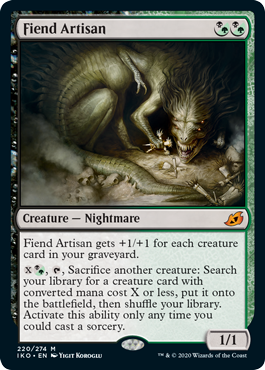
Fiend Artisan
{b/g}{b/g}
Creature — Nightmare
1/1
Fiend Artisan gets +1/+1 for each creature card in your graveyard.
{X}{b/g}, {T}, Sacrifice another creature: Search your library for a creature card with converted mana cost X or less, put it onto the battlefield, then shuffle your library. Activate this ability only any time you could cast a sorcery.
- Fiend Artisan's first ability applies only while it's on the battlefield.
- Because damage remains marked on a creature until the damage is removed as the turn ends, nonlethal damage dealt to Fiend Artisan may become lethal if creature cards leave your graveyard during that turn.
- If a card in a player's library has {X} in its mana cost, X is considered to be 0.
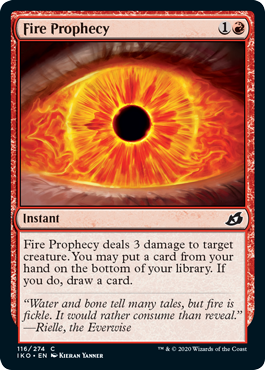
Fire Prophecy
{1}{R}
Instant
Fire Prophecy deals 3 damage to target creature. You may put a card from your hand on the bottom of your library. If you do, draw a card.
- If the target creature is an illegal target by the time Fire Prophecy tries to resolve, the spell won't resolve. You won't have the option to put a card on the bottom of your library.
- While resolving Fire Prophecy, you can't put more than one card on the bottom of your library to draw more than one card.
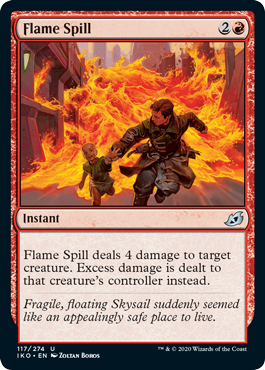
Flame Spill
{2}{R}
Instant
Flame Spill deals 4 damage to target creature. Excess damage is dealt to that creature's controller instead.
- Excess damage caused by a spell or ability is similar to how combat damage from a creature with trample is handled. Start with the amount of damage being dealt to the creature and determine what is "lethal." This is the creature's toughness minus the amount of damage that it already has marked on it, but ignoring any replacement or prevention effects that will modify this damage. Also ignore whether the creature has an ability such as indestructible that will result in it not being destroyed by this damage.
- Once you've determined how much damage is excess, Flame Spill simultaneously deals damage to the creature and to its controller. This damage may be modified by replacement or prevention effects.
- If the target creature is an illegal target by the time Flame Spill tries to resolve, the spell won't resolve. It won't deal damage to any player.
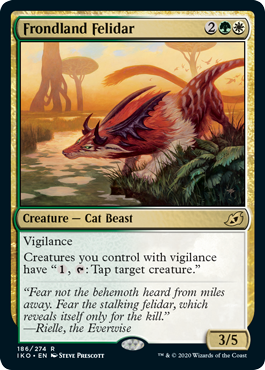
Frondland Felidar
{2}{G}{W}
Creature — Cat Beast
3/5
Vigilance
Creatures you control with vigilance have "{1}, {T}: Tap target creature."
- Frondland Felidar's last ability applies to itself as long as it still has vigilance.
- You can activate the ability granted by Frondland Felidar after attacking but before blockers are chosen.
- Tapping an attacking creature doesn't remove it from combat.
- Once you've activated the ability granted by Frondland Felidar, causing the creature to lose that ability (such as by removing Frondland Felidar from the battlefield) won't affect the ability on the stack.
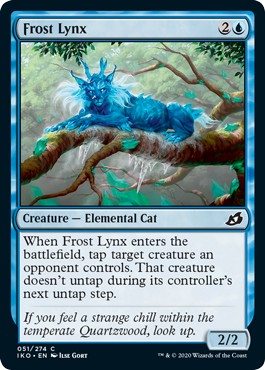
Frost Lynx
{2}{U}
Creature — Elemental Cat
2/2
When Frost Lynx enters the battlefield, tap target creature an opponent controls. That creature doesn't untap during its controller's next untap step.
- Frost Lynx's triggered ability can target a creature that's already tapped. That creature won't untap during its controller's next untap step.
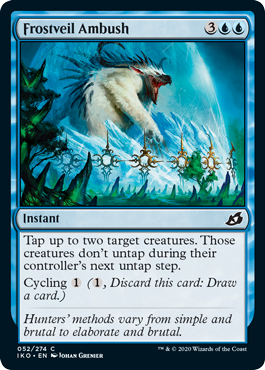
Frostveil Ambush
{3}{U}{U}
Instant
Tap up to two target creatures. Those creatures don't untap during their controller's next untap step.
Cycling {1} ({1}, Discard this card: Draw a card.)
- Frostveil Ambush can target a creature that's already tapped. That creature won't untap during its controller's next untap step.
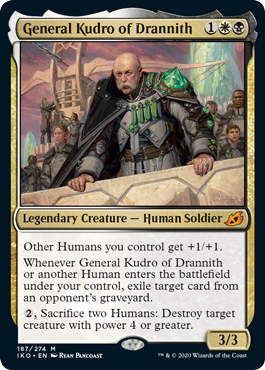
General Kudro of Drannith
{1}{W}{B}
Legendary Creature — Human Soldier
3/3
Other Humans you control get +1/+1.
Whenever General Kudro of Drannith or another Human enters the battlefield under your control, exile target card from an opponent's graveyard.
{2}, Sacrifice two Humans: Destroy target creature with power 4 or greater.
- Because damage remains marked on a creature until the damage is removed as the turn ends, nonlethal damage dealt to a Human you control may become lethal if General Kudro leaves the battlefield during that turn.
- Only creatures are Humans. Planeswalkers such as Lukka and Narset who represent human characters won't cause General Kudro's middle ability to trigger.
- General Kudro can be sacrificed to pay the cost of its own last ability. How noble.
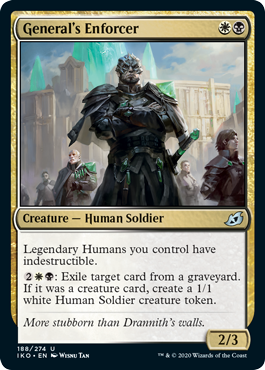
General's Enforcer
{W}{B}
Creature — Human Soldier
2/3
Legendary Humans you control have indestructible.
{2}{W}{B}: Exile target card from a graveyard. If it was a creature card, create a 1/1 white Human Soldier creature token.
- Because damage remains marked on a creature until the damage is removed as the turn ends, nonlethal damage dealt to a legendary Human you control may become lethal if General's Enforcer leaves the battlefield during that turn.
- Only creatures are Humans. Planeswalkers such as Lukka and Narset who represent human characters aren't affected by General's Enforcer.
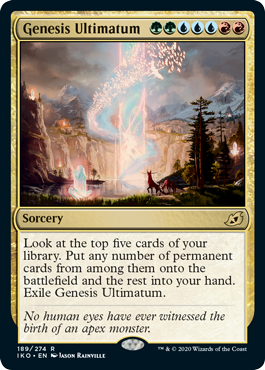
Genesis Ultimatum
{G}{G}{U}{U}{U}{R}{R}
Sorcery
Look at the top five cards of your library. Put any number of permanent cards from among them onto the battlefield and the rest into your hand. Exile Genesis Ultimatum.
- You can choose to not put a permanent card onto the battlefield this way. You'll put it into your hand without revealing it and without saying whether it was a permanent card.
- Any abilities that trigger as the permanents enter the battlefield this way won't be put onto the stack until after Genesis Ultimatum has finished resolving and is in exile.
- If an Aura is put onto the battlefield without being cast, the Aura's controller-to-be chooses what it will enchant as it enters the battlefield. An Aura put onto the battlefield this way doesn't target anything (so it could be attached to an opponent's permanent with hexproof, for example), but the Aura's enchant ability restricts what it can be attached to. If the Aura can't legally be attached to anything, it remains in its current zone.
- An Aura being put onto the battlefield this way can't enchant anything else that is being put onto the battlefield at the same time.
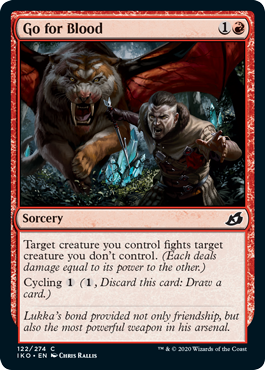
Go for Blood
{1}{R}
Sorcery
Target creature you control fights target creature you don't control. (Each deals damage equal to its power to the other.)
Cycling {1} ({1}, Discard this card: Draw a card.)
- If either target is an illegal target as Go for Blood resolves, no creature will deal or be dealt damage.
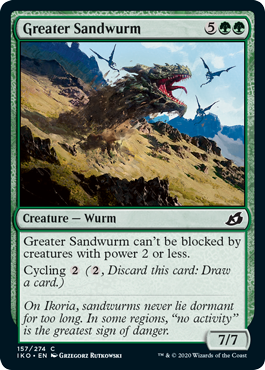
Greater Sandwurm
{5}{G}{G}
Creature — Wurm
7/7
Greater Sandwurm can't be blocked by creatures with power 2 or less.
Cycling {2} ({2}, Discard this card: Draw a card.)
- Once a creature with power 3 or greater has blocked Greater Sandwurm, changing the power of the blocking creature won't cause Greater Sandwurm to become unblocked.
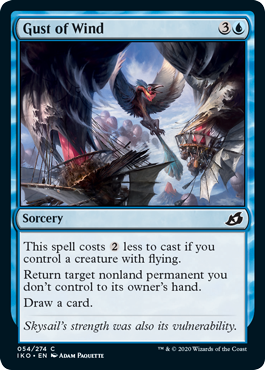
Gust of Wind
{3}{U}
Sorcery
This spell costs {2} less to cast if you control a creature with flying.
Return target nonland permanent you don't control to its owner's hand.
Draw a card.
- To determine the total cost of a spell, start with the mana cost or alternative cost you're paying, add any cost increases, then apply any cost reductions (such as that of Gust of Wind). The converted mana cost of the spell remains unchanged, no matter what the total cost to cast it was.
- Once you announce that you're casting Gust of Wind, no player may take actions until the spell has been paid for. Notably, opponents can't try to change whether you control a creature with flying.
- Gust of Wind is unaffected if you no longer control a creature with flying after you've cast it.
- If the target nonland permanent is an illegal target by the time Gust of Wind tries to resolve, the spell won't resolve. You won't draw a card.
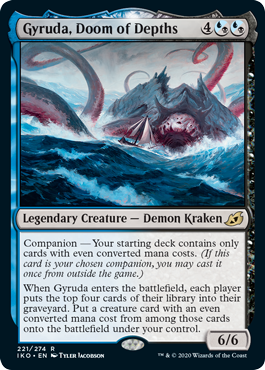
Gyruda, Doom of Depths
{4}{u/b}{u/b}
Legendary Creature — Demon Kraken
6/6
Companion — Your starting deck contains only cards with even converted mana costs. (If this card is your chosen companion, you may cast it once from outside the game.)
When Gyruda enters the battlefield, each player puts the top four cards of their library into their graveyard. Put a creature card with an even converted mana cost from among those cards onto the battlefield under your control.
- If a card in a player's graveyard has {X} in its mana cost, X is considered to be 0.
- A card with converted mana cost 0 has an even converted mana cost.
- If a replacement effect causes a player to exile the top four cards of their library instead of putting them into their graveyard as Gyruda's triggered ability resolves, the creature card you choose may be one of those cards in exile.
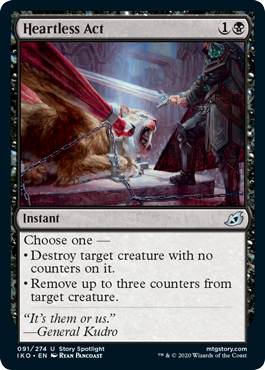
Heartless Act
{1}{B}
Instant
Choose one —
• Destroy target creature with no counters on it.
• Remove up to three counters from target creature.
- If you choose the second mode for Heartless Act, you choose which counters to remove from the creature, no matter who controls the creature. You may choose counters of different kinds.
- If you choose the first mode and the creature gains a counter in response, you can't remove counters from it instead; the spell just doesn't resolve. Similarly, if you choose the second mode and the creature loses its counters in response, you can't destroy it instead.
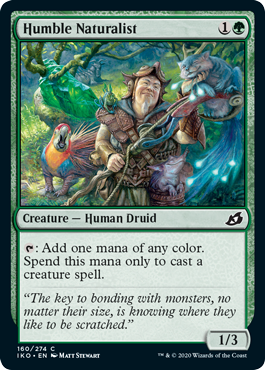
Humble Naturalist
{1}{G}
Creature — Human Druid
1/3
{T}: Add one mana of any color. Spend this mana only to cast a creature spell.
- Mana produced by Humble Naturalist can be spent on any part of a creature spell's total cost, including additional costs (such as kicker costs) and alternative costs (such as mutate costs). It can't be spent to pay the costs of abilities of creatures you control.
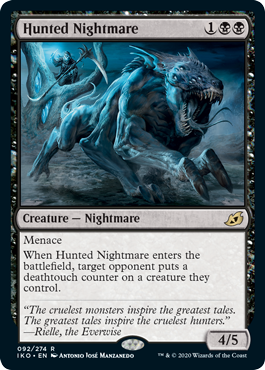
Hunted Nightmare
{1}{B}{B}
Creature — Nightmare
4/5
Menace
When Hunted Nightmare enters the battlefield, target opponent puts a deathtouch counter on a creature they control.
- The target opponent chooses which of their creatures receives a deathtouch counter.
- If the target opponent controls no creatures, they won't put a deathtouch counter on any creature.
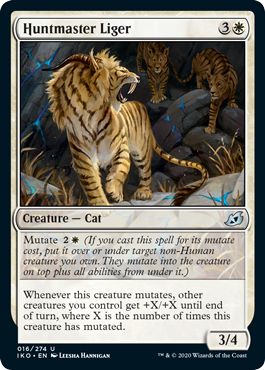
Huntmaster Liger
{3}{W}
Creature — Cat
3/4
Mutate {2}{W} (If you cast this spell for its mutate cost, put it over or under target non-Human creature you own. They mutate into the creature on top plus all abilities from under it.)
Whenever this creature mutates, other creatures you control get +X/+X until end of turn, where X is the number of times this creature has mutated.
- Huntmaster Liger's triggered ability affects only creatures you control at the time it resolves. Creatures you begin to control later in the turn won't get +X/+X.
- The value of X is determined only as the triggered ability resolves. Once that happens, the value of X won't change later in the turn even if Huntmaster Liger mutates again, although in that case the creatures will receive a second, larger +X/+X in addition to the one generated by the ability's earlier resolution.
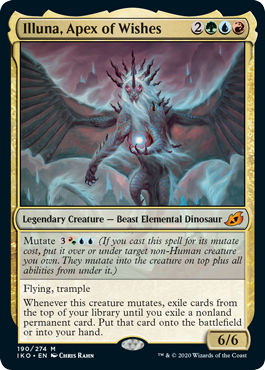
Illuna, Apex of Wishes
{2}{G}{U}{R}
Legendary Creature — Beast Elemental Dinosaur
6/6
Mutate {3}{r/g}{U}{U} (If you cast this spell for its mutate cost, put it over or under target non-Human creature you own. They mutate into the creature on top plus all abilities from under it.)
Flying, trample
Whenever this creature mutates, exile cards from the top of your library until you exile a nonland permanent card. Put that card onto the battlefield or into your hand.
- Illuna's last ability exiles the cards face up. All players will see what the card is if you put it into your hand.
- You choose whether to put the card into your hand or onto the battlefield after seeing what the card is.
- A nonland permanent card is an artifact, creature, enchantment, or planeswalker card.
- Any land, instant, and sorcery cards exiled this way remain in exile.
- If an Aura is put onto the battlefield without being cast, the Aura's controller-to-be chooses what it will enchant as it enters the battlefield. An Aura put onto the battlefield this way doesn't target anything (so it could be attached to an opponent's permanent with hexproof, for example), but the Aura's enchant ability restricts what it can be attached to. If the Aura can't legally be attached to anything, it remains in its current zone.
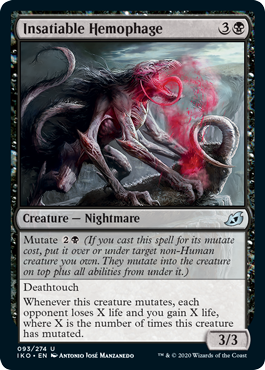
Insatiable Hemophage
{3}{B}
Creature — Nightmare
3/3
Mutate {2}{B} (If you cast this spell for its mutate cost, put it over or under target non-Human creature you own. They mutate into the creature on top plus all abilities from under it.)
Deathtouch
Whenever this creature mutates, each opponent loses X life and you gain X life, where X is the number of times this creature has mutated.
- In a Two-Headed Giant game, Insatiable Hemophage's last ability causes the opposing team to lose life equal to twice the value of X and you to gain X life.
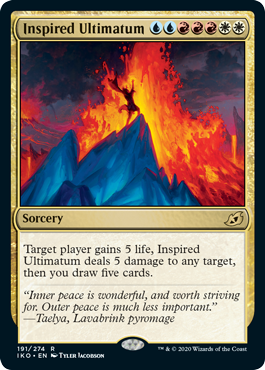
Inspired Ultimatum
{U}{U}{R}{R}{R}{W}{W}
Sorcery
Target player gains 5 life, Inspired Ultimatum deals 5 damage to any target, then you draw five cards.
- You can target yourself as the player to gain 5 life.
- If either target becomes illegal before Inspired Ultimatum resolves, the other will be affected as appropriate and you'll draw five cards. If both targets become illegal, the spell won't resolve and you won't draw five cards.
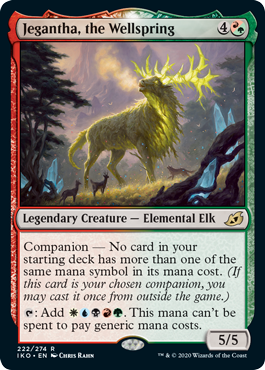
Jegantha, the Wellspring
{4}{r/g}
Legendary Creature — Elemental Elk
5/5
Companion — No card in your starting deck has more than one of the same mana symbol in its mana cost. (If this card is your chosen companion, you may cast it once from outside the game.)
{T}: Add {W}{U}{B}{R}{G}. This mana can't be spent to pay generic mana costs.
- Jegantha's companion ability compares the exact symbols in the mana costs of cards in your deck. If any one card has the same symbol twice, such as {X}{X}{R} or {r/g}{r/g}, the companion condition isn't satisfied.
- A generic mana cost is usually represented by numeric mana symbols ({1}, {2}, and so on) and also {X}. It is any cost requiring mana where that cost isn't {C}, {W}, {U}, {B}, {R}, or {G}.
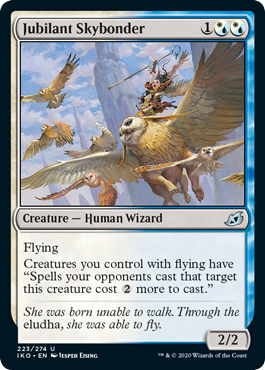
Jubilant Skybonder
{1}{w/u}{w/u}
Creature — Human Wizard
2/2
Flying
Creatures you control with flying have "Spells your opponents cast that target this creature cost {2} more to cast."
- Jubilant Skybonder's last ability applies to itself as long as it still has flying.
- An opponent's spell that targets a single creature with flying you control more than once costs only {2} more to cast. An opponent's spell that targets multiple creatures with flying you control costs {2} more for each of those creatures.
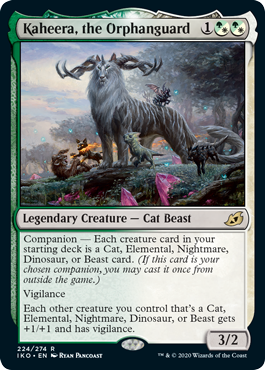
Kaheera, the Orphanguard
{1}{g/w}{g/w}
Legendary Creature — Cat Beast
3/2
Companion — Each creature card in your starting deck is a Cat, Elemental, Nightmare, Dinosaur, or Beast card. (If this card is your chosen companion, you may cast it once from outside the game.)
Vigilance
Each other creature you control that's a Cat, Elemental, Nightmare, Dinosaur, or Beast gets +1/+1 and has vigilance.
- Creature cards in your deck may be a mix of the five creature types that Kaheera cares about. They may also have additional types, as long as each creature card is at least one of those five. Noncreature cards may have any subtypes.
- A creature that's more than one of the five types gets +1/+1 only once from Kaheera's last ability.
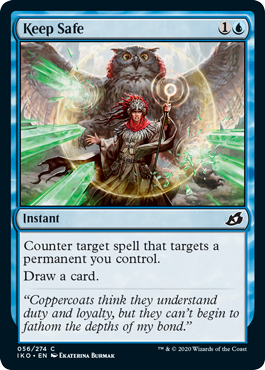
Keep Safe
{1}{U}
Instant
Counter target spell that targets a permanent you control.
Draw a card.
- A spell that can't be countered is a legal target for Keep Safe. That spell won't be countered when Keep Safe resolves, but you'll still draw a card.
- Keep Safe can target a spell that has multiple targets, as long as at least one of those targets is a permanent you control.
- If the permanent you control targeted by the target spell leaves the battlefield, that spell is no longer a legal target for Keep Safe. On the other hand, if that target permanent becomes an illegal target for the target spell but remains on the battlefield under your control, the target spell is still a legal target for Keep Safe.
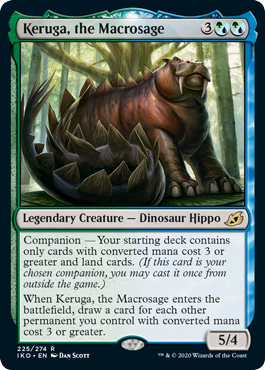
Keruga, the Macrosage
{3}{g/u}{g/u}
Legendary Creature — Dinosaur Hippo
5/4
Companion — Your starting deck contains only cards with converted mana cost 3 or greater and land cards. (If this card is your chosen companion, you may cast it once from outside the game.)
When Keruga, the Macrosage enters the battlefield, draw a card for each other permanent you control with converted mana cost 3 or greater.
- If a card in a player's deck or a permanent on the battlefield has {X} in its mana cost, X is considered to be 0.
- The converted mana cost of a token that isn't a copy of another object is 0. A token that is a copy of another object has the same mana cost as that object.
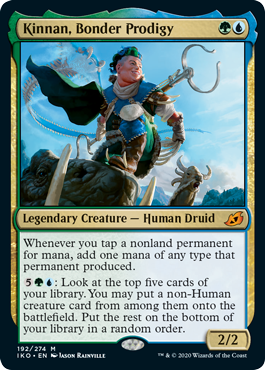
Kinnan, Bonder Prodigy
{G}{U}
Legendary Creature — Human Druid
2/2
Whenever you tap a nonland permanent for mana, add one mana of any type that permanent produced.
{5}{G}{U}: Look at the top five cards of your library. You may put a non-Human creature card from among them onto the battlefield. Put the rest on the bottom of your library in a random order.
- You're "tapping a permanent for mana" only if you're activating a mana ability of that permanent that includes the {T} symbol in its cost. A mana ability produces mana as part of its effect.
- The types of mana are white, blue, black, red, green, and colorless.
- The additional mana is produced by Kinnan, not by the nonland permanent that you tapped for mana.
- Kinnan doesn't care about any restrictions or riders the nonland permanent put on the mana it produced. The additional mana Kinnan produces won't have any restrictions or riders.
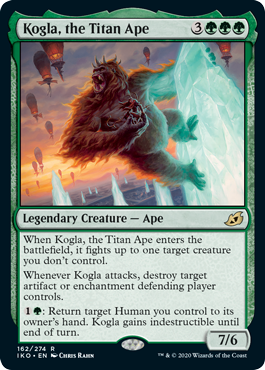
Kogla, the Titan Ape
{3}{G}{G}{G}
Legendary Creature — Ape
7/6
When Kogla, the Titan Ape enters the battlefield, it fights up to one target creature you don't control.
Whenever Kogla attacks, destroy target artifact or enchantment defending player controls.
{1}{G}: Return target Human you control to its owner's hand. Kogla gains indestructible until end of turn.
- If the target creature is an illegal target when Kogla's first ability tries to resolve, the ability doesn't resolve. If it's a legal target but Kogla is no longer on the battlefield when the ability resolves, the target creature won't deal or be dealt damage.
- If the target Human is an illegal target by the time Kogla's last ability tries to resolve, the ability won't resolve. Kogla won't gain indestructible.
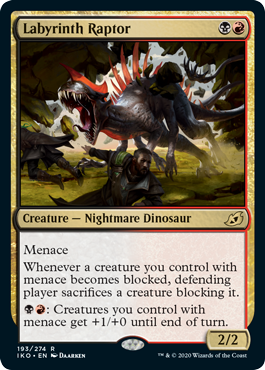
Labyrinth Raptor
{B}{R}
Creature — Nightmare Dinosaur
2/2
Menace
Whenever a creature you control with menace becomes blocked, defending player sacrifices a creature blocking it.
{B}{R}: Creatures you control with menace get +1/+0 until end of turn.
- Labyrinth Raptor's second and third abilities apply to itself as long as it still has menace.
- The defending player sacrifices a blocking creature before combat damage is dealt. This may cause a single creature to be blocking the creature with menace; the blocking creature remains blocking. It will still deal and be dealt combat damage as normal.
- If a creature is attacking a planeswalker, the planeswalker's controller is the defending player.
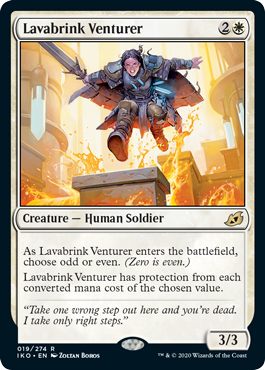
Lavabrink Venturer
{2}{W}
Creature — Human Soldier
3/3
As Lavabrink Venturer enters the battlefield, choose odd or even. (Zero is even.)
Lavabrink Venturer has protection from each converted mana cost of the chosen value.
- You choose odd or even for Lavabrink Venturer before it enters the battlefield. There's no point at which players can target it before it has gained the appropriate protection abilities.
- If Lavabrink Venturer somehow has no choice made for its ability, its last ability grants it no protection abilities.
- For spells with {X} in their mana costs, use the value chosen for X to determine the spell's converted mana cost. If a permanent or card in any other zone has {X} in its mana cost, X is considered to be 0.
- The converted mana cost of a token that isn't a copy of another object is 0. A token that is a copy of another object has the same converted mana cost as that object.
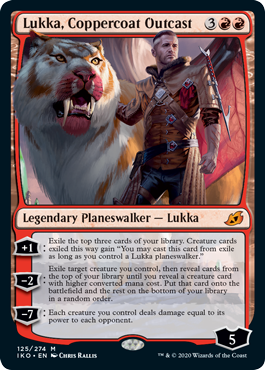
Lukka, Coppercoat Outcast
{3}{R}{R}
Legendary Planeswalker — Lukka
5
+1: Exile the top three cards of your library. Creature cards exiled this way gain "You may cast this card from exile as long as you control a Lukka planeswalker."
−2: Exile target creature you control, then reveal cards from the top of your library until you reveal a creature card with higher converted mana cost. Put that card onto the battlefield and the rest on the bottom of your library in a random order.
−7: Each creature you control deals damage equal to its power to each opponent.
- For each creature card exiled with Lukka's first ability, you can cast it as long as you control any Lukka planeswalker, not just the one that exiled the card.
- The ability granted by Lukka's first ability doesn't change when you may cast the card.
- You still pay any costs for spells cast from Lukka's first ability. You may pay alternative costs, such as mutate costs.
- Once you begin to cast an exiled card, losing control of Lukka won't affect the spell. You can finish casting it as normal.
- You may cast creature cards exiled with Lukka's first ability as noncreature spells if a rule or effect allows you to do so. For example, adventurer cards from the Throne of Eldraine set may be cast as Adventures.
- If a creature card in a player's library or a creature on the battlefield has {X} in its mana cost, X is considered to be 0.
- If you reveal your entire library without revealing a creature card with higher converted mana cost, you put the library back in a random order and continue.
- In a Two-Headed Giant game, Lukka's last ability causes the opposing team to lose twice as much life as the power of your creatures.
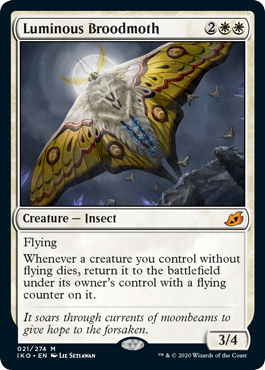
Luminous Broodmoth
{2}{W}{W}
Creature — Insect
3/4
Flying
Whenever a creature you control without flying dies, return it to the battlefield under its owner's control with a flying counter on it.
- If Luminous Broodmoth dies at the same time as a creature without flying, its ability triggers for that creature.
- If Luminous Broodmoth dies after losing flying but not losing its triggered ability, its ability will trigger for itself.
- If a merged creature dies and that creature didn't have flying, each card that was part of that merged creature is returned to the battlefield. Each one has a flying counter on it.
- Luminous Broodmoth's ability triggers if a token creature without flying dies, but the token won't be returned to the battlefield. If that token was a merged creature, any cards that were part of it will be returned to the battlefield.
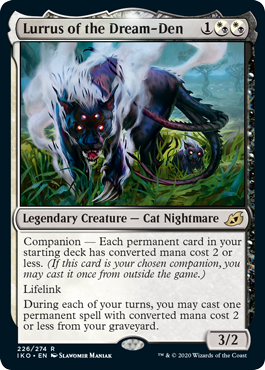
Lurrus of the Dream Den
{1}{w/b}{w/b}
Legendary Creature — Cat Nightmare
3/2
Companion — Each permanent card in your starting deck has converted mana cost 2 or less. (If this card is your chosen companion, you may cast it once from outside the game.)
Lifelink
During each of your turns, you may cast one permanent spell with converted mana cost 2 or less from your graveyard.
- Lurrus doesn't care about instant and sorcery cards in your starting deck. They may have any converted mana cost.
- If a card in a player's deck has {X} in its mana cost, X is considered to be 0.
- For spells with {X} in their mana costs, use the value chosen for X to determine the spell's converted mana cost. For example, if a permanent spell costs {X}{W}, you could cast it with X as 1 but not as 2.
- You must follow the normal timing permissions and restrictions of the spell you cast from your graveyard.
- You must pay the costs to cast that spell. If it has an alternative cost, such as a mutate cost, you may cast it for that cost instead.
- Once you begin to cast the spell, losing control of Lurrus won't affect the spell. You can finish casting it as normal.
- If you cast a spell from your graveyard using another permission, Lurrus's effect doesn't apply. You can cast another permanent spell from your graveyard.
- If you cast one permanent spell from your graveyard and then have a new Lurrus come under your control in the same turn, you may cast another permanent spell from your graveyard that turn.
- If a permanent card is put into your graveyard during your main phase and the stack is empty, you have a chance to cast it before any player may attempt to remove that card from your graveyard.
- Lurrus doesn't let you play lands from your graveyard.
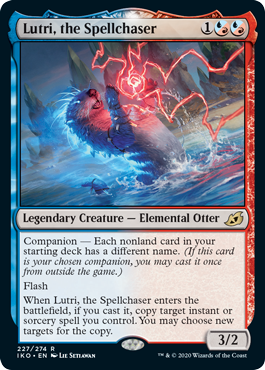
Lutri, the Spellchaser
{1}{u/r}{u/r}
Legendary Creature — Elemental Otter
3/2
Companion — Each nonland card in your starting deck has a different name. (If this card is your chosen companion, you may cast it once from outside the game.)
Flash
When Lutri, the Spellchaser enters the battlefield, if you cast it, copy target instant or sorcery spell you control. You may choose new targets for the copy.
- Lutri's ability can copy any instant or sorcery spell you control, not just one with targets.
- The copy is created on the stack, so it's not "cast." Abilities that trigger when a player casts a spell won't trigger. It will resolve before the original spell does.
- The copy will have the same targets as the spell it's copying unless you choose new ones. You may change any number of the targets, including all of them or none of them. If, for one of the targets, you can't choose a new legal target, then it remains unchanged (even if the current target is illegal).
- If the spell that's copied is modal (that is, it says "Choose one —" or the like), the copy will have the same mode. A different mode can't be chosen.
- If the spell that's copied has an X whose value was determined as it was cast, the copy will have the same value of X.
- If the spell has damage divided as it was cast (like Mythos of Vadrok), the division can't be changed, although the targets receiving that damage still can. The same is true of spells that distribute counters.
- The controller of a copy can't choose to pay any alternative or additional costs for the copy. However, effects based on any alternative or additional costs that were paid for the original spell are copied as though those same costs were paid for the copy.
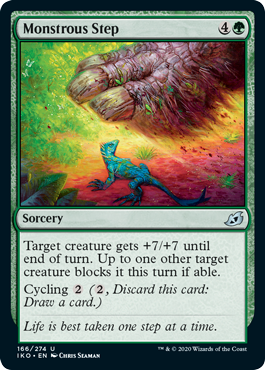
Monstrous Step
{4}{G}
Sorcery
Target creature gets +7/+7 until end of turn. Up to one other target creature blocks it this turn if able.
Cycling {2} ({2}, Discard this card: Draw a card.)
- If the second target creature can't block the first target creature for any reason (such as being tapped), then it doesn't block. If there's a cost associated with having it block the creature, the player isn't forced to pay that cost, so it doesn't have to block in that case either. That creature is free to block another creature or to not block at all.
- If a creature is required to block a creature with menace, another creature must also block that creature if able. If none can, the creature that's required to block can block another creature or not block at all.
- Creatures other than the second target creature may still block the first target creature if able.
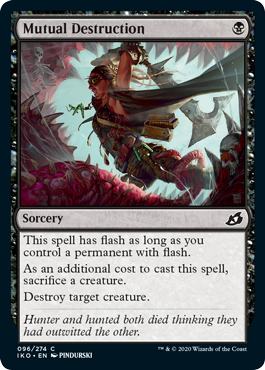
Mutual Destruction
{B}
Sorcery
This spell has flash as long as you control a permanent with flash.
As an additional cost to cast this spell, sacrifice a creature.
Destroy target creature.
- Once you announce that you're casting Mutual Destruction, players can't try to remove your permanents with flash to make it lose flash until you're done casting it. If it loses flash after it's been cast, it will still resolve if able.
- You must sacrifice exactly one creature to cast this spell; you cannot cast it without sacrificing a creature, and you cannot sacrifice additional creatures.
- The last time that the game checks whether you have permission to cast a spell is before costs are paid. If you sacrifice a creature with flash to cast Mutual Destruction and then have no other permanents with flash, you'll legally finish casting Mutual Destruction even though it no longer has flash. In this case, abilities that trigger whenever you cast a spell with flash won't trigger.
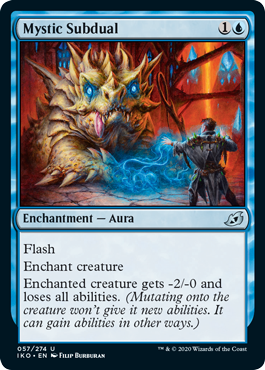
Mystic Subdual
{1}{U}
Enchantment — Aura
Flash
Enchant creature
Enchanted creature gets -2/-0 and loses all abilities. (Mutating onto the creature won't give it new abilities. It can gain abilities in other ways.)
- If the affected creature gains an ability after Mystic Subdual becomes attached to it, it will keep that ability.
- If a creature has power and toughness written as */* with an ability that defines its power and toughness, its base power and toughness become 0/0 when it loses all abilities. Mystic Subdual then makes it a -2/0. If its power and toughness are written as */*+1, it's -2/1, and so on.
- Mutating the enchanted creature won't cause it to gain abilities. This is because mutate modifies the creature's base characteristics, while Mystic Subdual applies to the resulting creature.
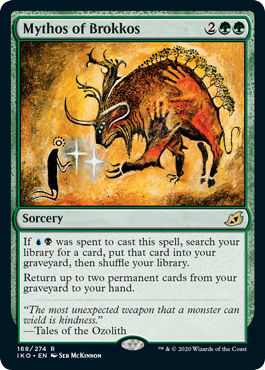
Mythos of Brokkos
{2}{G}{G}
Sorcery
If {U}{B} was spent to cast this spell, search your library for a card, put that card into your graveyard, then shuffle your library.
Return up to two permanent cards from your graveyard to your hand.
- Because Mythos of Brokkos doesn't target the permanent cards in your graveyard, you may choose the card you searched for.
- A permanent card is an artifact, creature, enchantment, land, or planeswalker card.
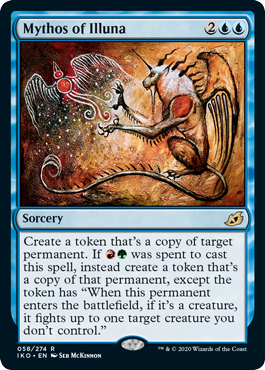
Mythos of Illuna
{2}{U}{U}
Sorcery
Create a token that's a copy of target permanent. If {R}{G} was spent to cast this spell, instead create a token that's a copy of that permanent, except the token has "When this permanent enters the battlefield, if it's a creature, it fights up to one target creature you don't control."
- The token copies exactly what is printed on the permanent and nothing else (unless that permanent is copying something else or is a token; see below). It doesn't copy whether that permanent is tapped or untapped, whether it has any counters on it or Auras and/or Equipment attached to it, or any non-copy effects that changed its power, toughness, types, color, and so on.
- If the copied permanent has {X} in its mana cost, X is 0.
- If the copied permanent is copying something else, the token enters the battlefield as whatever that permanent is copying.
- If the copied permanent is itself a token, the token created by Mythos of Illuna copies the original characteristics of that token as stated by the effect that created it.
- Any enters-the-battlefield abilities of the copied permanent will trigger when the token enters the battlefield. Any "As [this permanent] enters the battlefield" or "[This permanent] enters the battlefield with" abilities of the copied permanent will also work.
- If an Aura is put onto the battlefield without being cast, such as by being created as a token, the Aura's controller-to-be chooses what it will enchant as it enters the battlefield. An Aura put onto the battlefield this way doesn't target anything (so it could be attached to an opponent's permanent with hexproof, for example), but the Aura's enchant ability restricts what it can be attached to. If an Aura token can't legally be attached to anything, it isn't created.
- If {R}{G} was spent to cast the spell, the token has the extra ability. If something copies the token later, the copy will also have that ability.
- If the token isn't a creature immediately after it enters the battlefield, the granted ability won't trigger. You can't take actions to make that token into a creature after it has entered the battlefield.
- If the target creature is an illegal target or if the token is no longer a creature when the token's granted ability tries to resolve, the ability doesn't resolve. If it's a legal target but the token is no longer on the battlefield when the ability resolves, the target creature won't deal or be dealt damage.
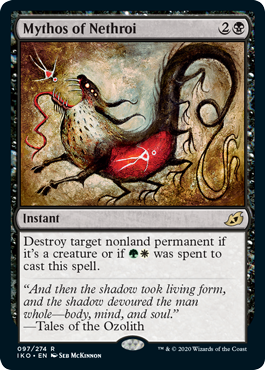
Mythos of Nethroi
{2}{B}
Instant
Destroy target nonland permanent if it's a creature or if {G}{W} was spent to cast this spell.
- Mythos of Nethroi can target any nonland permanent. Determine as the spell resolves whether the permanent is destroyed, either because it's a creature at that time or because {G}{W} was spent to cast the spell.
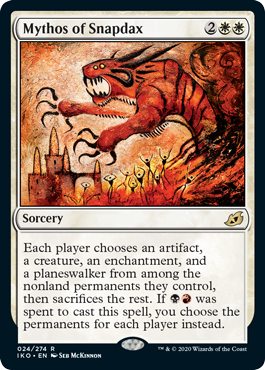
Mythos of Snapdax
{2}{W}{W}
Sorcery
Each player chooses an artifact, a creature, an enchantment, and a planeswalker from among the nonland permanents they control, then sacrifices the rest. If {B}{R} was spent to cast this spell, you choose the permanents for each player instead.
- If you control a permanent with more than one type, you may choose it for each of those types. For example, you could choose an artifact creature as the artifact you keep and also as the creature you keep.
- If you're choosing the permanents for each player, your choices must still be legal. For example, you can't decline to choose a creature a player will keep if that player controls a creature.
- As Mythos of Snapdax resolves, first you choose which permanents you control won't be sacrificed, then each other player in turn order does the same, knowing the choices made before them. Then each nonland permanent not chosen is sacrificed at the same time.
- Lands with another permanent type can't be chosen and won't be sacrificed.

Mythos of Vadrok
{2}{R}{R}
Sorcery
Mythos of Vadrok deals 5 damage divided as you choose among any number of target creatures and/or planeswalkers. If {W}{U} was spent to cast this spell, until your next turn, those permanents can't attack or block and their activated abilities can't be activated.
- Each chosen target must receive at least 1 damage.
- If some of the targets become illegal for Mythos of Vadrok, the original division of damage still applies, but the damage that would have been dealt to illegal targets isn't dealt at all.
- Activated abilities contain a colon. They're generally written "[Cost]: [Effect]." Some keyword abilities are activated abilities and will have colons in their reminder text. Triggered abilities (starting with "when," "whenever," or "at") are unaffected by Mythos of Vadrok.
- The target creatures and planeswalkers will be unable to attack, block, or have their abilities activated even if the damage that would be dealt to them is prevented. However, if one of those permanents becomes an illegal target, it will be able to attack, block, and have its abilities activated.
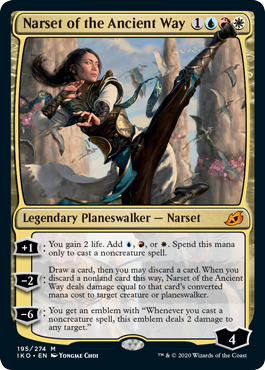
Narset of the Ancient Way
{1}{U}{R}{W}
Legendary Planeswalker — Narset
4
+1: You gain 2 life. Add {U}, {R}, or {W}. Spend this mana only to cast a noncreature spell.
−2: Draw a card, then you may discard a card. When you discard a nonland card this way, Narset of the Ancient Way deals damage equal to that card's converted mana cost to target creature or planeswalker.
−6: You get an emblem with "Whenever you cast a noncreature spell, this emblem deals 2 damage to any target."
- Because it's a loyalty ability, Narset's first ability isn't a mana ability. It can be activated only any time you could cast a sorcery. It uses the stack and can be responded to.
- Narset's second ability goes on the stack without a target. While that ability is resolving, you draw a card and may choose to discard a card. When you discard a nonland card this way, the reflexive triggered ability triggers and you pick a target to be dealt damage. This is different from effects that say "If you do . . ." in that you choose a target after looking at the card you draw and players can respond to the reflexive triggered ability knowing how much damage will be dealt.
- You can discard a card even if Narset leaves the battlefield before her middle ability resolves. The reflexive triggered ability will still trigger if you discard a nonland card.
- If a card you discard has {X} in its mana cost, X is considered to be 0.
- An ability that triggers when a player casts a spell resolves before the spell that caused it to trigger. It resolves even if that spell is countered.
- The emblem created by Narset's last ability is colorless. The damage it deals is from a colorless source.
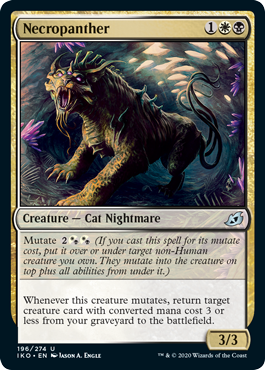
Necropanther
{1}{W}{B}
Creature — Cat Nightmare
3/3
Mutate {2}{w/b}{w/b} (If you cast this spell for its mutate cost, put it over or under target non-Human creature you own. They mutate into the creature on top plus all abilities from under it.)
Whenever this creature mutates, return target creature card with converted mana cost 3 or less from your graveyard to the battlefield.
- If a card in a player's graveyard has {X} in its mana cost, X is considered to be 0.
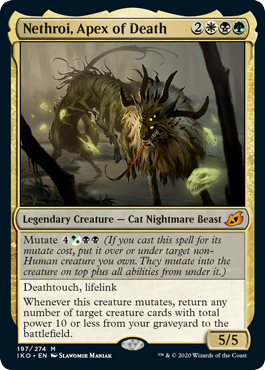
Nethroi, Apex of Death
{2}{W}{B}{G}
Legendary Creature — Cat Nightmare Beast
5/5
Mutate {4}{g/w}{B}{B} (If you cast this spell for its mutate cost, put it over or under target non-Human creature you own. They mutate into the creature on top plus all abilities from under it.)
Deathtouch, lifelink
Whenever this creature mutates, return any number of target creature cards with total power 10 or less from your graveyard to the battlefield.
- Nethroi's triggered ability can return any combination of creatures whose powers total 10 or less. For example, it could target ten 1/1 creature cards, two 5/5 creature cards, and so on. Regardless of what other creature cards you choose as targets, you can also choose any number of creature cards with power 0 as targets.
- Use the power of the creature cards as they exist in your graveyard to determine whether they can be the targets of Nethroi's triggered ability. For example, a 0/0 creature card that will enter the battlefield as a copy of a 15/15 creature can be returned, as can five 0/0 creature cards that will each enter the battlefield with three +1/+1 counters on them.
- If the power of the target creature cards change while in your graveyard, most likely because one has a characteristic-defining ability that defines a * in its power, the total power of the creatures may become greater than 10. If this happens, the entire selection of targets is illegal and nothing is returned to the battlefield.
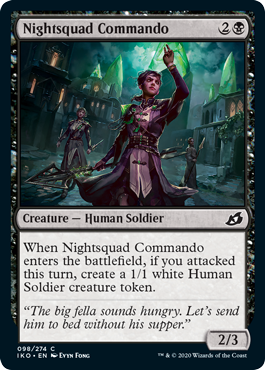
Nightsquad Commando
{2}{B}
Creature — Human Soldier
2/3
When Nightsquad Commando enters the battlefield, if you attacked this turn, create a 1/1 white Human Soldier creature token.
- Nightsquad Commando's ability checks only whether you declared an attacking creature during the turn. It doesn't trigger once for each such creature, and it doesn't check whether any attacking creatures dealt damage.
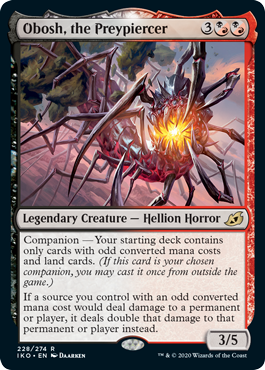
Obosh, the Preypiercer
{3}{b/r}{b/r}
Legendary Creature — Hellion Horror
3/5
Companion — Your starting deck contains only cards with odd converted mana costs and land cards. (If this card is your chosen companion, you may cast it once from outside the game.)
If a source you control with an odd converted mana cost would deal damage to a permanent or player, it deals double that damage to that permanent or player instead.
- If a card in a player's library has {X} in its mana cost, X is considered to be 0.
- For spells with {X} in their mana costs, use the value chosen for X to determine the spell's converted mana cost. If a permanent or card in any other zone has {X} in its mana cost, X is considered to be 0.
- If a creature with trample you control would deal combat damage to a blocking creature while you control Obosh, you must assign its unmodified damage. For example, a 3/3 creature with trample blocked by a 2/2 creature can have 1 damage assigned to the defending player. It will then deal 4 damage to the blocking creature and 2 damage to the defending player.
- If an effect such as that of Ravenous Gigantotherium asks you to divide damage among targets, you must divide the unmodified damage before doubling it.
- If multiple replacement or prevention effects try to modify damage that would be dealt to a permanent or player, the player or the controller of the permanent chooses the order in which they apply.
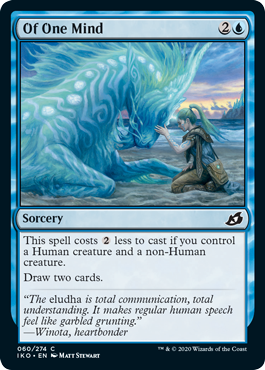
Of One Mind
{2}{U}
Sorcery
This spell costs {2} less to cast if you control a Human creature and a non-Human creature.
Draw two cards.
- To determine the total cost of a spell, start with the mana cost or alternative cost you're paying, add any cost increases, then apply any cost reductions (such as that of Of One Mind). The converted mana cost of the spell remains unchanged, no matter what the total cost to cast it was.
- Once you announce that you're casting Of One Mind, no player may take actions until the spell has been paid for. Notably, opponents can't try to change whether you control a Human and a non-Human creature.
- Of One Mind is unaffected if you no longer control a Human and non-Human creature after you've cast it.
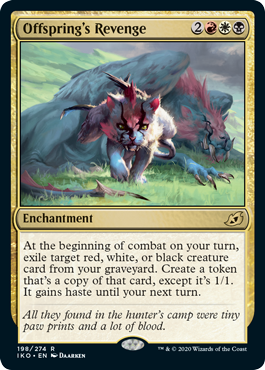
Offspring's Revenge
{2}{R}{W}{B}
Enchantment
At the beginning of combat on your turn, exile target red, white, or black creature card from your graveyard. Create a token that's a copy of that card, except it's 1/1. It gains haste until your next turn.
- The token copies exactly what was printed on the original card and nothing else, except the characteristics it specifically modifies. It doesn't copy any information about the object the card was before it was put into your graveyard.
- The token's power and toughness are 1/1. These are copiable values of the token that other effects may copy. If the copied card has an ability that defines its power or toughness, that ability isn't copied. On the other hand, gaining haste after the token has been created is not a copiable value.
- If the card copied by the token had any "when [this permanent] enters the battlefield" abilities, then the token also has those abilities and will trigger them when it's created. Similarly, any "as [this permanent] enters the battlefield" or "[this permanent] enters the battlefield with" abilities that the token has copied will also work.
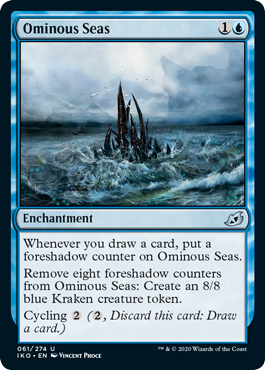
Ominous Seas
{1}{U}
Enchantment
Whenever you draw a card, put a foreshadow counter on Ominous Seas.
Remove eight foreshadow counters from Ominous Seas: Create an 8/8 blue Kraken creature token.
Cycling {2} ({2}, Discard this card: Draw a card.)
- If a spell or ability causes you to put cards into your hand without specifically using the word "draw," it's not a card drawn.
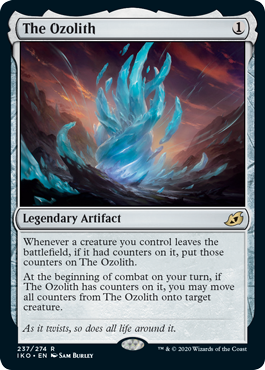
The Ozolith
{1}
Legendary Artifact
Whenever a creature you control leaves the battlefield, if it had counters on it, put those counters on The Ozolith.
At the beginning of combat on your turn, if The Ozolith has counters on it, you may move all counters from The Ozolith onto target creature.
- The Ozolith's first ability doesn't move counters off the creature that's left the battlefield. Instead, it causes you to put a number of counters of each kind of counter that was on that creature onto The Ozolith. Notably, if you somehow control a second The Ozolith, each one will receive the same number and kinds of counters that were on the creature that left the battlefield. Similarly, if the creature has an ability that triggers when it leaves the battlefield that refers to the number of counters it had, that ability will use the number of counters that were on the permanent, even if The Ozolith's first ability resolves first.
- +1/+1 counters on The Ozolith have no effect unless it becomes a creature. Keyword counters on The Ozolith will grant it keywords that may have no practical effect. For example, flying on a noncreature artifact is just strange, but hexproof on a noncreature artifact is entirely useful.
- As The Ozolith's last ability resolves, you choose whether to move the counters.
- You can't move only some of the counters from The Ozolith onto the target creature.
- If the target creature is an illegal target by the time The Ozolith's last ability tries to resolve, the ability won't resolve. You won't remove any counters from The Ozolith.
- If The Ozolith leaves the battlefield after the last ability triggers but before it resolves, you can't move any counters from it onto the target creature.
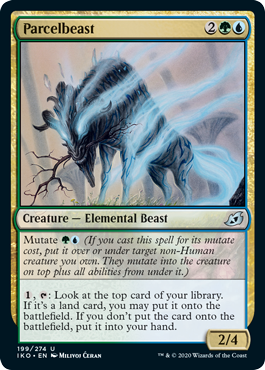
Parcelbeast
{2}{G}{U}
Creature — Elemental Beast
2/4
Mutate {G}{U} (If you cast this spell for its mutate cost, put it over or under target non-Human creature you own. They mutate into the creature on top plus all abilities from under it.)
{1}, {T}: Look at the top card of your library. If it's a land card, you may put it onto the battlefield. If you don't put the card onto the battlefield, put it into your hand.
- Parcelbeast's effect doesn't count as playing a land. It can put a land card onto the battlefield even if you've already played your land for the turn.
- If you don't put the top card of your library onto the battlefield, you put it into your hand without revealing it.
- If the top card of your library is a land card, you may just put it into your hand instead of putting it onto the battlefield. If you do, you don't reveal that it's a land card.
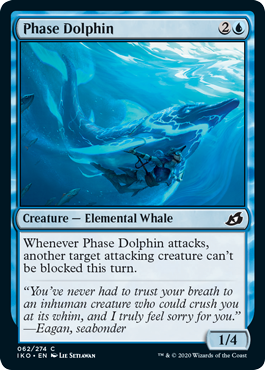
Phase Dolphin
{2}{U}
Creature — Elemental Whale
1/4
Whenever Phase Dolphin attacks, another target attacking creature can't be blocked this turn.
- If two Phase Dolphins attack at the same time, their abilities can target each other.
- The target creature can't be blocked this turn even if Phase Dolphin leaves the battlefield.
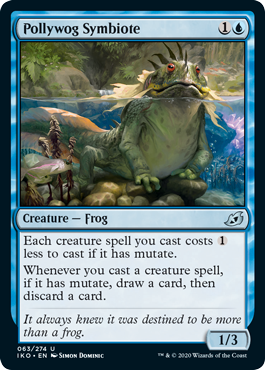
Pollywog Symbiote
{1}{U}
Creature — Frog
1/3
Each creature spell you cast costs {1} less to cast if it has mutate.
Whenever you cast a creature spell, if it has mutate, draw a card, then discard a card.
- Pollywog Symbiote's first ability applies to creature spells you cast that have mutate even if you don't cast them for their mutate cost. Similarly, its second ability triggers even if the creature spell with mutate was cast for a cost other than its mutate cost.
- Effects that reduce the generic mana cost of a spell (such as that of Pollywog Symbiote) can't reduce that spell's colored mana requirements.
- An ability that triggers when a player casts a spell resolves before the spell that caused it to trigger. It resolves even if that spell is countered.
- Players can cast spells and activate abilities after the triggered ability resolves but before the spell that caused it to trigger does.
- You draw a card and discard a card all while Pollywog Symbiote's ability is resolving. Nothing can happen between the two, and no player may choose to take actions.
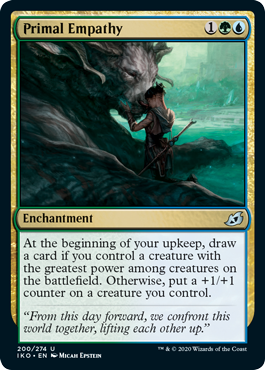
Primal Empathy
{1}{G}{U}
Enchantment
At the beginning of your upkeep, draw a card if you control a creature with the greatest power among creatures on the battlefield. Otherwise, put a +1/+1 counter on a creature you control.
- You determine whether you draw a card or put a +1/+1 counter only as Primal Empathy's triggered ability begins resolving. Players may respond to the ability to try to change which happens.
- If the greatest power among creatures on the battlefield is shared by a creature you control and a creature you don't control, you draw a card.
- If you don't control a creature with the greatest power, you choose which creature gets a +1/+1 counter while the ability is resolving. Players can't take actions in between the time you make this choice and the time that creature has a +1/+1 counter.
- If you control no creatures, you do nothing as Primal Empathy's ability resolves. If there are no creatures on the battlefield at all, you don't draw a card.
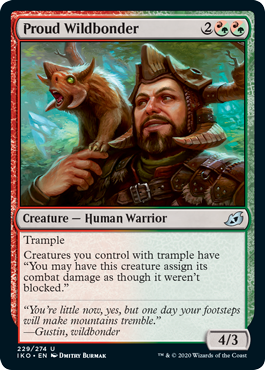
Proud Wildbonder
{2}{r/g}{r/g}
Creature — Human Warrior
4/3
Trample
Creatures you control with trample have "You may have this creature assign its combat damage as though it weren't blocked."
- Proud Wildbonder's last ability applies to itself as long as it still has trample.
- You can decide to assign combat damage to the defending player or planeswalker even if the blocking creature has protection from green or other damage prevention effects applying to it.
- When assigning combat damage, you choose whether you want to assign all damage to blocking creatures and assign trample damage from that as normal, or if you want to assign all of it to the player or planeswalker the creature is attacking. You can't assign some damage to one blocker then skip other blockers.
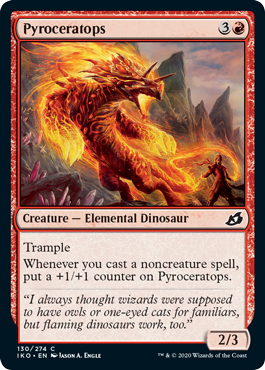
Pyroceratops
{3}{R}
Creature — Elemental Dinosaur
2/3
Trample
Whenever you cast a noncreature spell, put a +1/+1 counter on Pyroceratops.
- An ability that triggers when a player casts a spell resolves before the spell that caused it to trigger. It resolves even if that spell is countered.
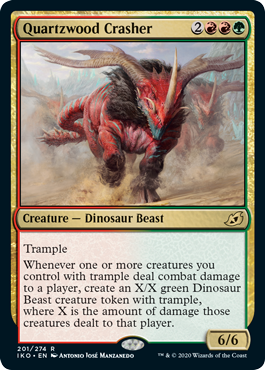
Quartzwood Crasher
{2}{R}{R}{G}
Creature — Dinosaur Beast
6/6
Trample
Whenever one or more creatures you control with trample deal combat damage to a player, create an X/X green Dinosaur Beast creature token with trample, where X is the amount of damage those creatures dealt to that player.
- Quartzwood Crasher's second ability includes damage dealt by Quartzwood Crasher itself as long as it still has trample.
- If a creature you control with trample is unblocked, the full amount of combat damage it deals to the defending player is counted by Quartzwood Crasher's last ability.
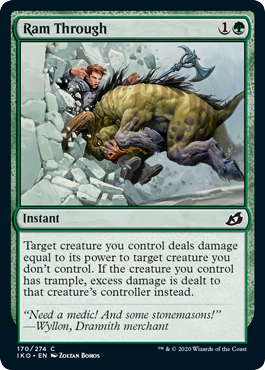
Ram Through
{1}{G}
Instant
Target creature you control deals damage equal to its power to target creature you don't control. If the creature you control has trample, excess damage is dealt to that creature's controller instead.
- If either creature is an illegal target as Ram Through tries to resolve, the creature you control won't deal damage to any creature or player.
- Excess damage caused by a spell or ability is similar to how combat damage from a creature with trample is handled. Start with the amount of damage being dealt to the creature and determine what is "lethal." This is the creature's toughness minus the amount of damage that it already has marked on it, but ignoring any replacement or prevention effects that will modify this damage. Also ignore whether the creature has an ability such as indestructible that will result in it not being destroyed by this damage.
- If the target creature you control has deathtouch, 1 damage from it is lethal.
- Once you've determined how much damage is excess, the creature you control simultaneously deals damage to the creature and to its controller. This damage may be modified by replacement or prevention effects.
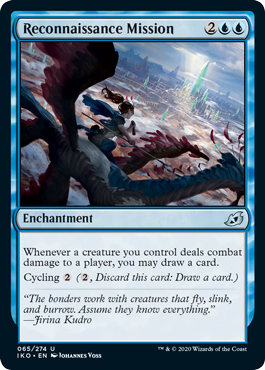
Reconnaissance Mission
{2}{U}{U}
Enchantment
Whenever a creature you control deals combat damage to a player, you may draw a card.
Cycling {2} ({2}, Discard this card: Draw a card.)
- Reconnaissance Mission's triggered ability triggers for each creature you control that deals combat damage to a player. You may draw one card each time the ability resolves, no matter how much damage was dealt.
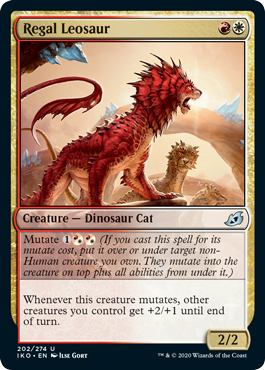
Regal Leosaur
{R}{W}
Creature — Dinosaur Cat
2/2
Mutate {1}{r/w}{r/w} (If you cast this spell for its mutate cost, put it over or under target non-Human creature you own. They mutate into the creature on top plus all abilities from under it.)
Whenever this creature mutates, other creatures you control get +2/+1 until end of turn.
- Regal Leosaur's last ability affects only other creatures you control at the time it resolves. Creatures you begin to control later in the turn won't get +2/+1.
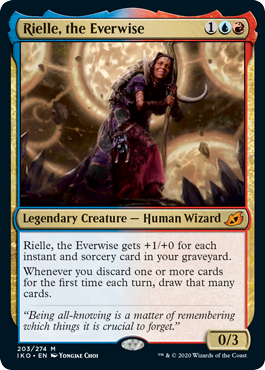
Rielle, the Everwise
{1}{U}{R}
Legendary Creature — Human Wizard
0/3
Rielle, the Everwise gets +1/+0 for each instant and sorcery card in your graveyard.
Whenever you discard one or more cards for the first time each turn, draw that many cards.
- Rielle's first ability applies only while it's on the battlefield.
- If you discard a card as a cost to cast a spell or activate an ability, Rielle's triggered ability resolves before that spell or ability but after you've chosen targets for it. If you discard a card while a spell or ability is resolving, that spell or ability finishes resolving before Rielle's triggered ability does.'
- If the first time you discard cards during your turn is due to having too many cards in hand during your cleanup step, you'll draw that many cards. Players will receive priority during the cleanup step in this case, and a new cleanup step will happen after that one, during which you may have to discard cards again.
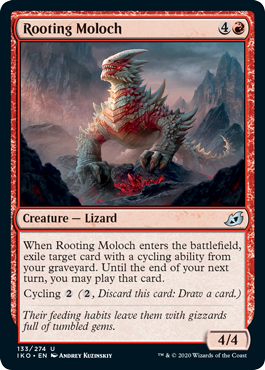
Rooting Moloch
{4}{R}
Creature — Lizard
4/4
When Rooting Moloch enters the battlefield, exile target card with a cycling ability from your graveyard. Until the end of your next turn, you may play that card.
Cycling {2} ({2}, Discard this card: Draw a card.)
- Rooting Moloch gives you permission to play the card as a land or cast it as a spell. You can't cycle the exiled card.
- You must follow the normal timing permissions and restrictions for the exiled card. If it's a land, you can't play it unless you have land plays available.
- You'll still pay all costs for a spell cast this way, including additional costs. You may also pay alternative costs if any are available.
- If you don't play the exiled card, it remains exiled.
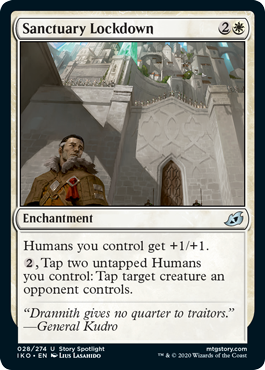
Sanctuary Lockdown
{2}{W}
Enchantment
Humans you control get +1/+1.
{2}, Tap two untapped Humans you control: Tap target creature an opponent controls.
- Because damage remains marked on a creature until the damage is removed as the turn ends, nonlethal damage dealt to a Human you control may become lethal if Sanctuary Lockdown leaves the battlefield during that turn.
- Since Sanctuary Lockdown's activated ability doesn't have a tap symbol in its cost, you can tap creatures that haven't been under your control since your most recent turn began to pay the cost.
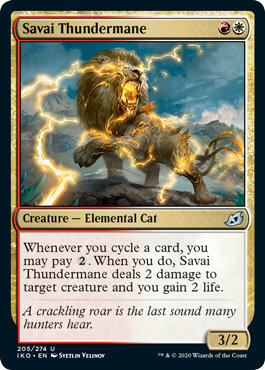
Savai Thundermane
{R}{W}
Creature — Elemental Cat
3/2
Whenever you cycle a card, you may pay {2}. When you do, Savai Thundermane deals 2 damage to target creature and you gain 2 life.
- While resolving Savai Thundermane's triggered ability, you can't pay {2} more than once to have it deal more damage or gain more life.
- If you pay {2} while Savai Thundermane's triggered ability is resolving, the reflexive triggered ability triggers and will resolve separately. This is different from effects that say "If you do . . ." in that players may take actions after you've paid mana but before damage is dealt.
- If the target creature is an illegal target by the time Savai Thundermane's reflexive triggered ability tries to resolve, the ability won't resolve. You won't gain 2 life.
- You can pay {2} even if Savai Thundermane leaves the battlefield before its triggered ability resolves. The reflexive triggered ability will still trigger if you do.
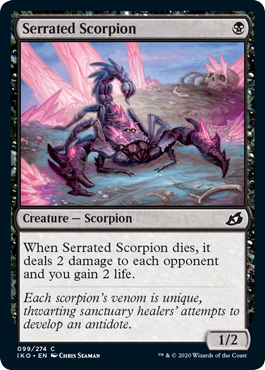
Serrated Scorpion
{B}
Creature — Scorpion
1/2
When Serrated Scorpion dies, it deals 2 damage to each opponent and you gain 2 life.
- In a Two-Headed Giant game, Serrated Scorpion's ability causes the opposing team to lose 4 life and you to gain 2 life.
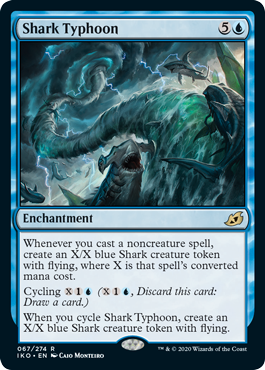
Shark Typhoon
{5}{U}
Enchantment
Whenever you cast a noncreature spell, create an X/X blue Shark creature token with flying, where X is that spell's converted mana cost.
Cycling {X}{1}{U} ({X}{1}{U}, Discard this card: Draw a card.)
When you cycle Shark Typhoon, create an X/X blue Shark creature token with flying.
- An ability that triggers when a player casts a spell resolves before the spell that caused it to trigger. It resolves even if that spell is countered.
- For spells with {X} in their mana costs, use the value chosen for X to determine the spell's converted mana cost.
- You can choose 0 as the value of X in Shark Typhoon's cycling cost. The last ability will trigger, and you'll create a 0/0 blue Shark creature token with flying. Unless something else is raising its toughness, the Shark will then immediately die.
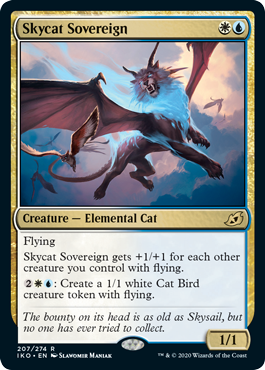
Skycat Sovereign
{W}{U}
Creature — Elemental Cat
1/1
Flying
Skycat Sovereign gets +1/+1 for each other creature you control with flying.
{2}{W}{U}: Create a 1/1 white Cat Bird creature token with flying.
- Skycat Sovereign's first ability applies only while it's on the battlefield.
- Because damage remains marked on a creature until the damage is removed as the turn ends, nonlethal damage dealt to Skycat Sovereign may become lethal if other creatures with flying you control leave the battlefield during that turn.
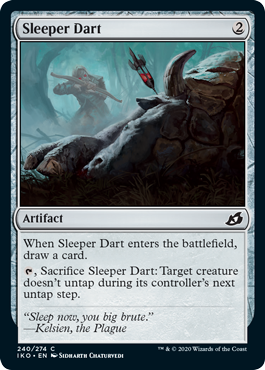
Sleeper Dart
{2}
Artifact
When Sleeper Dart enters the battlefield, draw a card.
{T}, Sacrifice Sleeper Dart: Target creature doesn't untap during its controller's next untap step.
- Sleeper Dart's second ability doesn't tap the creature. It can target any creature, tapped or untapped. If that creature is already untapped at the beginning of its controller's next untap step, the effect won't do anything.
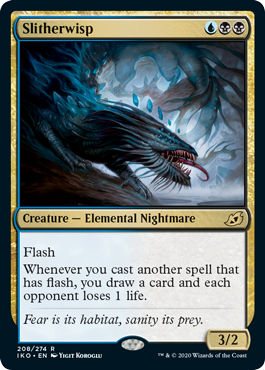
Slitherwisp
{U}{B}{B}
Creature — Elemental Nightmare
3/2
Flash
Whenever you cast another spell that has flash, you draw a card and each opponent loses 1 life.
- If an effect allows you to cast a spell "as though" it has flash, Slitherwisp's last ability won't trigger.
- An ability that triggers when a player casts a spell resolves before the spell that caused it to trigger. It resolves even if that spell is countered.
- Players can cast spells and activate abilities after the triggered ability resolves but before the spell that caused it to trigger does.
- In a Two-Headed Giant game, Slitherwisp's last ability causes the opposing team to lose 2 life and you to draw one card.
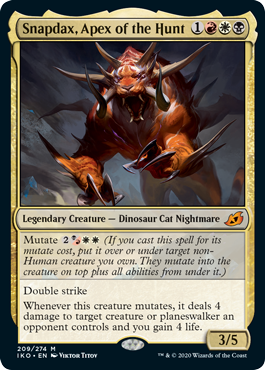
Snapdax, Apex of the Hunt
{1}{R}{W}{B}
Legendary Creature — Dinosaur Cat Nightmare
3/5
Mutate {2}{b/r}{W}{W} (If you cast this spell for its mutate cost, put it over or under target non-Human creature you own. They mutate into the creature on top plus all abilities from under it.)
Double strike
Whenever this creature mutates, it deals 4 damage to target creature or planeswalker an opponent controls and you gain 4 life.
- If there is no legal target for Snapdax's triggered ability when it triggers, it won't be put onto the stack at all and you won't gain 4 life. Similarly, if the target creature or planeswalker is an illegal target by the time the ability tries to resolve, the ability won't resolve and you won't gain 4 life.
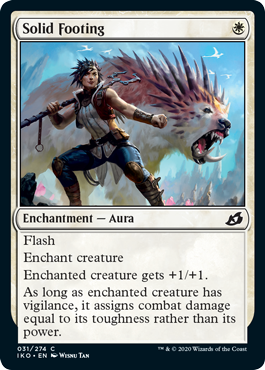
Solid Footing
{W}
Enchantment — Aura
Flash
Enchant creature
Enchanted creature gets +1/+1.
As long as enchanted creature has vigilance, it assigns combat damage equal to its toughness rather than its power.
- Solid Footing's last ability doesn't change the enchanted creature's power; it changes only the amount of combat damage that creature assigns. All other rules and effects that check power or toughness use the actual values. For example, if a creature fights while enchanted by Solid Footing, that creature will deal damage equal to its power, not its toughness.
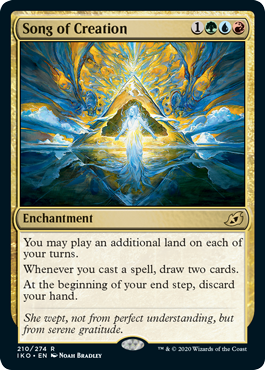
Song of Creation
{1}{G}{U}{R}
Enchantment
You may play an additional land on each of your turns.
Whenever you cast a spell, draw two cards.
At the beginning of your end step, discard your hand.
- Song of Creation's first ability is cumulative if you control more than one. It's also cumulative with other effects that let you play additional lands, such as the one from Dryad of the Ilysian Grove.
- An ability that triggers when a player casts a spell resolves before the spell that caused it to trigger. It resolves even if that spell is countered.
- Song of Creation's second ability doesn't trigger when you cast it because it's not on the battlefield yet.
- Players can cast spells and activate abilities after the first triggered ability resolves but before the spell that caused it to trigger does.
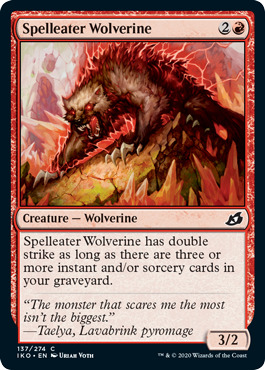
Spelleater Wolverine
{2}{R}
Creature — Wolverine
3/2
Spelleater Wolverine has double strike as long as there are three or more instant and/or sorcery cards in your graveyard.
- If Spelleater Wolverine loses double strike after it deals first-strike damage, it won't deal regular combat damage. If it gains double strike after other creatures have dealt first-strike damage, it won't deal first-strike damage.
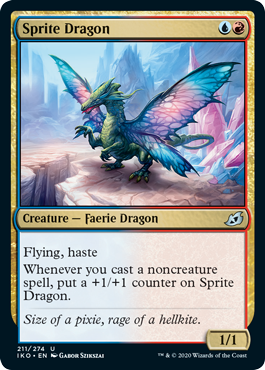
Sprite Dragon
{U}{R}
Creature — Faerie Dragon
1/1
Flying, haste
Whenever you cast a noncreature spell, put a +1/+1 counter on Sprite Dragon.
- An ability that triggers when a player casts a spell resolves before the spell that caused it to trigger. It resolves even if that spell is countered.
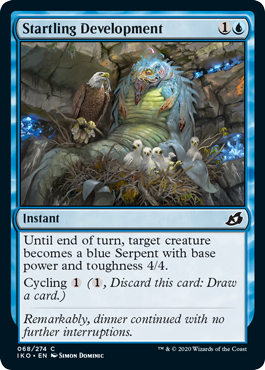
Startling Development
{1}{U}
Instant
Until end of turn, target creature becomes a blue Serpent with base power and toughness 4/4.
Cycling {1} ({1}, Discard this card: Draw a card.)
- Startling Development overwrites all previous effects that set the affected creatures' color, creature types, power, and/or toughness to specific values. Other effects that set these characteristics to specific values that start to apply after Startling Development resolves will overwrite that part of the effect.
- Effects that modify the affected creature's power or toughness without setting it will apply no matter when they started to take effect. The same is true for counters that change the creature's power or toughness.
- The affected creature doesn't lose any abilities when it becomes a Serpent.
- Because damage remains marked on a creature until the damage is removed as the turn ends, nonlethal damage dealt to the target creature may become lethal once its base toughness becomes 4.
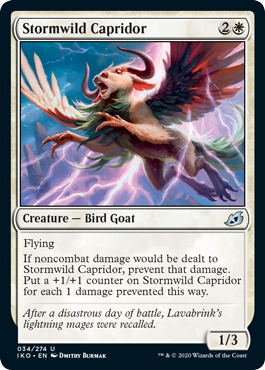
Stormwild Capridor
{2}{W}
Creature — Bird Goat
1/3
Flying
If noncombat damage would be dealt to Stormwild Capridor, prevent that damage. Put a +1/+1 counter on Stormwild Capridor for each 1 damage prevented this way.
- If damage that can't be prevented is dealt to Stormwild Capridor, it doesn't get +1/+1 counters for that damage.
- If damage that can be prevented is dealt to Stormwild Capridor at the same time as damage that can't be prevented, it gets +1/+1 counters for the prevented damage before checking to see if it dies from the damage that couldn't be prevented.
- If multiple replacement or prevention effects try to modify damage that would be dealt to a creature, the controller of the creature chooses the order in which they apply.
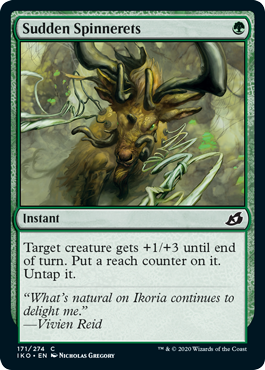
Sudden Spinnerets
{G}
Instant
Target creature gets +1/+3 until end of turn. Put a reach counter on it. Untap it.
- Sudden Spinnerets can target a creature that's already untapped. It will still get +1/+3 and a reach counter.
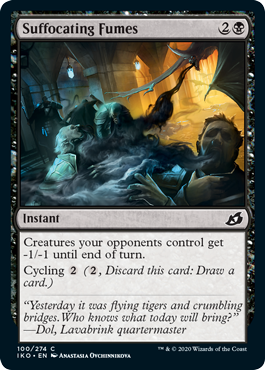
Suffocating Fumes
{2}{B}
Instant
Creatures your opponents control get -1/-1 until end of turn.
Cycling {2} ({2}, Discard this card: Draw a card.)
- Suffocating Fumes affects only creatures your opponents control at the time it resolves. Creatures they begin to control later in the turn won't get -1/-1.
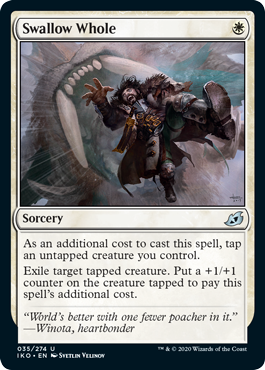
Swallow Whole
{W}
Sorcery
As an additional cost to cast this spell, tap an untapped creature you control.
Exile target tapped creature. Put a +1/+1 counter on the creature tapped to pay this spell's additional cost.
- You must tap exactly one creature to cast Swallow Whole; you can't cast it without tapping a creature, and you can't tap additional creatures.
- You can tap any untapped creature you control, including a creature you haven't controlled continuously since the beginning of your most recent turn, to pay the additional cost.
- The target tapped creature will be exiled even if the creature you tapped leaves the battlefield or becomes untapped before Swallow Whole resolves.
- If the target creature is an illegal target by the time Swallow Whole tries to resolve, the spell won't resolve. You won't put a +1/+1 counter on any creature.
- If an effect copies Swallow Whole, the copy will put a +1/+1 counter on the creature tapped to pay the additional cost of the original spell.
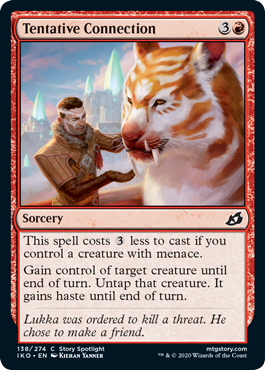
Tentative Connection
{3}{R}
Sorcery
This spell costs {3} less to cast if you control a creature with menace.
Gain control of target creature until end of turn. Untap that creature. It gains haste until end of turn.
- To determine the total cost of a spell, start with the mana cost or alternative cost you're paying, add any cost increases, then apply any cost reductions (such as that of Tentative Connection). The converted mana cost of the spell remains unchanged, no matter what the total cost to cast it was.
- Once you announce that you're casting Tentative Connection, no player may take actions until the spell has been paid for. Notably, opponents can't try to change whether you control a creature with menace.
- Tentative Connection is unaffected if you no longer control a creature with menace after you've cast it. You won't have to pay an additional {3}.
- Tentative Connection can target any creature, even one that you already control or that is already untapped.
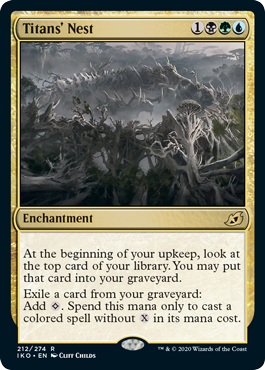
Titans' Nest
{1}{B}{G}{U}
Enchantment
At the beginning of your upkeep, look at the top card of your library. You may put that card into your graveyard.
Exile a card from your graveyard: Add {C}. Spend this mana only to cast a colored spell without {X} in its mana cost.
- If you don't put the card you look at into your graveyard, it remains on top of your library. You'll draw it during your draw step unless something else moves it.
- Mana produced by Titans' Nest can be used to cast a spell that has {X} in an additional or alternative cost.
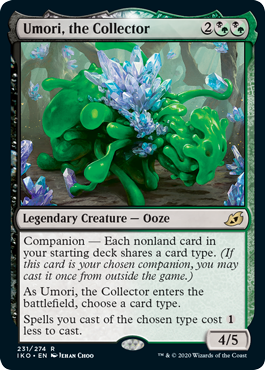
Umori, the Collector
{2}{b/g}{b/g}
Legendary Creature — Ooze
4/5
Companion — Each nonland card in your starting deck shares a card type. (If this card is your chosen companion, you may cast it once from outside the game.)
As Umori, the Collector enters the battlefield, choose a card type.
Spells you cast of the chosen type cost {1} less to cast.
- Artifact, creature, enchantment, instant, planeswalker, and sorcery are card types. Supertypes (such as legendary) and subtypes (such as Ooze) are not.
- To satisfy Umori's companion requirement, there must be one card type that each nonland card in your starting deck has. For example, if every nonland card is an artifact creature, enchantment creature, or creature, it is satisfied; but if you have an artifact creature, an artifact, and a creature, it is not satisfied.
- Land cards in your deck may have any number of additional types that may be shared with other cards or not.
- Effects that reduce the generic mana cost of a spell (such as that of Umori) can't reduce that spell's colored mana requirements.
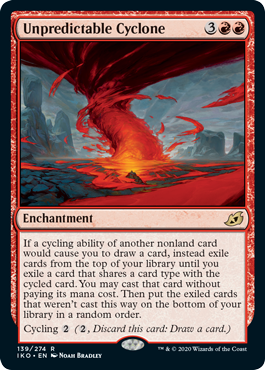
Unpredictable Cyclone
{3}{R}{R}
Enchantment
If a cycling ability of another nonland card would cause you to draw a card, instead exile cards from the top of your library until you exile a card that shares a card type with the cycled card. You may cast that card without paying its mana cost. Then put the exiled cards that weren't cast this way on the bottom of your library in a random order.
Cycling {2} ({2}, Discard this card: Draw a card.)
- Artifact, creature, enchantment, instant, planeswalker, and sorcery are card types. Supertypes (such as legendary) and subtypes (such as Giant) are not.
- If the cycled card has multiple card types, you stop when you exile a card that shares any of those types. You don't exile card to find one that shares all of its types, and you can't choose to keep going to find a different one of those types.
- If you exile your entire library without exiling a card that shares a card type, you put the library back in a random order and continue. You won't draw a card.
- If you wish to cast the last exiled card, you do so as part of the resolution of the cycling ability. You can't wait to cast it later. Timing permissions based on a card's type are ignored.
- If you cast a spell "without paying its mana cost," you can't choose to cast it for any alternative costs. You can, however, pay additional costs, such as kicker costs. If the card has any mandatory additional costs, such as that of Swallow Whole, those must be paid to cast the card.
- If a spell has {X} in its mana cost, you must choose 0 as the value of X when casting it without paying its mana cost.
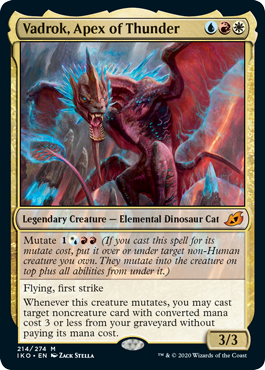
Vadrok, Apex of Thunder
{U}{R}{W}
Legendary Creature — Elemental Dinosaur Cat
3/3
Mutate {1}{w/u}{R}{R} (If you cast this spell for its mutate cost, put it over or under target non-Human creature you own. They mutate into the creature on top plus all abilities from under it.)
Flying, first strike
Whenever this creature mutates, you may cast target noncreature card with converted mana cost 3 or less from your graveyard without paying its mana cost.
- If you wish to cast the target card, you do so as part of the resolution of Vadrok's ability. You can't wait to cast it later. Timing permissions based on a card's type are ignored.
- If you cast a spell "without paying its mana cost," you can't choose to cast it for any alternative costs. You can, however, pay additional costs, such as kicker costs. If the card has any mandatory additional costs, such as that of Swallow Whole, those must be paid to cast the card.
- If a spell has {X} in its mana cost, you must choose 0 as the value of X when casting it without paying its mana cost.
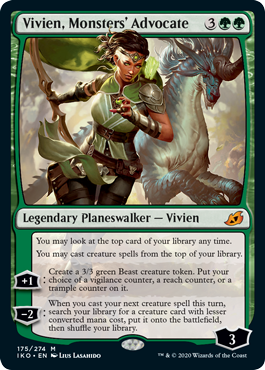
Vivien, Monsters' Advocate
{3}{G}{G}
Legendary Planeswalker — Vivien
3
You may look at the top card of your library any time.
You may cast creature spells from the top of your library.
+1: Create a 3/3 green Beast creature token. Put your choice of a vigilance counter, a reach counter, or a trample counter on it.
−2: When you cast your next creature spell this turn, search your library for a creature card with lesser converted mana cost, put it onto the battlefield, then shuffle your library.
- Vivien lets you look at the top card of your library whenever you want (with one restriction; see below), even if you don't have priority. This action doesn't use the stack. Knowing what that card is becomes part of the information you have access to, just like you can look at the cards in your hand.
- If the top card of your library changes while you're casting a spell, playing a land, or activating an ability, you can't look at the new top card until you finish doing so. This means that if you cast the top card of your library, you can't look at the next one until you're done paying for that spell.
- Normally, Vivien allows you to cast the top card of your library if it's a creature card, it's your main phase, and the stack is empty. If that creature card has flash, you'll be able to cast it any time you could cast an instant, even on an opponent's turn.
- You'll still pay all costs for that spell, including additional costs. You may also pay alternative costs such as mutate costs.
- The top card of your library isn't in your hand, so you can't cycle it, discard it, or activate any of its activated abilities.
- After activating Vivien's last loyalty ability, the delayed triggered ability it creates will put a creature card onto the battlefield before the creature spell that caused the ability to trigger resolves.
- For spells with {X} in their mana costs, use the value chosen for X to determine the spell's converted mana cost.
- If a card in a player's library has {X} in its mana cost, X is considered to be 0.
- If you cast a mutating creature spell, you must choose a target for it before the triggered ability from Vivien's last ability puts a creature onto the battlefield. The creature you find can't be the target of the mutating creature spell.
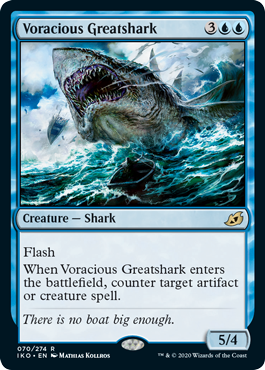
Voracious Greatshark
{3}{U}{U}
Creature — Shark
5/4
Flash
When Voracious Greatshark enters the battlefield, counter target artifact or creature spell.
- You can cast Voracious Greatshark without a target for its enters-the-battlefield triggered ability. That ability will simply not happen. It won't cause Voracious Greatshark to counter itself. It's not that hungry.
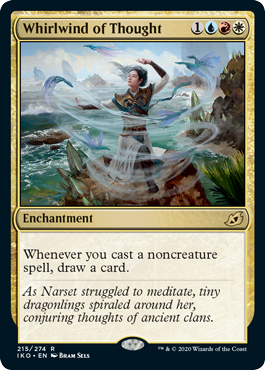
Whirlwind of Thought
{1}{U}{R}{W}
Enchantment
Whenever you cast a noncreature spell, draw a card.
- An ability that triggers when a player casts a spell resolves before the spell that caused it to trigger. It resolves even if that spell is countered.
- Players can cast spells and activate abilities after the triggered ability resolves but before the spell that caused it to trigger does.
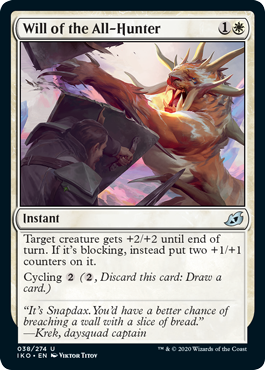
Will of the All-Hunter
{1}{W}
Instant
Target creature gets +2/+2 until end of turn. If it's blocking, instead put two +1/+1 counters on it.
Cycling {2} ({2}, Discard this card: Draw a card.)
- Once a creature blocks, it remains a blocking creature through the end of combat step, even if the attacking creature dies or leaves combat.
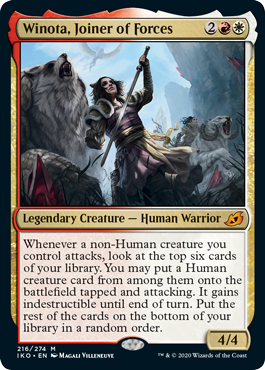
Winota, Joiner of Forces
{2}{R}{W}
Legendary Creature — Human Warrior
4/4
Whenever a non-Human creature you control attacks, look at the top six cards of your library. You may put a Human creature card from among them onto the battlefield tapped and attacking. It gains indestructible until end of turn. Put the rest of the cards on the bottom of your library in a random order.
- If more than one non-Human creature you control attacks, Winota's ability triggers separately for each of them. For example, if three non-Human creatures attack, you won't look at the top eighteen cards of your library at once; you'll look at six, finish resolving the ability, and then repeat the process twice more as the other instances of the ability resolve.
- You choose which player or planeswalker the Human is attacking. It doesn't have to be attacking the same player or planeswalker that the non-Human creature is attacking.
- Although the Human is an attacking creature, it was never declared as an attacking creature. This means that abilities that trigger whenever a creature attacks won't trigger when it enters the battlefield attacking.
- Any effects that say that the Human can't attack (such as that of Propaganda, or if you get a Human with defender) affect only the declaration of attackers. They won't stop the Human you find from entering the battlefield attacking.
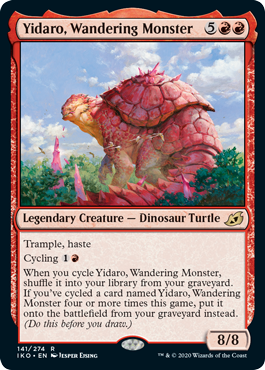
Yidaro, Wandering Monster
{5}{R}{R}
Legendary Creature — Dinosaur Turtle
8/8
Trample, haste
Cycling {1}{R}
When you cycle Yidaro, Wandering Monster, shuffle it into your library from your graveyard. If you've cycled a card named Yidaro, Wandering Monster four or more times this game, put it onto the battlefield from your graveyard instead. (Do this before you draw.)
- You don't have to cycle the same physical card four times for Yidaro to get tired of being cycled and stomp onto the battlefield. Any cards named Yidaro, Wandering Monster will count.
- If you cycle Yidaro but it isn't in your graveyard as the triggered ability resolves, you can't put it onto the battlefield or shuffle it into your library. You'll still shuffle your library if you haven't cycled Yidaro four times this game.
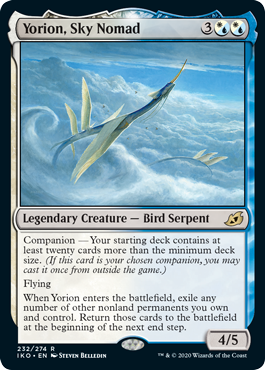
Yorion, Sky Nomad
{3}{w/u}{w/u}
Legendary Creature — Bird Serpent
4/5
Companion — Your starting deck contains at least twenty cards more than the minimum deck size. (If this card is your chosen companion, you may cast it once from outside the game.)
Flying
When Yorion enters the battlefield, exile any number of other nonland permanents you own and control. Return those cards to the battlefield at the beginning of the next end step.
- Your minimum deck size is forty cards for Limited events (such as Booster Draft and Sealed Deck) and sixty cards for Constructed events (such as Standard or casual freeform play). Certain variants may have other minimums. The Commander variant requires exactly one hundred cards, so Yorion can never be your chosen companion in a Commander game.
- You choose which permanents to exile as Yorion's triggered ability resolves. No player may take action between the time you choose the permanents and the time they're exiled.
- You can't exile permanents you control but don't own, or permanents that you own but don't control.
- Auras attached to the exiled permanents will be put into their owners' graveyards. Equipment attached to the exiled permanents will become unattached and remain on the battlefield. Any counters on the exiled permanents will cease to exist. Once the exiled permanents return, they're considered new objects with no relation to the objects that they were.
- If a token is exiled this way, it will cease to exist and won't return to the battlefield.
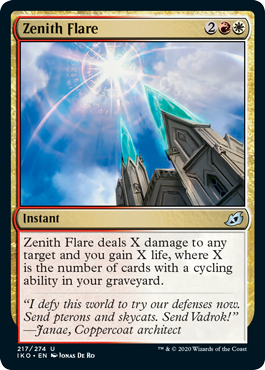
Zenith Flare
{2}{R}{W}
Instant
Zenith Flare deals X damage to any target and you gain X life, where X is the number of cards with a cycling ability in your graveyard.
- If the chosen target is an illegal target by the time Zenith Flare tries to resolve, the spell won't resolve. You won't gain X life.
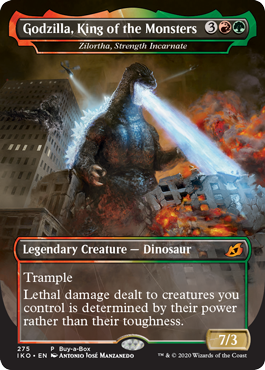
Zilortha, Strength Incarnate (Buy-a-Box promo card)
{3}{R}{G}
Legendary Creature — Dinosaur
7/3
Trample
Lethal damage dealt to creatures you control is determined by their power rather than their toughness.
- Zilortha is printed only with its alternate name in the title bar. Despite that, its name is still only Zilortha, Strength Incarnate.
- Any time the game is checking whether damage is lethal or if a creature should be destroyed for having lethal damage marked on it, use the power of your creatures rather than their toughness to check the damage against. This includes being assigned trample damage, damage from Flame Spill, and so on.
- A creature with 0 power isn't destroyed unless it has at least 1 damage marked on it.
- A creature with 0 toughness is put into its owner's graveyard. This state-based action isn't a consequence of damage, so Zilortha doesn't affect it.
- Because damage remains marked on a creature until the damage is removed as the turn ends, nonlethal damage dealt to a creature you control may become lethal if Zilortha enters or leaves the battlefield during that turn.

Zirda, the Dawnwaker
{1}{r/w}{r/w}
Legendary Creature — Elemental Fox
3/3
Companion — Each permanent card in your starting deck has an activated ability. (If this card is your chosen companion, you may cast it once from outside the game.)
Abilities you activate that aren't mana abilities cost {2} less to activate. This effect can't reduce the mana in that cost to less than one mana.
{1}, {T}: Target creature can't block this turn.
- Permanent cards are artifact, creature, enchantment, land, and planeswalker cards. Land cards with basic land types have intrinsic activated mana abilities associated with those types.
- Activated abilities contain a colon. They're generally written "[Cost]: [Effect]." Some keyword abilities are activated abilities (such as cycling) and will have colons in their reminder text.
- An activated mana ability is one that produces mana as it resolves, not one that costs mana to activate.
- Effects that reduce the generic mana cost of an activation cost can't reduce that cost's colored mana requirements. The activation cost is reduced by only {1} if doing so reduces that cost to one mana. For example, a cycling cost of {2} would become {1}, and one of {1}{R} would become {R}. The activation cost is unaffected if it already costs one or zero mana (such as the activation cost of Zirda's last ability).
- Activating Zirda's last ability after a creature has blocked won't remove the blocking creature from combat or cause the creature it blocked to become unblocked.
COMMANDER (2020 EDITION) CARD-SPECIFIC NOTES
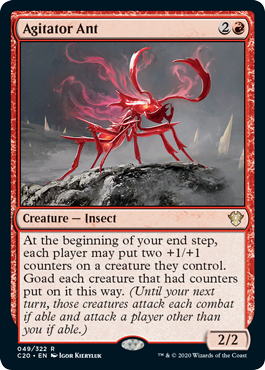
Agitator Ant
{2}{R}
Creature — Insect
2/2
At the beginning of your end step, each player may put two +1/+1 counters on a creature they control. Goad each creature that had counters put on it this way. (Until your next turn, those creatures attack each combat if able and attack a player other than you if able.)
- As Agitator Ant's ability resolves, first you choose which creature you control, if any, to put two +1/+1 counters on, then each other player in turn order does the same, knowing the choices made before them. Then each chosen creature receives its +1/+1 counters and becomes goaded.
- If a creature can't have +1/+1 counters put on it, its controller can't choose it just to have it become goaded. If it can have counters put on it but replacement effects cause it not to receive +1/+1 counters, it doesn't become goaded.
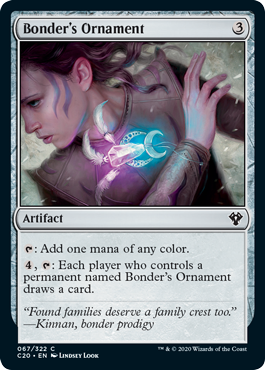
Bonder's Ornament
{3}
Artifact
{T}: Add one mana of any color.
{4}, {T}: Each player who controls a permanent named Bonder's Ornament draws a card.
- If one player controls more than one Bonder's Ornament, that player draws just one card while resolving its second ability.
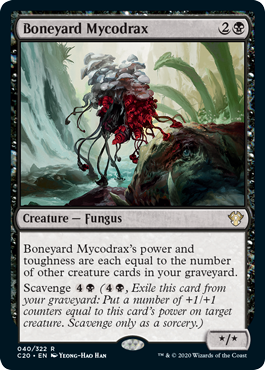
Boneyard Mycodrax
{2}{B}
Creature — Fungus
*/*
Boneyard Mycodrax's power and toughness are each equal to the number of other creature cards in your graveyard.
Scavenge {4}{B} ({4}{B}, Exile this card from your graveyard: Put a number of +1/+1 counters equal to this card's power on target creature. Scavenge only as a sorcery.)
- The ability that defines Boneyard Mycodrax's power and toughness works in all zones, not just on the battlefield.
- The number of counters given by Boneyard Mycodrax's scavenge ability is its power as it last existed in your graveyard before exiling it. Players can't change how many counters it gives out after you've activated the ability by changing what's in your graveyard.
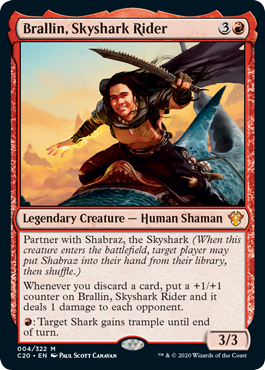
Brallin, Skyshark Rider
{3}{R}
Legendary Creature — Human Shaman
3/3
Partner with Shabraz, the Skyshark (When this creature enters the battlefield, target player may put Shabraz into their hand from their library, then shuffle.)
Whenever you discard a card, put a +1/+1 counter on Brallin, Skyshark Rider and it deals 1 damage to each opponent.
{R}: Target Shark gains trample until end of turn.
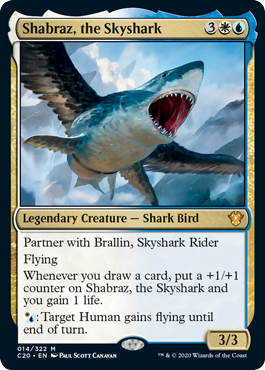
Shabraz, the Skyshark
{3}{W}{U}
Legendary Creature — Shark Bird
3/3
Partner with Brallin, Skyshark Rider
Flying
Whenever you draw a card, put a +1/+1 counter on Shabraz, the Skyshark and you gain 1 life.
{w/u}: Target Human gains flying until end of turn.
- If you discard a card as a cost to cast a spell or activate an ability, Brallin's middle ability resolves before that spell or ability but after you've chosen targets for it. If you discard a card while a spell or ability is resolving, that spell or ability finishes resolving before Brallin's triggered ability does.'
- Brallin's middle ability gives it only one +1/+1 counter each time it resolves, no matter how many opponents are dealt damage.
- Brallin's middle ability deals 1 damage to each opponent even if you can't put a +1/+1 counter on Brallin, most likely because Brallin has left the battlefield.
- If a spell or ability causes you to put cards into your hand without specifically using the word "draw," it's not a card drawn.
- Shabraz's middle ability has you gain 1 life even if you can't put a +1/+1 counter on Shabraz, most likely because Shabraz has left the battlefield.
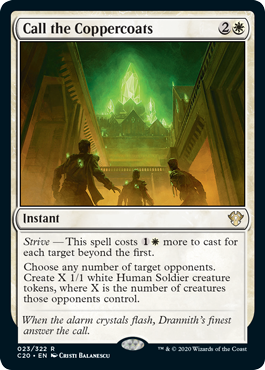
Call the Coppercoats
{2}{W}
Instant
Strive — This spell costs {1}{W} more to cast for each target beyond the first.
Choose any number of target opponents. Create X 1/1 white Human Soldier creature tokens, where X is the number of creatures those opponents control.
- Any target opponents that are no longer legal targets by the time Call the Coppercoats resolves won't have their creatures counted when determining how many tokens you create.
- You choose how many targets each spell with a strive ability has and what those targets are as you cast it. It's legal to cast such a spell with no targets, although this is rarely a good idea. You can't choose the same target more than once for a single strive spell.
- The converted mana cost of a strive spell doesn't change no matter how many targets it has.
- If this spell is copied and the effect that copies the spell allows a player to choose new targets for the copy, the number of targets can't be changed. The player may change any number of the targets, including all of them or none of them. If, for one of the targets, the player can't choose a new legal target, then it remains unchanged (even if the current target is illegal).
- If a spell or ability allows you to cast a strive spell without paying its mana cost, you must pay the additional cost for any targets beyond the first.
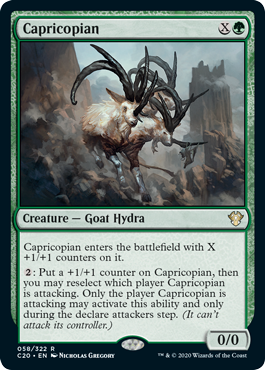
Capricopian
{X}{G}
Creature — Goat Hydra
0/0
Capricopian enters the battlefield with X +1/+1 counters on it.
{2}: Put a +1/+1 counter on Capricopian, then you may reselect which player Capricopian is attacking. Only the player Capricopian is attacking may activate this ability and only during the declare attackers step. (It can't attack its controller.)
- Reselecting which player a creature is attacking ignores all requirements, restrictions, and costs associated with attacking.
- Reselecting which player a creature is attacking doesn't cause "whenever this creature attacks" abilities to trigger.
- If you reselect which player an attacking creature is attacking, that creature is still considered to have attacked the player as declared, but it is now attacking the new player.
- The player Capricopian is attacking can't reselect it to attack a planeswalker instead. If Capricopian is attacking a planeswalker, no player may activate its last ability.
- The player Capricopian becomes attacking may activate its ability, perhaps sending Capricopian right back towards its original destination.
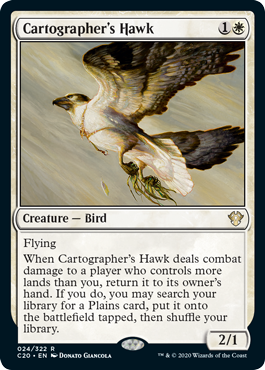
Cartographer's Hawk
{1}{W}
Creature — Bird
2/1
Flying
When Cartographer's Hawk deals combat damage to a player who controls more lands than you, return it to its owner's hand. If you do, you may search your library for a Plains card, put it onto the battlefield tapped, then shuffle your library.
- If Cartographer's Hawk leaves the battlefield before its triggered ability resolves, you can't return it to its owner's hand from its new zone.
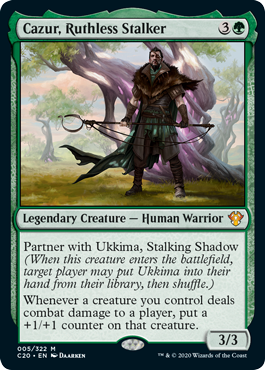
Cazur, Ruthless Stalker
{3}{G}
Legendary Creature — Human Warrior
3/3
Partner with Ukkima, Stalking Shadow (When this creature enters the battlefield, target player may put Ukkima into their hand from their library, then shuffle.)
Whenever a creature you control deals combat damage to a player, put a +1/+1 counter on that creature.
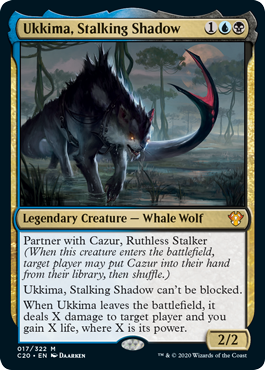
Ukkima, Stalking Shadow
{1}{U}{B}
Legendary Creature — Whale Wolf
2/2
Partner with Cazur, Ruthless Stalker (When this creature enters the battlefield, target player may put Cazur into their hand from their library, then shuffle.)
Ukkima, Stalking Shadow can't be blocked.
When Ukkima leaves the battlefield, it deals X damage to target player and you gain X life, where X is its power.
- Use Ukkima's power as it last existed on the battlefield to determine how much damage it deals and how much life you gain. If that number is negative, it deals no damage and you gain no life.
- If the target player is an illegal target by the time Ukkima's last ability tries to resolve, the ability won't resolve. You won't gain any life.
- If your life total is brought to 0 or less at the same time that Ukkima is dealt lethal damage, you lose the game before the last ability goes on the stack.
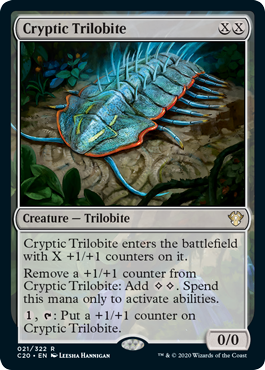
Cryptic Trilobite
{X}{X}
Creature — Trilobite
0/0
Cryptic Trilobite enters the battlefield with X +1/+1 counters on it.
Remove a +1/+1 counter from Cryptic Trilobite: Add {C}{C}. Spend this mana only to activate abilities.
{1}, {T}: Put a +1/+1 counter on Cryptic Trilobite.
- A mana cost of {X}{X} means that you pay twice X. If you want X to be 3, you pay {6} to cast Cryptic Trilobite.
- Activated abilities contain a colon, such as Cryptic Trilobite's activated mana ability and its last activated ability. They're generally written "[Cost]: [Effect]." Some keyword abilities are activated abilities (such as cycling) and will have colons in their reminder text.
- You can spend the two colorless mana produced by Cryptic Trilobite on two different activated abilities.
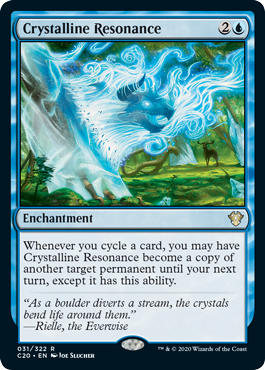
Crystalline Resonance
{2}{U}
Enchantment
Whenever you cycle a card, you may have Crystalline Resonance become a copy of another target permanent until your next turn, except it has this ability.
- Crystalline Resonance copies the printed values of the target permanent, plus any copy effects that have been applied to it. It won't copy counters on that permanent or effects that have changed its power, toughness, types, color, or so on. Notably, it won't copy effects that made the target permanent become a creature.
- If Crystalline Resonance copies a permanent that's copying something else, it will become whatever the target is copying.
- If another permanent becomes a copy of Crystalline Resonance, it will become whatever Crystalline Resonance is copying and it will also have its ability.
- If Crystalline Resonance's ability triggers multiple times in a turn, then each time one of those abilities resolves, it will overwrite whatever Crystalline Resonance is copying. Crystalline Resonance will wind up as a copy of the permanent targeted by the last ability to resolve. As your next turn begins, all instances of the ability will wear off at the same time.
- If an effect begins to apply to Crystalline Resonance before it becomes a copy of another permanent, that effect will continue to apply.
- If Crystalline Resonance becomes a creature the same turn it enters the battlefield, you can't attack with it or use any of its {T} abilities (if it gains any) unless it has haste.
- If Crystalline Resonance becomes a copy of a legendary permanent you control, you'll put one of them into its owner's graveyard.
- If Crystalline Resonance becomes a copy of an Aura, it's put into its owner's graveyard unless it's somehow attached to an appropriate object or player already. If it becomes a copy of an Equipment and is attached to a creature, it'll become unattached when it becomes an enchantment again.
- If Crystalline Resonance becomes a copy of a planeswalker, it won't receive loyalty counters for that planeswalker's starting loyalty. Unless it already has loyalty counters on it somehow, it will be put into its owner's graveyard.
- Crystalline Resonance's copy effect wears off immediately before your next turn begins.
- If Crystalline Resonance becomes a copy of an object with a set of linked abilities (for example, one ability that exiles a card and another that refers to the card "exiled with" the object), that link only lasts as long as Crystalline Resonance is copying that object. If it stops being a copy of that object and then becomes a copy again later, the link is lost.
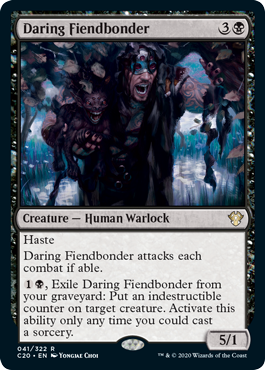
Daring Fiendbonder
{3}{B}
Creature — Human Warlock
5/1
Haste
Daring Fiendbonder attacks each combat if able.
{1}{B}, Exile Daring Fiendbonder from your graveyard: Put an indestructible counter on target creature. Activate this ability only any time you could cast a sorcery.
- If Daring Fiendbonder can't attack for any reason (such as being tapped), then it doesn't attack. If there's a cost associated with having it attack, the player isn't forced to pay that cost, so it doesn't have to attack in that case either.
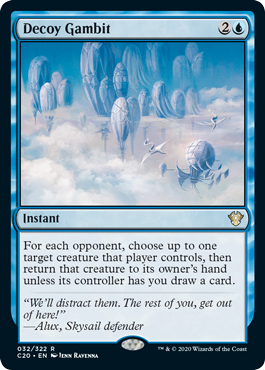
Decoy Gambit
{2}{U}
Instant
For each opponent, choose up to one target creature that player controls, then return that creature to its owner's hand unless its controller has you draw a card.
- As the Decoy Gambit resolves, first the next opponent in turn order (or, if it's an opponent's turn, the opponent whose turn it is) chooses whether you'll draw a card or return their creature that was targeted to its owner's hand, then each other opponent in turn order does so knowing the choices made before them. After all choices are made, you draw the appropriate number of cards. After you've drawn, the appropriate creatures are all simultaneously returned to their owners' hands.
- For each opponent, if you didn't choose a target creature they control or if that creature has become an illegal target, that player can't choose for you to draw a card.
- If a creature targeted by Decoy Gambit changes controller, it's no longer a legal target.
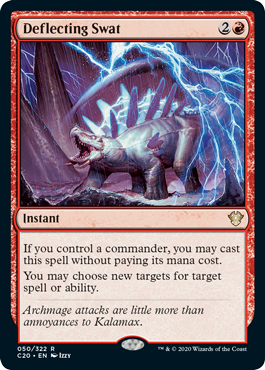
Deflecting Swat
{2}{R}
Instant
If you control a commander, you may cast this spell without paying its mana cost.
You may choose new targets for target spell or ability.
- If you choose new targets for the target spell, the new targets must be legal.
- If the target spell has a variable number of targets, you can't change how many targets it has.
- If the target spell has damage divided as it was cast (like Mythos of Vadrok), the division can't be changed although the targets receiving that damage still can. The same is true of spells that distribute counters.
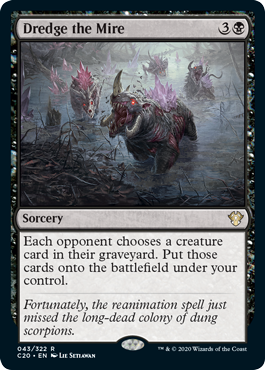
Dredge the Mire
{3}{B}
Sorcery
Each opponent chooses a creature card in their graveyard. Put those cards onto the battlefield under your control.
- As Dredge the Mire resolves, first the next opponent in turn order (or, if it's an opponent's turn, the opponent whose turn it is) chooses a creature card in their graveyard, then each other opponent in turn order does the same knowing the choices made before them. Then all the chosen cards are returned at the same time.
- In a multiplayer game, if a player leaves the game, all cards that player owns leave as well. If you leave the game, any permanents you control from Dredge the Mire are exiled.
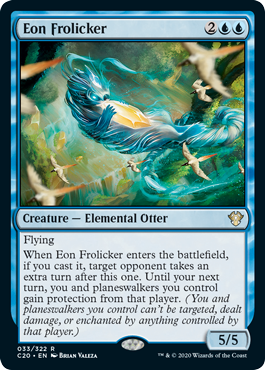
Eon Frolicker
{2}{U}{U}
Creature — Elemental Otter
5/5
Flying
When Eon Frolicker enters the battlefield, if you cast it, target opponent takes an extra turn after this one. Until your next turn, you and planeswalkers you control gain protection from that player. (You and planeswalkers you control can't be targeted, dealt damage, or enchanted by anything controlled by that player.)
- Protection from a player means that you and each planeswalker you control have protection from each object controlled by that player. If an object has no controller (such as a card in a graveyard), its owner is considered its controller for this purpose.
- Creatures that player controls can still attack you or planeswalkers you control, but the damage they would deal will be prevented.
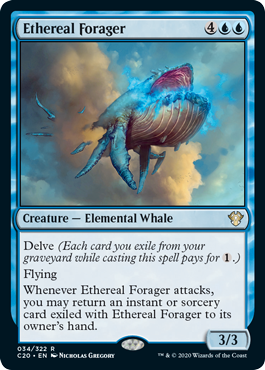
Ethereal Forager
{4}{U}{U}
Creature — Elemental Whale
3/3
Delve (Each card you exile from your graveyard while casting this spell pays for {1}.)
Flying
Whenever Ethereal Forager attacks, you may return an instant or sorcery card exiled with Ethereal Forager to its owner's hand.
- Delve doesn't change a spell's mana cost or converted mana cost. For example, Ethereal Forager's converted mana cost is 6 even if you exiled three cards to cast it.
- You can't exile cards to pay for the colored mana requirements of a spell with delve.
- You can't exile more cards than the generic mana requirement of a spell with delve. For example, you can't exile more than four cards from your graveyard to cast Ethereal Forager unless another effect raises its cost.
- If Ethereal Forager leaves the battlefield while its triggered ability is on the stack, that ability can still find the cards exiled with Ethereal Forager's delve ability.
- After Ethereal Forager's triggered ability resolves, players will have priority to cast spells (such as the card you returned to your hand, if it's legal to do so) before blockers are declared.
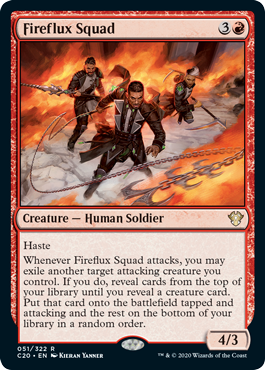
Fireflux Squad
{3}{R}
Creature — Human Soldier
4/3
Haste
Whenever Fireflux Squad attacks, you may exile another target attacking creature you control. If you do, reveal cards from the top of your library until you reveal a creature card. Put that card onto the battlefield tapped and attacking and the rest on the bottom of your library in a random order.
- You choose which player or planeswalker the new creature is attacking. It doesn't have to be attacking the same player or planeswalker that Fireflux Squad or the exiled creature was attacking.
- Although the new creature is an attacking creature, it was never declared as an attacking creature. This means that abilities that trigger whenever a creature attacks won't trigger when it enters the battlefield attacking.
- Any effects that say that the new creature can't attack (such as that of Propaganda, or if you get a creature with defender) affect only the declaration of attackers. They won't stop the creature you find from entering the battlefield attacking.
- If you exile your entire library without exiling a creature card, you put the library back in a random order and continue. You won't return the exiled attacking creature. Oops.
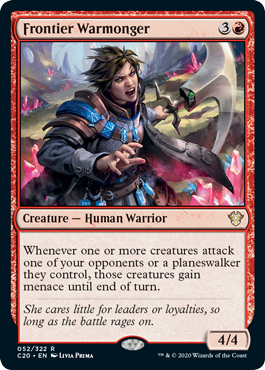
Frontier Warmonger
{3}{R}
Creature — Human Warrior
4/4
Whenever one or more creatures attack one of your opponents or a planeswalker they control, those creatures gain menace until end of turn.
- Creatures your opponents control attacking one of your opponents will cause Frontier Warmonger's ability to trigger.
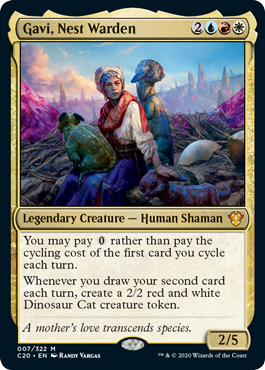
Gavi, Nest Warden
{2}{U}{R}{W}
Legendary Creature — Human Shaman
2/5
You may pay {0} rather than pay the cycling cost of the first card you cycle each turn.
Whenever you draw your second card each turn, create a 2/2 red and white Dinosaur Cat creature token.
- If a cycling cost includes {X} and you pay an alternative activation cost of {0} instead, X is 0.
- Gavi's first ability considers the entire turn. If you cycle a card then have Gavi come under your control, you can't pay {0} to cycle your second card.
- The triggered ability can trigger only once each turn. It doesn't matter Gavi was on the battlefield when the first card was drawn. If it's not on the battlefield when the second card is drawn, the ability can't trigger at all that turn. It won't trigger when the third or fourth card is drawn.
- If a spell or ability causes you to put cards into your hand without specifically using the word "draw," it's not a card drawn.
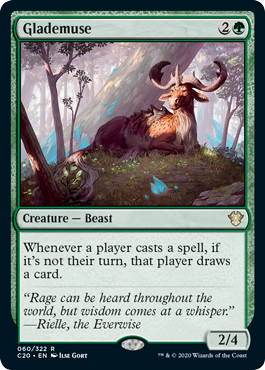
Glademuse
{2}{G}
Creature — Beast
2/4
Whenever a player casts a spell, if it's not their turn, that player draws a card.
- An ability that triggers when a player casts a spell resolves before the spell that caused it to trigger. It resolves even if that spell is countered.
- Players can cast spells and activate abilities after the triggered ability resolves but before the spell that caused it to trigger does.

Haldan, Avid Arcanist
{2}{U}
Legendary Creature — Human Wizard
1/4
Partner with Pako, Arcane Retriever (When this creature enters the battlefield, target player may put Pako into their hand from their library, then shuffle.)
You may play noncreature cards from exile with fetch counters on them if you exiled them, and you may spend mana as though it were mana of any color to cast those spells.

Pako, Arcane Retriever
{3}{R}{G}
Legendary Creature — Elemental Hound
3/3
Partner with Haldan, Avid Arcanist
Haste
Whenever Pako, Arcane Retriever attacks, exile the top card of each player's library and put a fetch counter on each of them. Put a +1/+1 counter on Pako for each noncreature card exiled this way.
- Haldan's ability applies only while it's on the battlefield. You'll be able to play cards you exiled with fetch counters before Haldan entered the battlefield, and if Haldan leaves, you won't be able to play cards that were exiled with fetch counters until Haldan returns.
- Haldan doesn't change when you can play the exiled cards. For example, if you exile a sorcery card, you can cast it only during your main phase when the stack is empty. If you exile a land card, you can play it only during your main phase and only if you have an available land play remaining.
- A creature card that you exiled with a fetch counter on it may be cast as a noncreature spell if a rule or effect (such as that of adventurer cards) allows you to do so.
- You exile cards and put +1/+1 counters on Pako all while Pako's last ability is resolving. Nothing can happen between the two, and no player may choose to take actions.
- In a multiplayer game, if a player leaves the game, all cards that player owns leave as well. If you leave the game, any spells or permanents you control that Pako fetched are exiled.
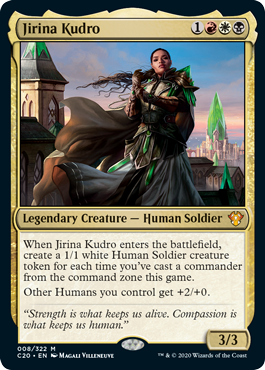
Jirina Kudro
{1}{R}{W}{B}
Legendary Creature — Human Soldier
3/3
When Jirina Kudro enters the battlefield, create a 1/1 white Human Soldier creature token for each time you've cast a commander from the command zone this game.
Other Humans you control get +2/+0.
- If Jirina is your commander, the number of times you cast it includes the time you cast Jirina just before it entered the battlefield.
- Jirina's last ability gives +2/+0 to all Humans you control other than Jirina, including the Human tokens created by its triggered ability.
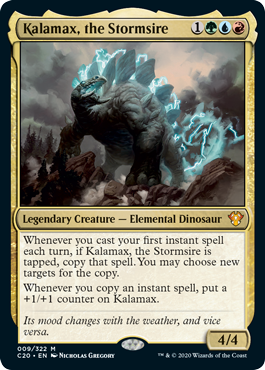
Kalamax, the Stormsire
{1}{G}{U}{R}
Legendary Creature — Elemental Dinosaur
4/4
Whenever you cast your first instant spell each turn, if Kalamax, the Stormsire is tapped, copy that spell. You may choose new targets for the copy.
Whenever you copy an instant spell, put a +1/+1 counter on Kalamax.
- If Kalamax becomes tapped as a cost to cast your first instant spell in a turn, its first ability triggers.
- Kalamax's first ability considers the entire turn. If you cast an instant spell before Kalamax becomes tapped, its first ability won't trigger when you cast your second.
- A copy is created even if the spell that caused Kalamax's ability to trigger has been countered by the time that ability resolves. The copy resolves before the original spell.
- If the spell that's copied is modal (that is, it says "Choose one —" or the like), the copy created by Kalamax's first ability will have the same mode or modes. You can't choose different ones.
- If the spell that's copied has damage divided as it was cast, the division can't be changed, although the targets receiving that damage still can. The same is true of spells that distribute counters.
- You can't choose to pay any additional costs for the copy created by Kalamax's first ability. However, effects based on any additional costs that were paid for the original spell are copied as though those same costs were paid for the copy too.
- The copies that Kalamax's first ability creates are created on the stack, so they're not "cast." Abilities that trigger when a player casts a spell won't trigger.
- An ability that triggers when a player copies a spell resolves before the copy. It resolves even if that spell is countered.
- If an effect copies an instant spell multiple times, Kalamax's last ability triggers that many times.
- If an effect copies a card rather than a spell (such as that of God-Eternal Kefnet), this doesn't cause Kalamax's last ability to trigger.
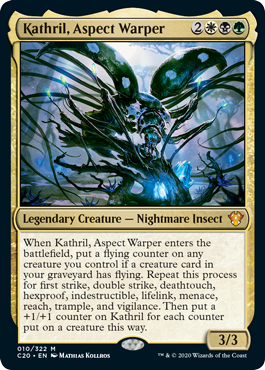
Kathril, Aspect Warper
{2}{W}{B}{G}
Legendary Creature — Nightmare Insect
3/3
When Kathril, Aspect Warper enters the battlefield, put a flying counter on any creature you control if a creature card in your graveyard has flying. Repeat this process for first strike, double strike, deathtouch, hexproof, indestructible, lifelink, menace, reach, trample, and vigilance. Then put a +1/+1 counter on Kathril for each counter put on a creature this way.
- For each applicable keyword, the appropriate counter may be put on any creature you control, including Kathril. The counters don't need to all be put on the same creature.
- You check once for each keyword. If you have two creature cards with flying in your graveyard, you put just one flying counter on a creature you control, not two.
- Once Kathril's ability begins resolving, no player may take other actions until it's done and you've put +1/+1 counters on Kathril.
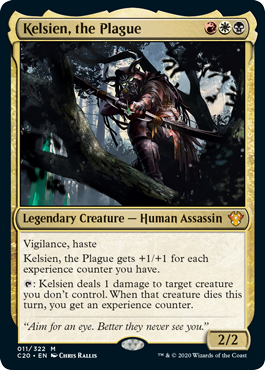
Kelsien, the Plague
{R}{W}{B}
Legendary Creature — Human Assassin
2/2
Vigilance, haste
Kelsien, the Plague gets +1/+1 for each experience counter you have.
{T}: Kelsien deals 1 damage to target creature you don't control. When that creature dies this turn, you get an experience counter.
- Each time Kelsien's last ability resolves, it creates a separate delayed triggered ability. If you untap Kelsien and activate its last ability multiple times in one turn, they'll each trigger when the appropriate creature or creatures die.
- If the target of Kelsien's last ability dies before the ability resolves, you won't get an experience counter.
- If a player's commander would die and that player spares it by sending it to the command zone instead, Kelsien's delayed triggered ability won't trigger.
- If Kelsien leaves the battlefield, you keep any experience counters you've received.
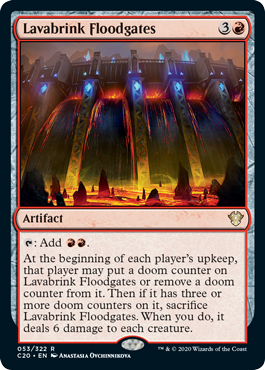
Lavabrink Floodgates
{3}{R}
Artifact
{T}: Add {R}{R}.
At the beginning of each player's upkeep, that player may put a doom counter on Lavabrink Floodgates or remove a doom counter from it. Then if it has three or more doom counters on it, sacrifice Lavabrink Floodgates. When you do, it deals 6 damage to each creature.
- The player whose upkeep it is may put a doom counter on Lavabrink Floodgates, remove one from it, or do nothing.
- Lavabrink Floodgates is sacrificed for having three or more doom counters on it only while its ability is resolving. If you put a third counter on it some other way, it won't be immediately sacrificed.
- Lavabrink Floodgates's reflexive triggered ability triggers and deals damage only if you sacrifice it while resolving its triggered ability. It won't trigger if you sacrifice it for any other reason.
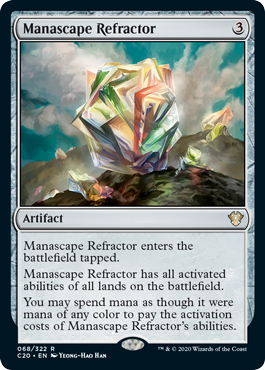
Manascape Refractor
{3}
Artifact
Manascape Refractor enters the battlefield tapped.
Manascape Refractor has all activated abilities of all lands on the battlefield.
You may spend mana as though it were mana of any color to pay the activation costs of Manascape Refractor's abilities.
- Activated abilities contain a colon. They're generally written "[Cost]: [Effect]." Some keyword abilities are activated abilities and will have colons in their reminder text. Manascape Refractor won't gain triggered abilities (which start with "when," "whenever," or "at").
- Lands with a basic land type have an intrinsic activated mana ability corresponding to their basic land type. Manascape Refractor has those abilities, too.
- If Manascape Refractor gains an activated ability that's normally linked to a non-activated ability of the card it came from, the ability Manascape Refractor has isn't linked to any ability.
- If Manascape Refractor gains an activated ability that's normally linked to another activated ability of the card it came from, those two abilities Manascape Refractor gains are linked for as long as that card remains on the battlefield.
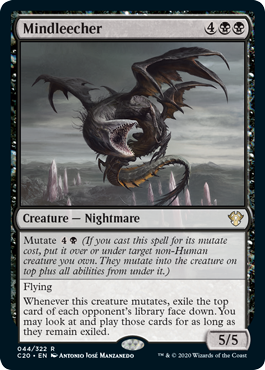
Mindleecher
{4}{B}{B}
Creature — Nightmare
5/5
Mutate {4}{B} (If you cast this spell for its mutate cost, put it over or under target non-Human creature you own. They mutate into the creature on top plus all abilities from under it.)
Flying
Whenever this creature mutates, exile the top card of each opponent's library face down. You may look at and play those cards for as long as they remain exiled.
- You may look at and play those cards even if Mindleecher leaves the battlefield. If another player gains control of Mindleecher, that player can't look at or play the cards, and you still can.
- You can play lands this way only if you have remaining land plays available for the turn.
- You pay the costs for the exiled cards if you cast them. You may pay alternative costs such as mutate rather than a card's mana cost.
- Mindleecher doesn't change when you can cast the exiled cards. For example, if you exile a creature card without flash, you can cast it only during your main phase when the stack is empty.
- Casting the card causes it to leave exile. You can't cast it multiple times.
- In a multiplayer game, if a player leaves the game, all cards that player owns leave as well. If you leave the game, any spells or permanents you control from Mindleecher are exiled, and any cards remaining in exile remain face down indefinitely. No player may look at them.
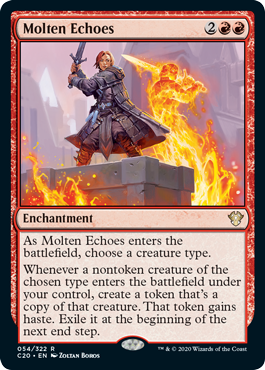
Molten Echoes
{2}{R}{R}
Enchantment
As Molten Echoes enters the battlefield, choose a creature type.
Whenever a nontoken creature of the chosen type enters the battlefield under your control, create a token that's a copy of that creature. That token gains haste. Exile it at the beginning of the next end step.
- You must choose an existing creature type, such as Human or Warrior. Card types such as artifact and supertypes such as legendary can't be chosen.
- If the nontoken creature leaves the battlefield before Molten Echoes's triggered ability resolves, the token that's created uses the creature's last known information from before it left.
- The token copies exactly what is printed on the creature and nothing else (unless that creature is copying something else; see below). It doesn't copy whether that creature is tapped or untapped, whether it has any counters on it or Auras and/or Equipment attached to it, or any non-copy effects that changed its power, toughness, types, color, and so on.
- If the copied creature is copying something else, the token enters the battlefield as whatever that creature is copying.
- If the copied creature has {X} in its mana cost, X is 0.
- Any enters-the-battlefield abilities of the copied creature will trigger when the token enters the battlefield. Any "As [this creature] enters the battlefield" or "[This creature] enters the battlefield with" abilities of the copied creature will also work.
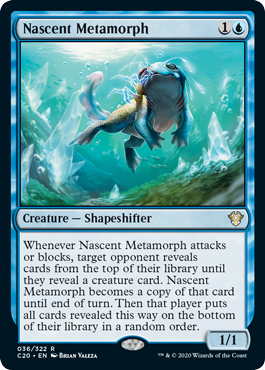
Nascent Metamorph
{1}{U}
Creature — Shapeshifter
1/1
Whenever Nascent Metamorph attacks or blocks, targetopponent reveals cards from the top of their library until they reveal a creature card. Nascent Metamorph becomes a copy of that card until end of turn. Then that player puts all cards revealed this way on the bottom of their library in a random order.
- The creature card that Nascent Metamorph becomes a copy of is put onto the bottom of the library along with any other cards.
- If the target opponent has no creature cards in their library, Nascent Metamorph doesn't become a copy of anything. The cards are returned to that library in a random order.
- If another permanent becomes a copy of Nascent Metamorph, it will become whatever Nascent Metamorph is copying. It remains a copy when Nascent Metamorph's effect ends.
- If an effect begins to apply to Nascent Metamorph before it becomes a copy, that effect will continue to apply.
- If Nascent Metamorph becomes a copy of a legendary card with the same name as a legendary permanent you control, you'll put one of them into its owner's graveyard.
- If Nascent Metamorph becomes a copy of an object with a set of linked abilities (for example, one ability that exiles a card and another that refers to the card "exiled with" the object), that link only lasts as long as Nascent Metamorph is copying that object. If it stops being a copy of that object and then becomes a copy again later, the link is lost.
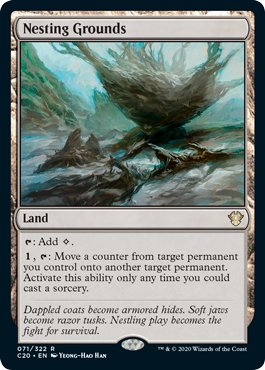
Nesting Grounds
Land
{T}: Add {C}.
{1}, {T}: Move a counter from target permanent you control onto another target permanent. Activate this ability only any time you could cast a sorcery.
- You choose the two target permanents as Nesting Grounds's second ability is put onto the stack. You choose which kind of counter to move as that ability resolves.
- To move a counter from one creature to another, the counter is removed from the first permanent and put on the second. Any abilities that care about a counter being removed from or put onto a permanent will apply.
- If either permanent becomes an illegal target, no counter is removed or put.
- The two target permanents don't have to share a type, which can result in some counters on permanents that would not occur normally, such as loyalty counters on creatures or +1/+1 counters on lands. Keyword counters will grant the permanent that keyword even if it's meaningless (such as trample on an enchantment); +1/+1 counters won't affect the permanent unless it's a creature; and many named counters (such as soul counters) won't have an effect unless the recipient permanent refers to them in some way.
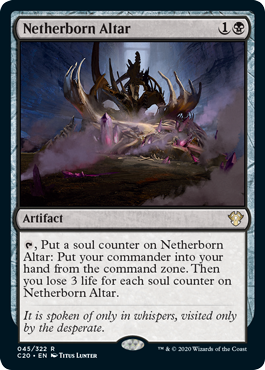
Netherborn Altar
{1}{B}
Artifact
{T}, Put a soul counter on Netherborn Altar: Put your commander into your hand from the command zone. Then you lose 3 life for each soul counter on Netherborn Altar.
- Putting a soul counter onto Netherborn Altar is part of the cost to activate its ability, and counting the number of soul counters is done as the ability resolves. Players may take actions between those times to change the number of soul counters, perhaps by removing them all so that you lose no life.
- If Netherborn Altar leaves the battlefield while its ability is on the stack, the amount of life you lose is determined by the number of soul counters it had on it immediately before it left the battlefield.
- The "commander tax" increases based on how many times a commander was cast from the command zone. Casting a commander from your hand doesn't require that additional cost, and it doesn't increase what the cost will be the next time you cast that commander from the command zone.
- If your commander isn't in the command zone (or if you're not playing the Commander variant), Netherborn Altar only makes you lose life.
- If you have two commanders in the command zone, Netherborn Altar's ability puts one of your choice into your hand, not both.
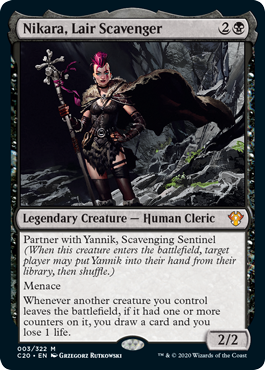
Nikara, Lair Scavenger
{2}{B}
Legendary Creature — Human Cleric
2/2
Partner with Yannik, Scavenging Sentinel (When this creature enters the battlefield, target player may put Yannik into their hand from their library, then shuffle.)
Menace
Whenever another creature you control leaves the battlefield, if it had one or more counters on it, you draw a card and you lose 1 life.
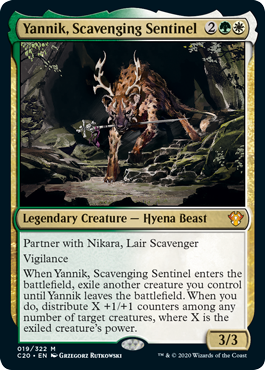
Yannik, Scavenging Sentinel
{2}{G}{W}
Legendary Creature — Hyena Beast
3/3
Partner with Nikara, Lair Scavenger
Vigilance
When Yannik, Scavenging Sentinel enters the battlefield, exile another creature you control until Yannik leaves the battlefield. When you do, distribute X +1/+1 counters among any number of target creatures, where X is the exiled creature's power.
- Nikara's last ability causes you to draw only one card and lose only 1 life, no matter how many counters or kinds of counters that creature had on it.
- If a creature with +1/+1 counters on it receives an equal number of -1/-1 counters and this causes it to be destroyed by lethal damage or put into its owner's graveyard for having 0 or less toughness, Nikara's last ability triggers. That's because the ability checks the creature as it last existed on the battlefield, and it still had those counters on it at that point.
- If a creature with counters on it leaves the battlefield at the same time as Nikara, Nikara's ability triggers for that creature.
- If Yannik leaves the battlefield before its triggered ability resolves, you won't exile any creature you control. Yannik's reflexive triggered ability won't trigger.
- Auras attached to the exiled creature will be put into their owners' graveyards. Any Equipment will become unattached and remain on the battlefield. Any counters on the exiled creature will cease to exist. When the card returns to the battlefield, it will be a new object with no connection to the card that was exiled.
- If a token is exiled this way, it will cease to exist and won't return to the battlefield. It will still let the ability distribute counters.
- Yannik's triggered ability doesn't target the creature you control. That creature is chosen as the triggered ability resolves. After it's exiled, the reflexive triggered ability triggers and targets are chosen to receive the counters.
- Use the power of the creature as it last existed on the battlefield to determine how many +1/+1 counters to distribute.
- You choose how the counters will be distributed as you put the reflexive triggered ability onto the stack. Each target creature must be assigned at least one counter.
- You may choose zero target creatures for Yannik's reflexive triggered ability. If you do, no creature receives +1/+1 counters.
- If one of the target creatures becomes an illegal target in response to the reflexive triggered ability, the +1/+1 counters that would have been put on that creature are lost. They can't be put on another legal target.
- Yannik can be the target of its own reflexive triggered ability.
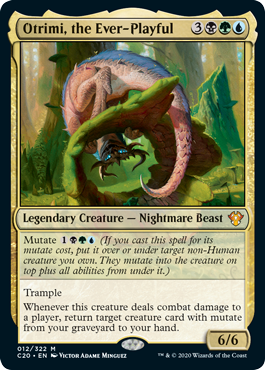
Otrimi, the Ever-Playful
{3}{B}{G}{U}
Legendary Creature — Nightmare Beast
6/6
Mutate {1}{B}{G}{U} (If you cast this spell for its mutate cost, put it over or under target non-Human creature you own. They mutate into the creature on top plus all abilities from under it.)
Trample
Whenever this creature deals combat damage to a player, return target creature card with mutate from your graveyard to your hand.
- If Otrimi deals combat damage to a player at the same time that it's dealt lethal damage, Otrimi (or any other creature card with mutate that was merged with it) can be the target of its triggered ability.
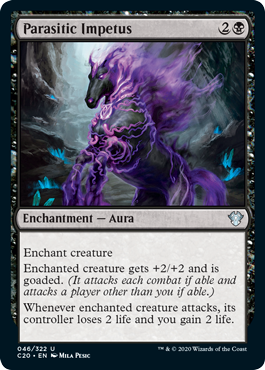
Parasitic Impetus
{2}{B}
Enchantment — Aura
Enchant creature
Enchanted creature gets +2/+2 and is goaded. (It attacks each combat if able and attacks a player other than you if able.)
Whenever enchanted creature attacks, its controller loses 2 life and you gain 2 life.
- Parasitic Impetus causes you to gain life, not the attacking creature's controller.
- If you are the attacking creature's controller, you lose 2 life and gain 2 life. You won't lose the game if your life total is 0 in between these two events.
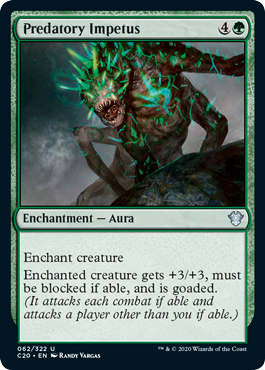
Predatory Impetus
{4}{G}
Enchantment — Aura
Enchant creature
Enchanted creature gets +3/+3, must be blocked if able, and is goaded. (It attacks each combat if able and attacks a player other than you if able.)
- Only one creature is required to block the enchanted creature. Other creatures may also block it and are free to block other creatures or not block at all.
- If each creature the defending player controls can't block for any reason (such as being tapped), then the enchanted creature isn't blocked. If there's a cost associated with blocking the enchanted creature, the defending player isn't forced to pay that cost, so it doesn't have to be blocked in that case either.
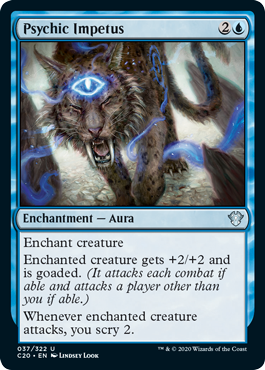
Psychic Impetus
{2}{U}
Enchantment — Aura
Enchant creature
Enchanted creature gets +2/+2 and is goaded. (It attacks each combat if able and attacks a player other than you if able.)
Whenever enchanted creature attacks, you scry 2.
- Psychic Impetus causes you to scry 2, not the attacking creature's controller.
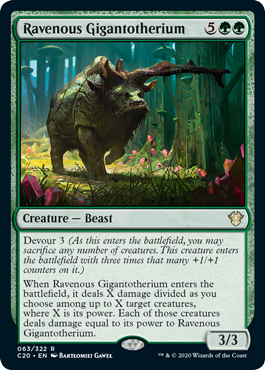
Ravenous Gigantotherium
{5}{G}{G}
Creature — Beast
3/3
Devour 3 (As this enters the battlefield, you may sacrifice any number of creatures. This creature enters the battlefield with three times that many +1/+1 counters on it.)
When Ravenous Gigantotherium enters the battlefield, it deals X damage divided as you choose among up to X target creatures, where X is its power. Each of those creatures deals damage equal to its power to Ravenous Gigantotherium.
- Ravenous Gigantotherium can't devour creatures entering the battlefield at the same time as it.
- You divide the damage as Ravenous Gigantotherium's triggered ability is put onto the stack, not as it resolves. Each target must be assigned at least 1 damage. You can't choose more than X targets and assign 0 damage to a target.
- You may choose zero targets. If you do, Ravenous Gigantotherium deals no damage and is dealt no damage.
- If some of the targets become illegal for Ravenous Gigantotherium's ability, the original division of damage still applies, but the damage that would have been dealt to illegal targets isn't dealt at all.
- The value of X is locked in as you divide the damage while putting Ravenous Gigantotherium's ability onto the stack. Changing Ravenous Gigantotherium's power after that time won't change how much damage is dealt.
- Static abilities, such as that of Glorious Anthem, modify Ravenous Gigantotherium's power before its triggered ability is put onto the stack. Spells, activated abilities, and triggered abilities can't raise its power in time to change the value of X.
- The creatures targeted by Ravenous Gigantotherium's ability deal damage back to Ravenous Gigantotherium before dying if they're dealt lethal damage.
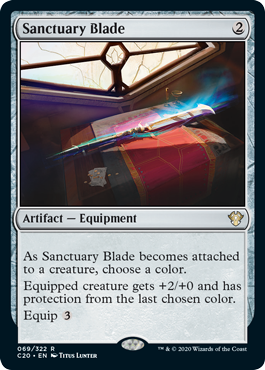
Sanctuary Blade
{2}
Artifact — Equipment
As Sanctuary Blade becomes attached to a creature, choose a color.
Equipped creature gets +2/+0 and has protection from the last chosen color.
Equip {3}
- Activating Sanctuary Blade's equip ability targeting the creature it's already attached to won't let you choose a new color.
- If Sanctuary Blade is somehow attached to a creature without a color having been chosen for it, it doesn't grant a protection ability to the creature. The creature doesn't gain protection from colorless.
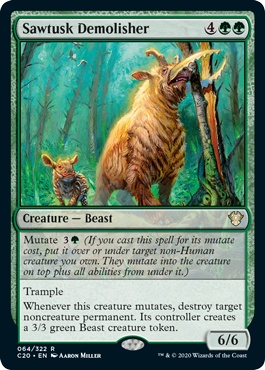
Sawtusk Demolisher
{4}{G}{G}
Creature — Beast
6/6
Mutate {3}{G} (If you cast this spell for its mutate cost, put it over or under target non-Human creature you own. They mutate into the creature on top plus all abilities from under it.)
Trample
Whenever this creature mutates, destroy target noncreature permanent. Its controller creates a 3/3 green Beast creature token.
- If the target noncreature permanent is an illegal target by the time Sawtusk Demolisher's last ability tries to resolve, the ability won't resolve. No player will create a Beast token. If the target is legal but not destroyed (most likely because it has indestructible), its controller does create a Beast token.
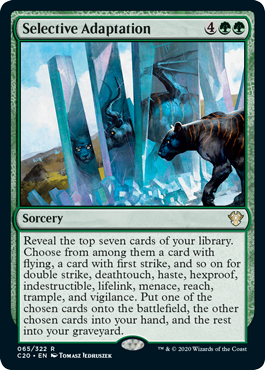
Selective Adaptation
{4}{G}{G}
Sorcery
Reveal the top seven cards of your library. Choose from among them a card with flying, a card with first strike, and so on for double strike, deathtouch, haste, hexproof, indestructible, lifelink, menace, reach, trample, and vigilance. Put one of the chosen cards onto the battlefield, the other chosen cards into your hand, and the rest into your graveyard.
- If a card has more than one of the listed keywords, you pick which keyword you're choosing it for. For example, if you choose a card with flying and first strike, you may choose it as the card with flying and choose another card with first strike, or you may choose it as the card with first strike and choose another card with flying.

Shiny Impetus
{2}{R}
Enchantment — Aura
Enchant creature
Enchanted creature gets +2/+2 and is goaded. (It attacks each combat if able and attacks a player other than you if able.)
Whenever enchanted creature attacks, you create a Treasure token. (It's an artifact with "{T}, Sacrifice this artifact: Add one mana of any color.")
- Shiny Impetus causes you to create a Treasure token, not the attacking creature's controller.
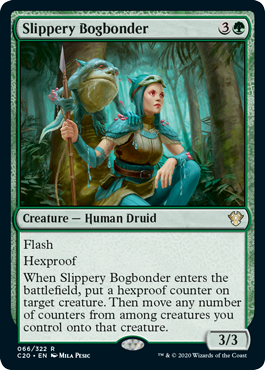
Slippery Bogbonder
{3}{G}
Creature — Human Druid
3/3
Flash
Hexproof
When Slippery Bogbonder enters the battlefield, put a hexproof counter on target creature. Then move any number of counters from among creatures you control onto that creature.
- You may move counters from any number of other creatures you control, not just from one.
- You choose which counters to move as Slippery Bogbonder's triggered ability resolves.
- You may choose to move zero counters.
- If Slippery Bogbonder's triggered ability puts a hexproof counter on a creature an opponent controls, you can still move counters onto that creature.
- You can't move counters from the target creature to itself.
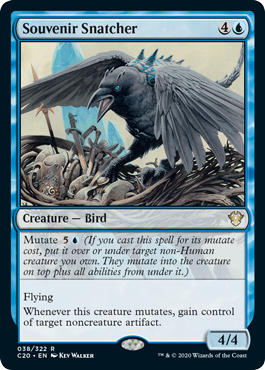
Souvenir Snatcher
{4}{U}
Creature — Bird
4/4
Mutate {5}{U} (If you cast this spell for its mutate cost, put it over or under target non-Human creature you own. They mutate into the creature on top plus all abilities from under it.)
Flying
Whenever this creature mutates, gain control of target noncreature artifact.
- Once Souvenir Snatcher has snatched a noncreature artifact, you'll continue to control that artifact if it becomes an artifact creature.
- The control-change effect of Souvenir Snatcher lasts indefinitely. It doesn't wear off during the cleanup step, and it doesn't expire if Souvenir Snatcher leaves the battlefield. In a multiplayer game, it does expire if you leave the game. If the artifact's owner leaves the game, that artifact leaves with them.
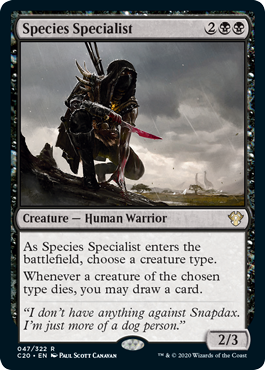
Species Specialist
{2}{B}{B}
Creature — Human Warrior
2/3
As Species Specialist enters the battlefield, choose a creature type.
Whenever a creature of the chosen type dies, you may draw a card.
- You must choose an existing creature type, such as Human or Warrior. Card types such as artifact and supertypes such as legendary can't be chosen.
- If a creature of the chosen type dies at the same time as Species Specialist, its ability triggers for that creature.
- If Species Specialist happens to have the chosen creature type, its ability triggers when it dies.
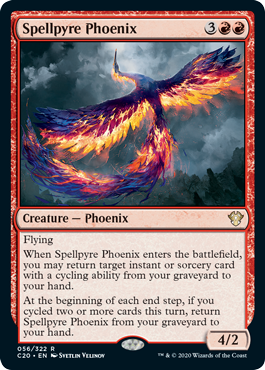
Spellpyre Phoenix
{3}{R}{R}
Creature — Phoenix
4/2
Flying
When Spellpyre Phoenix enters the battlefield, you may return target instant or sorcery card with a cycling ability from your graveyard to your hand.
At the beginning of each end step, if you cycled two or more cards this turn, return Spellpyre Phoenix from your graveyard to your hand.
- Spellpyre Phoenix's last ability checks the entire turn. Cards you cycled before Spellpyre Phoenix was put into your graveyard count.
- If you somehow cycle a card, return it to your hand, and cycle it a second time in one turn, Spellpyre Phoenix's last ability counts each time you cycled it and returns to your hand.
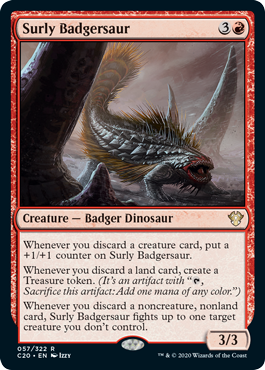
Surly Badgersaur
{3}{R}
Creature — Badger Dinosaur
3/3
Whenever you discard a creature card, put a +1/+1 counter on Surly Badgersaur.
Whenever you discard a land card, create a Treasure token. (It's an artifact with "{T}, Sacrifice this artifact: Add one mana of any color.")
Whenever you discard a noncreature, nonland card, Surly Badgersaur fights up to one target creature you don't control.
- Surly Badgersaur's abilities are triggered abilities, not activated abilities. They don't allow you to discard a card whenever you want; rather, you need some other way of discarding a card, such as a cycling ability.
- If you discard a card as a cost to cast a spell or activate an ability, Surly Badgersaur's triggered ability resolves before that spell or ability but after you've chosen targets for it. If you discard a card while a spell or ability is resolving, that spell or ability finishes resolving before Surly Badgersaur's triggered ability does.
- If the target creature is an illegal target when Surly Badgersaur's last ability tries to resolve, the ability doesn't resolve. If it's a legal target but Surly Badgersaur is no longer on the battlefield when the ability resolves, the target creature won't deal or be dealt damage.
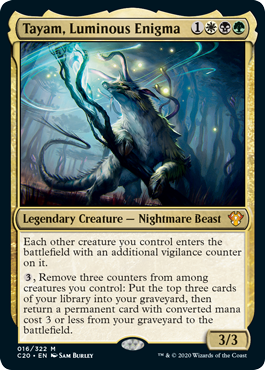
Tayam, Luminous Enigma
{1}{W}{B}{G}
Legendary Creature — Nightmare Beast
3/3
Each other creature you control enters the battlefield with an additional vigilance counter on it.
{3}, Remove three counters from among creatures you control: Put the top three cards of your library into your graveyard, then return a permanent card with converted mana cost 3 or less from your graveyard to the battlefield.
- You can remove any three counters to activate Tayam's last ability, not just vigilance counters.
- Because the activated ability doesn't target the permanent card in your graveyard, you may choose one of the three cards you put there from your library.
- If a card in your graveyard has {X} in its mana cost, X is considered to be 0.
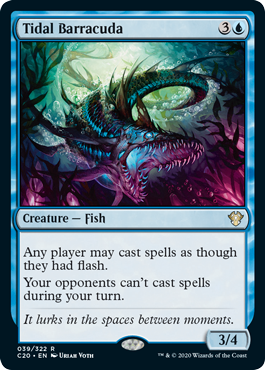
Tidal Barracuda
{3}{U}
Creature — Fish
3/4
Any player may cast spells as though they had flash.
Your opponents can't cast spells during your turn.
- Tidal Barracuda's abilities apply only while Tidal Barracuda is on the battlefield. Notably, its first ability doesn't apply to Tidal Barracuda as you're casting it.
- Tidal Barracuda's first ability doesn't grant flash to any objects. It just changes when spells can be cast.
- Once a player announces that they're casting a spell, players can't try to remove Tidal Barracuda to make it so that spell couldn't be cast at that time. Spells cast as though they had flash will still resolve if able, even if Tidal Barracuda is no longer on the battlefield at that time.
- Your opponents can still activate abilities during your turn.
- If an effect says that an opponent may cast a spell during your turn, Tidal Barracuda's restriction overrules that permission.
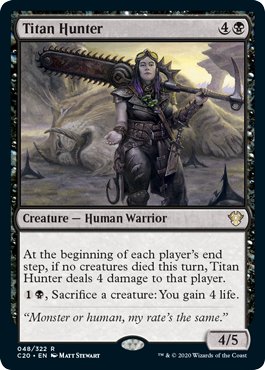
Titan Hunter
{4}{B}
Creature — Human Warrior
4/5
At the beginning of each player's end step, if no creatures died this turn, Titan Hunter deals 4 damage to that player.
{1}{B}, Sacrifice a creature: You gain 4 life.
- Titan Hunter's triggered ability triggers at the beginning of each player's end step, including yours, if no creatures died during that turn.
- If a creature dies while Titan Hunter's triggered ability is on the stack, Titan Hunter won't deal damage to that player.
- You can sacrifice Titan Hunter to pay the cost of its activated ability.
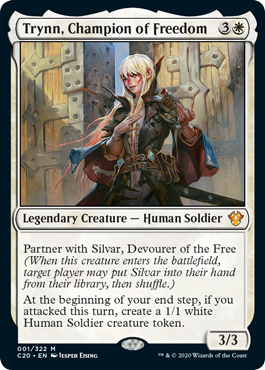
Trynn, Champion of Freedom
{3}{W}
Legendary Creature — Human Soldier
3/3
Partner with Silvar, Devourer of the Free (When this creature enters the battlefield, target player may put Silvar into their hand from their library, then shuffle.)
At the beginning of your end step, if you attacked this turn, create a 1/1 white Human Soldier creature token.
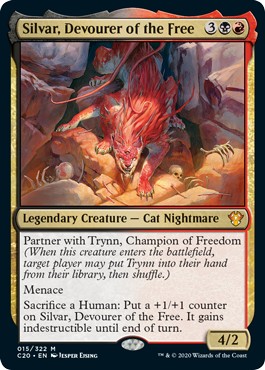
Silvar, Devourer of the Free
{3}{B}{R}
Legendary Creature — Cat Nightmare
4/2
Partner with Trynn, Champion of Freedom (When this creature enters the battlefield, target player may put Trynn into their hand from their library, then shuffle.)
Menace
Sacrifice a Human: Put a +1/+1 counter on Silvar, Devourer of the Free. It gains indestructible until end of turn.
- Trynn's ability checks only whether you declared an attacking creature during the turn. It doesn't trigger once for each such creature, and it doesn't check whether any attacking creatures dealt damage.
- You can activate Silvar's last ability even if it already has indestructible. It'll still get a +1/+1 counter.
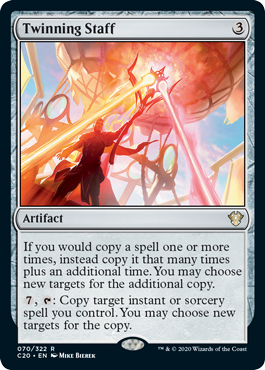
Twinning Staff
{3}
Artifact
If you would copy a spell one or more times, instead copy it that many times plus an additional time. You may choose new targets for the additional copy.
{7}, {T}: Copy target instant or sorcery spell you control. You may choose new targets for the copy.
- You may choose new targets for the additional copy, even if you can't choose new targets for the original copy or copies.
- You choose whether the additional copy is put onto the stack before or after the original copy. If a spell is being copied more than once, you can even have the additional copy put onto the stack in between the original copies.
- If you have a second Twinning Staff, copying a spell results in two additional copies. If you have a third, you get three additional copies, and so on.
- If an effect copies a card rather than a spell (such as that of God-Eternal Kefnet), this doesn't cause an additional copy to be created.
- Twinning Staff's last ability can copy any instant or sorcery spell you control, not just one with targets.
- The copy is created on the stack, so it's not "cast." Abilities that trigger when a player casts a spell won't trigger. It will resolve before the original spell does.
- The copy will have the same targets as the spell it's copying unless you choose new ones. You may change any number of the targets, including all of them or none of them. If, for one of the targets, you can't choose a new legal target, then it remains unchanged (even if the current target is illegal).
- If the spell that's copied is modal (that is, it says "Choose one —" or the like), the copy will have the same mode. A different mode can't be chosen.
- If the spell that's copied has an X whose value was determined as it was cast, the copy will have the same value of X.
- If the spell has damage divided as it was cast (like Mythos of Vadrok), the division can't be changed, although the targets receiving that damage still can. The same is true of spells that distribute counters.
- The controller of a copy can't choose to pay any alternative or additional costs for the copy. However, effects based on any alternative or additional costs that were paid for the original spell are copied as though those same costs were paid for the copy.
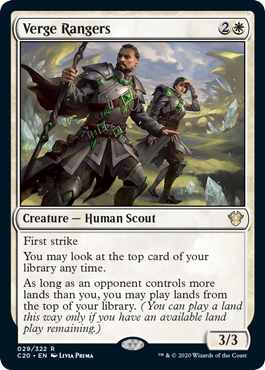
Verge Rangers
{2}{W}
Creature — Human Scout
3/3
First strike
You may look at the top card of your library any time.
As long as an opponent controls more lands than you, you may play lands from the top of your library. (You can play a land this way only if you have an available land play remaining.)
- Verge Rangers doesn't allow you to play additional lands.
- Verge Rangers lets you look at the top card of your library whenever you want (with one restriction; see below), even if you don't have priority. This action doesn't use the stack. Knowing what that card is becomes part of the information you have access to, just like you can look at the cards in your hand.
- If the top card of your library changes while you're casting a spell, playing a land, or activating an ability, you can't look at the new top card until you finish doing so. This means that if you play a land from the top of your library and it has a replacement effect that requires you to make a decision (such as that of Temple Garden), you must make that decision without knowing the next card of your library.
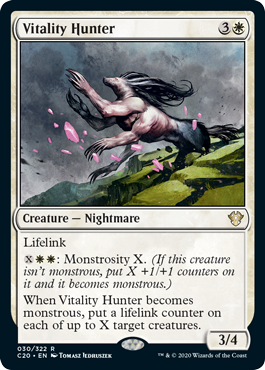
Vitality Hunter
{3}{W}
Creature — Nightmare
3/4
Lifelink
{X}{W}{W}: Monstrosity X. (If this creature isn't monstrous, put X +1/+1 counters on it and it becomes monstrous.)
When Vitality Hunter becomes monstrous, put a lifelink counter on each of up to X target creatures.
- Once a creature becomes monstrous, it can't become monstrous again. If the creature is already monstrous when the monstrosity ability resolves, nothing happens.
- Monstrous isn't an ability that a creature has. It's just something true about that creature. If the creature stops being a creature, loses its abilities, or loses its +1/+1 counters, it will continue to be monstrous.
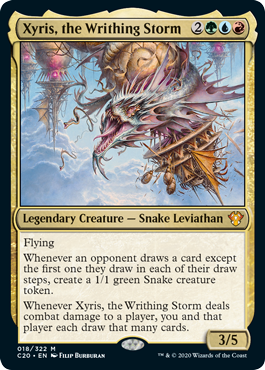
Xyris, the Writhing Storm
{2}{G}{U}{R}
Legendary Creature — Snake Leviathan
3/5
Flying
Whenever an opponent draws a card except the first one they draw in each of their draw steps, create a 1/1 green Snake creature token.
Whenever Xyris, the Writhing Storm deals combat damage to a player, you and that player each draw that many cards.
- If a spell or ability causes an opponent to put cards into their hand without specifically using the word "draw," it's not a card drawn.
- If the amount of damage Xyris deals is greater than the number of cards in your library but causes the defending player's life total to become 0 or less, that player loses the game before Xyris's ability causes you to draw cards. If there are no other players left in the game, you win the game.
- If the amount of damage Xyris deals is greater than the number of cards in your library and the number of cards in that player's library, you both lose the game at the same time. It doesn't matter if one of you had more cards in library than the other. If there are no other players left in the game, the game is a draw.
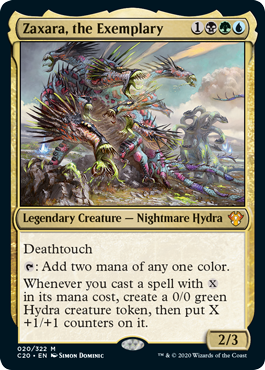
Zaxara, the Exemplary
{1}{B}{G}{U}
Legendary Creature — Nightmare Hydra
2/3
Deathtouch
{T}: Add two mana of any one color.
Whenever you cast a spell with {X} in its mana cost, create a 0/0 green Hydra creature token, then put X +1/+1 counters on it.
- The value of X in Zaxara's last ability is the value of X of the spell you cast.
- If the spell you cast has {X}{X} in its mana cost, the token gets only X counters, not twice X.
- The Hydra token enters the battlefield as a 0/0 creature. Any abilities that modify or trigger on this event apply. After the token is on the battlefield but before any player can take actions, +1/+1 counters are put onto the token.
- If X is 0, the 0/0 Hydra token will die immediately after the ability's done resolving unless something else is raising its toughness.
- If an effect, such as that of Doubling Season, causes Zaxara's ability to create multiple Hydra tokens, they each receive X +1/+1 counters.
Magic: The Gathering, Magic, Ikoria, Guilds of Ravnica, Ravnica Allegiance, War of the Spark, Throne of Eldraine, and Theros are trademarks of Wizards of the Coast LLC in the USA and other countries. ©2020 Wizards.
